TS LAWCET 2023 5 Years Urdu Question Paper with Answer Key pdf is available for download. The exam was conducted by Osmania University, Hyderabad on behalf of TSCHE on May 25, 2023 in Shift 3. The question paper comprised a total of 120 questions.
TS LAWCET 2023 5 Years Urdu Question Paper with Answer Key PDF
| TS LAWCET 2023 5 Years Urdu Question Paper with Answer Key | Check Solutions |

Question 1:
Who Invented the 3-D printer?
View Solution
Chuck Hull is credited with inventing the 3D printer. He developed the first 3D printer in 1983, which revolutionized manufacturing by allowing the creation of three-dimensional objects from digital designs.
Quick Tip: When studying Harappan culture, focus on the geographical and technological aspects, such as the location of sites and the tools used for agriculture.
Which Vitamin is responsible for blood clotting?
View Solution
Vitamin K is essential for blood clotting. It plays a crucial role in the synthesis of certain proteins required for blood coagulation, which is vital for wound healing.
Quick Tip: When studying vitamins, focus on their specific roles in bodily functions, such as Vitamin K for blood clotting.
Who established the 'Brahmo Samaj' reformist movement?
View Solution
Raja Ram Mohan Roy is regarded as the founder of the Brahmo Samaj, a reformist movement in India that advocated for social and religious reforms, including the abolition of Sati and the promotion of education.
Quick Tip: When studying social reform movements, pay attention to the key figures and their contributions to social change, such as Raja Ram Mohan Roy.
India celebrates 'Civil Services Day' to commemorate the address of which leader to the Administrative Service Officers?
View Solution
India celebrates Civil Services Day on April 21st every year to commemorate the address delivered by Sardar Vallabhbhai Patel to the newly appointed Administrative Service Officers in 1947. He is known as the 'Iron Man of India'.
Quick Tip: When studying India's national events, focus on the key figures who influenced the nation's development, such as Sardar Vallabhbhai Patel's role in shaping civil services.
In which State, the Indus International School introduced first Teaching Robot in India?
View Solution
The Indus International School in Telangana introduced the first teaching robot in India. The robot was integrated into the school's teaching system to assist in enhancing the learning experience.
Quick Tip: When studying educational innovations, focus on technological advancements that are transforming classrooms, such as the introduction of teaching robots.
Which State has the longest coastline in India?
View Solution
Gujarat has the longest coastline in India, stretching over 1,600 kilometers. The state's coastline is known for its vast beaches and ports, making it a major hub for maritime trade.
Quick Tip: When studying coastal geography, focus on states with extensive coastlines, such as Gujarat, which has India's longest coastline.
Quit India Movement started in the year ____
View Solution
The Quit India Movement, also known as the August Kranti, was launched by Mahatma Gandhi in 1942, demanding an end to British rule in India. It marked a significant turning point in India's struggle for independence.
Quick Tip: When studying the independence movement, focus on key movements like Quit India that played a major role in ending colonial rule.
Where is Guindy National Park located?
View Solution
Guindy National Park is located in Tamil Nadu, near Chennai. It is one of the smallest national parks in India but is home to a variety of flora and fauna.
Quick Tip: When studying national parks, focus on their location, size, and biodiversity. Tamil Nadu is home to several important parks like Guindy National Park.
Which of the following rivers has Musi River as one of its tributaries?
View Solution
The Musi River is a tributary of the Krishna River. The Krishna River flows through the Indian states of Maharashtra, Karnataka, and Andhra Pradesh.
Quick Tip: Focus on major rivers and their tributaries, as understanding their course and tributaries is important for geography.
Hirakud Dam is located in ____ State.
View Solution
Hirakud Dam is located in the state of Odisha. It is one of the longest earthen dams in the world and plays a major role in irrigation and flood control.
Quick Tip: When studying major dams, focus on their location, construction, and purpose. Hirakud is an important dam in Odisha.
Who discovered bacteria?
View Solution
Antonie van Leeuwenhoek is credited with the discovery of bacteria. He used a microscope to observe tiny organisms, which he called "animalcules."
Quick Tip: When studying the history of microbiology, focus on key pioneers like Antonie van Leeuwenhoek, who developed the microscope and discovered bacteria.
How many goals are there in the Sustainable Development Goals (SDGs) adopted by the UN?
View Solution
There are 17 Sustainable Development Goals (SDGs) adopted by the United Nations. These goals aim to address global challenges and achieve a better and more sustainable future for all.
Quick Tip: When studying SDGs, focus on their goals related to poverty, education, climate action, and other global issues.
Gibraltar straits connects which of the following?
View Solution
The Gibraltar Strait connects the Atlantic Ocean to the Mediterranean Sea, providing a key maritime route between Europe and Africa.
Quick Tip: When studying straits and waterways, remember their strategic significance in global trade, such as the Gibraltar Strait's connection between the Atlantic and Mediterranean seas.
Who was known as Martin Luther of India?
View Solution
Swami Dayanand Saraswati was known as the Martin Luther of India for his efforts to reform Hinduism and promote social and religious reforms. He founded the Arya Samaj, which played an important role in India's renaissance.
Quick Tip: When studying Indian reformers, focus on their role in social and religious reforms. Swami Dayanand's contributions were pivotal in transforming Hindu society.
BHIM full form is ____ .
View Solution
BHIM stands for Bharat Interface for Money, a UPI-based mobile payment application developed by the Government of India to enable fast and secure transactions.
Quick Tip: When studying digital payment systems, focus on key apps like BHIM, which facilitates easy financial transactions using UPI technology.
Who among the following renounced his Knighthood following the Jallianwala Bagh massacre?
View Solution
Rabindranath Tagore renounced his Knighthood in protest against the Jallianwala Bagh massacre of 1919. His decision was a significant expression of dissent against British colonial rule.
Quick Tip: When studying Indian history, focus on important figures like Rabindranath Tagore, who took strong stands for India's freedom and dignity.
The Actor to win the first-ever film fare award in the category of best actor for the film Daag is
View Solution
Dilip Kumar was the first actor to win the Filmfare Award for Best Actor for his performance in the movie *Daag* in 1953.
Quick Tip: When studying the history of Indian cinema, focus on key awards like Filmfare and the actors who set benchmarks in various categories.
Daily a human being must consume less than ____ grams of salt?
View Solution
Health guidelines recommend that a human being should consume less than 5 grams of salt per day to maintain proper health and reduce the risk of hypertension and heart disease.
Quick Tip: When studying nutrition, focus on the recommended daily intake of key nutrients like salt to promote better health.
What is the theme of the ‘World Environment Day 2022’?
View Solution
The theme for World Environment Day 2022 was "Only One Earth," emphasizing the need for a shift toward more sustainable living in harmony with nature.
Quick Tip: When studying global observances like World Environment Day, focus on the theme for the year and its relevance to current environmental challenges.
Which day is celebrated as World Health Day?
View Solution
World Health Day is celebrated annually on April 7th. The day is observed by the World Health Organization (WHO) to raise awareness about global health issues.
Quick Tip: When studying health observances, focus on global events like World Health Day and their themes.
If 2nd day of a month is Sunday, then what day will it be on the 31st of the same month?
View Solution
If the 2nd of the month is Sunday, then the 31st will fall on a Monday. This can be calculated by counting the days of the week from the 2nd to the 31st.
Quick Tip: When solving calendar-related problems, always count the days correctly and consider the number of days in each month.
In a certain code, MONKEY is written as XDJMNL. How is TIGER written in that code?
View Solution
The code shifts each letter of the word by one position forward. For example, "M" becomes "X", "O" becomes "D", etc. Following the same pattern for TIGER gives "QDFHS".
Quick Tip: When solving coding and decoding problems, identify the pattern in letter shifts and apply it consistently.
If Z = 52 and ACT = 48, then BAT =
View Solution
The pattern for each letter can be calculated based on the given values for Z and ACT. By solving the equation, we get the value for BAT as 46.
Quick Tip: When solving coding problems, try to find patterns in the numbers associated with the letters to help solve the equation efficiently.
Grass : Erosion :: Dam : ?
View Solution
Erosion is a process caused by natural elements like wind or water, and a dam is built to control the flow of water. Thus, the relationship is between grass and erosion, and a dam and water.
Quick Tip: When solving analogies, focus on the relationship between the two words on the left side and apply it logically to the words on the right side.
A clock is set right at 05:00 A.M. The clock loses 16 minutes in 24 hours. What will be the true time when the clock indicates 10:00 P.M. on the fourth day?
View Solution
The clock loses 16 minutes every 24 hours. In 4 days, it will have lost 64 minutes. Therefore, when the clock shows 10:00 P.M., the actual time will be 11:00 P.M.
Quick Tip: When solving time-related problems, calculate the total loss or gain over a given period to determine the actual time.
A and B are married couple, A being the male member. D is the only son of C, who is the brother of A. E is the sister of D, B is the daughter-in-law of F, whose husband has died. How is E related to C?
\textbf{Solution:}
E is the sister of D, who is the son of C, hence E is C’s daughter.
View Solution
E is the sister of D, who is the son of C, hence E is C’s daughter.
Quick Tip: For family relation puzzles, focus on understanding the relationships and flow of connections. Trace each family member's relation one step at a time.
A woman introduces a man as the son of the brother of her mother. How is the man related to the woman?
\textbf{Solution:}
The brother of her mother is the woman's maternal uncle, and his son is the woman's nephew.
View Solution
The brother of her mother is the woman's maternal uncle, and his son is the woman's nephew.
Quick Tip: When dealing with relationship puzzles, focus on tracing the lineage through siblings, uncles, and cousins to figure out the correct relation.
Find the odd one out: Veranda, Cabin, Room, Chamber
\textbf{Solution:}
Veranda is an outdoor space, whereas Cabin, Room, and Chamber are enclosed indoor spaces.
View Solution
Veranda is an outdoor space, whereas Cabin, Room, and Chamber are enclosed indoor spaces.
Quick Tip: For odd-one-out problems, focus on categorizing the objects based on their characteristics to identify the different one.
Your mother is 4 years younger than your father. Your father is 6 times older than you. If you are 6 years old, what is your mother's age?
\textbf{Solution:}
Given: - Your age = 6 years - Your father's age = 6 times your age = \( 6 \times 6 = 36 \) years. - Your mother is 4 years younger than your father, so your mother's age = \( 36 - 4 = 32 \) years.
Thus, your mother's age is 32 years.
View Solution
Given:
- Your age = 6 years
- Your father's age = 6 times your age = \( 6 \times 6 = 36 \) years.
- Your mother is 4 years younger than your father, so your mother's age = \( 36 - 4 = 32 \) years.
Thus, your mother's age is 32 years. Quick Tip: When dealing with age-related problems, set up equations based on relationships and use the known values to solve.
Find the next letters in the given series.
JAK, KBL, LCM, MDN, ?
\textbf{Solution:}
The series follows a pattern where each subsequent letter is incremented by one in alphabetical order: - First letters: J, K, L, M, N - Second letters: A, B, C, D, E - Third letters: K, L, M, N, O
Thus, the next group is NEO.
View Solution
The series follows a pattern where each subsequent letter is incremented by one in alphabetical order:
- First letters: J, K, L, M, N
- Second letters: A, B, C, D, E
- Third letters: K, L, M, N, O
Thus, the next group is NEO. Quick Tip: For letter series, check the individual letter patterns in each position (first, second, third) to identify the sequence.
The RBI has recently announced withdrawal of the Rs.2000 denomination banknotes from circulation, and allowed deposit or exchange of the Rs.2000 notes at Banks until _____.
View Solution
The Reserve Bank of India (RBI) announced the withdrawal of Rs.2000 denomination banknotes and allowed people to exchange or deposit these notes at banks until 30th September, 2023.
Quick Tip: The RBI's decision allows for a specific period to deposit or exchange Rs.2000 notes. Keep track of deadlines to avoid inconvenience.
Which institution released the ‘Landslide Atlas of India’?
View Solution
The Landslide Atlas of India was released by ISRO, which provides comprehensive data and mapping on landslides across India to help mitigate risks and enhance safety.
Quick Tip: Understanding geographical and environmental risks is crucial. Always check for updated reports and safety guidelines.
Sanmanara, also known as the ‘Hockey Village’, is located in which State?
View Solution
Sanmanara, also referred to as the 'Hockey Village', is located in the state of Odisha, which has a rich tradition in the sport of hockey.
Quick Tip: Odisha is known for its contribution to hockey, with numerous talented players emerging from this region.
Recently, due to non-payment of salaries nearly 100 pilots reported sick in which airline?
View Solution
Recently, due to the non-payment of salaries, nearly 100 pilots from Alliance Air reported sick. This situation arose due to financial difficulties faced by the airline, which led to this large number of pilots taking sick leave.
Quick Tip: When studying current affairs, focus on news related to major companies and airlines to understand the impact of economic situations on operations.
‘Safe Harbour Principle’ is associated with which Act?
View Solution
The Safe Harbour Principle is related to the Information Technology Act, 2000, specifically concerning the liability of intermediaries for third-party content on their platforms. This principle provides immunity from legal responsibility to intermediaries under certain conditions.
Quick Tip: When studying legal terms, focus on their application to specific acts and their interpretations by courts and authorities.
T-Hub (Technology Hub) is an innovation intermediary and business incubator based in which State?
View Solution
T-Hub, an innovation intermediary and business incubator, is based in Telangana. It is one of the largest hubs for tech startups in India and plays a key role in fostering innovation and entrepreneurship.
Quick Tip: When studying technological hubs, focus on their geographical and infrastructural importance for innovation ecosystems.
Which institution introduced the ‘Global Greenhouse Gas Monitoring Infrastructure’?
View Solution
The World Meteorological Organization (WMO) introduced the Global Greenhouse Gas Monitoring Infrastructure. This initiative aims to enhance the monitoring and reporting of greenhouse gas emissions globally to combat climate change.
Quick Tip: When studying global environmental issues, focus on the organizations involved in climate monitoring and international agreements.
Who became the first Tennis player to win 80 matches in all 4 Grand Slams?
View Solution
Novak Djokovic became the first Tennis player to win 80 matches in all four Grand Slams, showcasing his dominance in tennis over the years.
Quick Tip: When studying achievements in sports, focus on records in major tournaments like the Grand Slams.
Shri C R Rao, a well-known Indian and American mathematician and statistician, was awarded with International Prize in Statistics which is equal to Nobel Prize. He is at present ____ years old?
View Solution
Shri C R Rao, a renowned mathematician, is currently 99 years old. His contributions to statistics have been internationally recognized, with awards akin to the Nobel Prize.
Quick Tip: When studying notable personalities, focus on their achievements and milestones in their respective fields.
Which institution launched its Right to Information (RTI) online portal?
View Solution
The Election Commission of India launched its Right to Information (RTI) online portal to promote transparency and accountability. This portal allows citizens to easily access information related to the election process and other public matters.
Quick Tip: When studying government initiatives, focus on online transparency portals like RTI for enhancing civic engagement.
Which organisation released the 'Women, Business and the Law Index'?
View Solution
The World Bank released the "Women, Business and the Law Index," which assesses the legal and regulatory frameworks that affect women's entrepreneurship and employment in economies across the world.
Quick Tip: Focus on global reports and indices like the "Women, Business and the Law Index" to understand the socio-economic factors influencing gender equality in business.
Which city corporation launched the World Bank's Flagship Gender Toolkit?
View Solution
Chennai launched the World Bank's Flagship Gender Toolkit, aiming to promote gender equality through various initiatives within the city's corporation framework. The toolkit helps in the integration of gender-sensitive approaches into urban planning and governance.
Quick Tip: Focus on city-level gender initiatives and programs for understanding local governance and gender policies.
Which Union Ministry is set to host the 'World Food India 2023' event?
View Solution
The Ministry of Food Processing Industries is set to host the 'World Food India 2023' event. This event aims to showcase India as a global hub for food processing and agriculture industries.
Quick Tip: Pay attention to major national and international events hosted by ministries, especially those focused on food and agriculture, to understand India's economic initiatives.
Who laid the foundation stone for the National Forensic Sciences University?
View Solution
Shri Amit Shah, the Union Home Minister of India, laid the foundation stone for the National Forensic Sciences University. This step reflects the government's focus on strengthening forensic education and criminal investigation infrastructure in the country.
Quick Tip: Keep an eye on key infrastructural and educational developments initiated by high-profile ministers, especially in specialized fields like forensic sciences.
Which company has initiated 'Project ELLORA' to promote local languages in India's Digital world?
View Solution
Microsoft launched 'Project ELLORA' to encourage the development and inclusion of local Indian languages in the digital ecosystem. The initiative supports the preservation and digital accessibility of regional languages.
Quick Tip: Projects by tech giants like Microsoft often aim to enhance digital inclusivity—keep an eye on such initiatives for current affairs.
In which city did Prime Minister Shri Narendra Modi inaugurate the Arabic Academy?
View Solution
Prime Minister Shri Narendra Modi inaugurated the Arabic Academy in Mumbai, Maharashtra. The academy aims to foster cultural education and language learning in Arabic.
Quick Tip: Be aware of the cities where major educational or cultural institutes are inaugurated by dignitaries—it’s a common question type in exams.
Which country's first underground Air Force Base is Eagle 44 (Oghab 44)?
View Solution
Iran unveiled its first underground Air Force Base named Eagle 44 (Oghab 44). This facility is designed for enhanced defense and rapid deployment capabilities, making it a strategic military development.
Quick Tip: Defense infrastructure and strategic bases like Eagle 44 are important topics under international current affairs.
Which country has launched pilot project called ‘Welcome Corps’ for refugees?
View Solution
The United States launched the 'Welcome Corps' pilot project to allow private individuals to sponsor and support refugees arriving in the country. It is a significant move to expand resettlement through community participation.
Quick Tip: Keep track of humanitarian programs by developed nations, especially those involving refugee support and immigration reforms.
Which of the following became the first Indian Union Territory to completely shift to e-governance mode?
View Solution
Jammu & Kashmir became the first Indian Union Territory to transition completely to e-governance mode. This digital initiative aims to enhance transparency, efficiency, and accessibility in public administration.
Quick Tip: Watch for digital transformation milestones in Indian states and union territories—these are frequently asked in current affairs exams.
US Food and Drug Administration (FDA) has approved ‘Lecanemab’ medication to treat which disease?
View Solution
The FDA has approved ‘Lecanemab’, a medication developed to slow the progression of Alzheimer’s disease. It is one of the few drugs specifically targeting the underlying cause of Alzheimer’s rather than just managing symptoms.
Quick Tip: New drug approvals by FDA, especially for chronic or major diseases, are vital updates in health-related current affairs.
Which country launched the domestic card scheme AfriGo to boost its cashless economy?
View Solution
Nigeria launched the AfriGo domestic card scheme to promote digital payments and enhance its cashless economy. This move supports financial inclusion and reduces dependence on foreign card networks.
Quick Tip: Note initiatives from African nations focusing on fintech and digital economy—these often feature in international development questions.
Which State Government has passed the Bill providing 30% horizontal reservation to domiciled women of the State?
View Solution
The Uttarakhand state government passed a bill that provides 30% horizontal reservation to domiciled women in public services. This move aims to improve female participation in state jobs and governance.
Quick Tip: Horizontal reservations in state policies are significant for understanding state-level affirmative actions, especially those favoring women or minorities.
National Cadet Corps (NCC) signed MoU with which institution to tackle the issue of plastic pollution?
View Solution
The National Cadet Corps (NCC) signed an MoU with UNEP to combat plastic pollution. This collaboration emphasizes environmental awareness and youth participation in sustainability initiatives.
Quick Tip: MoUs between Indian institutions and international organizations often aim at addressing global concerns like pollution, health, or education—remember the key partner organization.
As per Central Pollution Control Board (CPCB) data, which city was the most polluted place in India in 2022?
View Solution
According to the Central Pollution Control Board (CPCB) data for 2022, New Delhi ranked as the most polluted city in India. The capital consistently records high levels of air pollutants, especially PM2.5 and PM10.
Quick Tip: Always track annual CPCB reports and rankings of cities based on air quality—frequent questions in environment-related current affairs.
Which of the following teams has won Women’s Premier League (WPL) 2023 final?
View Solution
Mumbai Indians emerged as the champions of the inaugural Women’s Premier League (WPL) 2023, defeating Delhi Capitals in the final match.
Quick Tip: Remember key outcomes of major sporting events, especially finals and winners of new leagues like WPL.
Which country signed a deal with India to relocate dozens of Cheetahs?
View Solution
India signed an agreement with South Africa to relocate dozens of cheetahs to its wildlife sanctuaries as part of a conservation program to revive the species on Indian soil.
Quick Tip: Bilateral agreements on wildlife conservation are key for environment-related current affairs, especially involving species reintroduction.
Which country's population has dropped by 850,000, declining for the first time since the Great Famine of 1961?
View Solution
China's population decreased by approximately 850,000, marking its first decline since the Great Famine of 1961. This drop is attributed to a declining birth rate and an aging population despite government efforts to encourage childbirth.
Quick Tip: Demographic changes in large countries like China are frequently covered in global current affairs—keep an eye on population trends and policy responses.
Which institution declares ‘Domestic Systemically Important Banks (D-SIBs)’ in India?
View Solution
The Reserve Bank of India (RBI) designates banks as ‘Domestic Systemically Important Banks (D-SIBs)’. These banks are considered ‘too big to fail’, and their functioning is closely monitored to prevent systemic risks in the financial sector.
Quick Tip: Know the roles of financial regulators like RBI, SEBI, and others, especially when it comes to declaring institutions critical to financial stability.
The World Economic Forum (WEF) has chosen which city for establishing its Centre for the Fourth Industrial Revolution?
View Solution
The World Economic Forum (WEF) selected Hyderabad to establish its Centre for the Fourth Industrial Revolution (C4IR). The city is seen as a major hub for innovation, technology, and digital transformation.
Quick Tip: Pay attention to global institutions choosing Indian cities for major hubs—this highlights India’s role in global tech and policy leadership.
Which District in India has become the country’s first Constitution literate district?
View Solution
Kollam district in Kerala became the first Constitution literate district in India. This initiative aimed at enhancing public awareness about the Indian Constitution, fundamental rights, and duties among citizens.
Quick Tip: Initiatives promoting constitutional literacy are key milestones in civic education—watch for such pioneering districts or states in India.
Which Constitutional Amendment discontinued the nomination of two Anglo-Indian members to Lok Sabha?
View Solution
The 104th Constitutional Amendment Act, 2019 discontinued the provision of nominating two Anglo-Indian members to the Lok Sabha and State Legislative Assemblies. It also extended the reservation of seats for SCs and STs for another 10 years.
Quick Tip: Keep track of major constitutional amendments and their key provisions—they're highly relevant for polity-related questions.
Which of the following High Courts exercises jurisdiction over the Union territory of Andaman and Nicobar Islands?
View Solution
The Calcutta High Court exercises jurisdiction over the Union Territory of Andaman and Nicobar Islands. This is based on administrative convenience and territorial jurisdiction rules.
Quick Tip: Jurisdictions of High Courts over Union Territories are frequently tested in exams—focus on UTs with no separate high court.
Absolute liability means _________.
View Solution
Absolute liability means that a person or company is held liable for damages caused by their actions or products, regardless of fault or intent. It is a stricter version of strict liability, often applied in cases involving hazardous activities.
Quick Tip: Understand the distinctions between strict liability, absolute liability, and criminal liability—frequently tested in legal and reasoning sections.
NALSA vs. Union of India 2014, case is related to ______.
View Solution
In the landmark 2014 judgment in NALSA vs. Union of India, the Supreme Court recognized transgender individuals as the ‘third gender’ under the Constitution. The Court affirmed their fundamental rights and directed the government to take measures for their welfare and inclusion.
Quick Tip: Memorize landmark Supreme Court cases and their social justice implications—especially those involving gender, equality, and human rights.
Who was the First Woman Judge of the Supreme Court of India?
View Solution
Justice M. Fathima Beevi became the first woman judge of the Supreme Court of India in 1989. Her appointment was a historic milestone in Indian judicial history, breaking gender barriers in the highest court.
Quick Tip: Firsts in Indian judiciary are popular topics—especially related to gender, landmark appointments, and reforms.
Which article of the Indian Constitution deals with the Right to Protection against Arrest and Detention in certain cases?
View Solution
Article 22 of the Indian Constitution provides protection against arbitrary arrest and detention. It guarantees rights such as being informed of the grounds of arrest, legal representation, and timely production before a magistrate.
Quick Tip: Fundamental Rights under Articles 20–22 are key for legal and constitutional awareness—focus on rights related to personal liberty and arrest.
In cognizable offences _______.
View Solution
In cognizable offences, a police officer has the authority to register an FIR and arrest the accused without prior approval or a warrant from a magistrate. These offences are generally more serious in nature such as murder, rape, etc.
Quick Tip: Know the distinction between cognizable and non-cognizable offences—it’s crucial in criminal procedure law.
‘In camera proceedings’ in a court refers to _______.
View Solution
‘In camera proceedings’ are conducted privately without the presence of the public or press. These are typically used in sensitive cases like sexual assault, to protect the identity and privacy of victims.
Quick Tip: Look out for Latin legal terms like ‘in camera’, ‘habeas corpus’, and ‘amicus curiae’—they’re commonly asked in legal reasoning.
Extradition means _______.
View Solution
Extradition refers to the formal process by which one country surrenders a suspected or convicted criminal to another country upon request. This is done under the framework of a bilateral treaty or mutual agreement.
Quick Tip: Understand international legal concepts like extradition—they’re vital in global crime and justice questions.
A writ by court, to a person or body of persons to compel it to perform some public duty is ______.
View Solution
The writ of Mandamus is issued by a court to a public authority or body directing it to perform a public duty it has failed to fulfill. It ensures that governmental responsibilities are not neglected.
Quick Tip: Remember the five types of writs in the Indian Constitution—Mandamus, Habeas Corpus, Certiorari, Prohibition, and Quo Warranto.
‘In lieu’ means ______.
View Solution
The phrase “in lieu” means “in place of” or “instead of”. It is commonly used to indicate substitution or replacement.
Quick Tip: Learn legal and formal English phrases like “in lieu”, “inter alia”, and “bona fide” as they often appear in legal and competitive exams.
Who can file an election petition in India?
View Solution
Under the Representation of the People Act, 1951, both an elector and a candidate can file an election petition to the High Court if they believe malpractice or irregularities occurred during the election process.
Quick Tip: Know the eligibility and process for filing election petitions under the Representation of the People Act—it’s a frequently tested topic.
Entry to a person’s land or property without permission is called ______.
View Solution
Trespass is a legal term for the unauthorized entry onto another person’s property. It is a civil wrong and may also be treated as a criminal offense depending on the jurisdiction.
Quick Tip: Remember: Trespass = Unauthorized Entry. It doesn’t require physical damage to be actionable in civil law.
Who is the ex-officio Chairman of the Rajya Sabha?
View Solution
As per the Constitution of India, the Vice President is the ex-officio Chairman of the Rajya Sabha. This means he presides over its proceedings but does not have a vote unless there is a tie.
Quick Tip: Vice President = Rajya Sabha Chairman (ex-officio). Speaker of Lok Sabha heads only the lower house.
Donoghue vs Stevenson case relates to ______.
View Solution
The famous Donoghue vs Stevenson (1932) case laid down the modern law of negligence, establishing the principle that a manufacturer owes a duty of care to the ultimate consumer.
Quick Tip: “Neighbour principle” was born from Donoghue v. Stevenson—essential for understanding the duty of care in tort law.
The Governor General who is known as 'The Liberator of The Press' is
View Solution
Charles Metcalfe, as the Governor General of India, is referred to as the 'Liberator of The Press' for his efforts in removing restrictions on the Indian press. He repealed the press regulations imposed by the British, thus earning this title.
Quick Tip: Remember that Charles Metcalfe's role in the history of press freedom is significant, particularly in the context of early 19th-century India.
Who among the following is the author of the book 'Off the Bench'?
View Solution
Justice V. R. Krishna Iyer, a renowned jurist, authored the book 'Off the Bench,' which offers his reflections and experiences on his time as a judge.
Quick Tip: When studying books by notable jurists, focus on their contributions to judicial reforms and perspectives on legal matters.
Who is the custodian of the Constitution of India?
View Solution
The Supreme Court of India is the custodian of the Constitution. It has the responsibility to protect and uphold the Constitution, ensuring that laws and actions conform to it.
Quick Tip: Always remember that the Supreme Court is the final interpreter of the Constitution and plays a critical role in safeguarding fundamental rights.
Which of the following is not a fundamental duty of a citizen of India?
View Solution
While paying income tax is a legal obligation, it is not listed as a fundamental duty in the Indian Constitution. The fundamental duties pertain to moral obligations towards the nation.
Quick Tip: Focus on the specific duties outlined in Article 51A of the Constitution to differentiate between legal obligations and fundamental duties.
Who among the following presided over the first meeting of the Constituent Assembly?
View Solution
Dr. Sachidananda Sinha presided over the first meeting of the Constituent Assembly of India on 9th December 1946. He was elected as the temporary president until Dr. Rajendra Prasad was later chosen as the permanent president.
Quick Tip: Focus on the key historical events in the formation of the Indian Constitution and the role of prominent figures in it.
The oldest High Court in India is ____ .
View Solution
The Calcutta High Court, established in 1862, is the oldest high court in India. It was the first to be established under the Indian High Courts Act of 1861.
Quick Tip: Remember that Calcutta High Court holds the distinction of being the oldest, and its historical importance is tied to British colonial rule and the Indian judiciary system's development.
The 'Electoral College' for the election of the President of India consists of ____ .
View Solution
The Electoral College for the election of the President of India includes elected members of the Lok Sabha, Rajya Sabha, and the Legislative Assemblies of all States and Union Territories. Nominated members are not part of the Electoral College.
Quick Tip: Focus on the composition of the Electoral College and the specific members involved in the process of electing the President of India.
The Estimates Committee of the Indian Parliament comprises of ____ members.
View Solution
The Estimates Committee of the Indian Parliament consists of 25 members, who are elected by the members of the Lok Sabha from among themselves.
Quick Tip: The Estimates Committee plays an important role in scrutinizing government expenditure. Remember its composition and functions when studying Parliamentary procedures.
The boundary line between India and China is known as ____ .
View Solution
The boundary line between India and China is known as the Mc Mohan Line. This line was drawn during the 1914 Shimla Agreement between British India and Tibet, which China did not agree to.
Quick Tip: Focus on the history of boundary agreements in India, particularly the Mc Mohan Line, when studying India's relations with China.
Arun instigates Balu to murder Kumar. Balu refuses to do so. Arun is guilty of ____ .
View Solution
Arun is guilty of abetment as he instigated Balu to commit murder, even though Balu refused. Abetment involves encouraging, aiding, or inciting someone to commit a crime.
Quick Tip: When studying criminal law, focus on the definitions of different crimes like abetment and culpable homicide, and understand their distinctions.
Minimum age required to contest for office of President is ____ .
View Solution
According to Article 58 of the Indian Constitution, the minimum age required for a person to contest for the office of the President of India is 35 years.
Quick Tip: Always remember the age criteria for various offices, especially when studying Indian political structure.
In case of vacancy of office of both the President and Vice President of India, who shall act as the President of India?
View Solution
In the event of a vacancy in both the offices of the President and Vice President, the Chief Justice of India acts as the President of India until a new President is elected. This is outlined in the Constitution of India.
Quick Tip: Understand the succession protocol for the highest offices in India, especially in cases of vacancies.
Double jeopardy means ____ .
View Solution
Double jeopardy is a legal principle that prevents an individual from being tried or punished twice for the same offense. This is enshrined in Article 20 of the Indian Constitution, which protects citizens from such legal actions.
Quick Tip: When studying criminal law, focus on important legal protections like double jeopardy and how they protect individual rights.
Who was the First Chief Information Commissioner of India?
View Solution
Wajahat Habibullah was the first Chief Information Commissioner of India, appointed in 2005 after the Right to Information (RTI) Act came into force.
Quick Tip: Focus on the milestones in the implementation of the RTI Act and the key figures associated with its success.
De novo means ____ .
View Solution
"De novo" is a Latin term that means "from the beginning" or "new." It is commonly used in legal contexts to refer to a fresh or new review or trial.
Quick Tip: When you come across Latin terms like "de novo," try to understand their usage in legal or scientific contexts.
Which of the following bodies is not set up under the Constitution of India?
View Solution
The National Human Rights Commission (NHRC) is not set up under the Constitution of India. It was created by an Act of Parliament, i.e., the Protection of Human Rights Act, 1993.
Quick Tip: Always distinguish between constitutional bodies and statutory bodies in Indian governance. Constitutional bodies are directly mentioned in the Constitution.
What is the maximum duration of a Money Bill in the Rajya Sabha?
View Solution
The maximum duration for the Rajya Sabha to consider a Money Bill is 14 days. However, if the bill is not returned within that time, it is deemed to have been passed.
Quick Tip: Remember that Money Bills can only be introduced in the Lok Sabha, and the Rajya Sabha cannot reject them. It can only delay them.
Who for the first time put forward the idea of constituent assembly for India in 1934?
View Solution
M N Roy, in 1934, for the first time, put forward the idea of a constituent assembly for India to draft its constitution. This idea laid the foundation for the future formation of the Constituent Assembly in 1946.
Quick Tip: Focus on key historical figures and their contributions to India's freedom struggle and constitutional development.
Which Commission was appointed to investigate the circumstances that warranted the declaration of an Emergency in 1975?
View Solution
The Shah Commission was appointed by the government of India to investigate the circumstances leading to the Emergency declared in 1975. The commission was tasked with probing the actions taken during the Emergency period.
Quick Tip: When studying the Emergency, remember to focus on the role of key commissions like the Shah Commission and their findings.
A person who is not a member of Parliament can be appointed as a Minister by the President for a period of ____ .
View Solution
A person who is not a member of Parliament can be appointed as a Minister by the President for a period of 6 months. If the person does not get elected to the Parliament within this period, they will have to resign.
Quick Tip: Focus on the duration a person can be appointed as a Minister without being a member of Parliament and the implications if they fail to get elected within this period.
Fundamental Rights have been taken from ____ constitution.
View Solution
Fundamental Rights in the Indian Constitution have been taken from the American Constitution. The idea of a Bill of Rights was inspired by the U.S. Constitution, which ensures civil liberties.
Quick Tip: When studying the Indian Constitution, focus on the borrowed features from other countries' constitutions, such as the American model for Fundamental Rights.
The 44th Amendment Act of 1978 to the Constitution of India ____ .
View Solution
The 44th Amendment Act of 1978 removed the right to acquire, hold, and dispose of property as a Fundamental Right under the Constitution. It also added the right to free and compulsory education as a Directive Principle.
Quick Tip: Remember the changes made by the 44th Amendment, which significantly altered the scope of Fundamental Rights in India, especially in the context of property rights.
Who appoints the Attorney General of India?
View Solution
The Attorney General of India is appointed by the President of India under Article 76 of the Indian Constitution. The Attorney General is the chief legal advisor to the Government of India.
Quick Tip: The role of the Attorney General is crucial in advising the government on legal matters and representing it in the Supreme Court.
Which of the following is entrusted with a statutory duty of laying down the standards of professional conduct and etiquette for advocates in India?
View Solution
The Bar Council of India is responsible for laying down the standards of professional conduct and etiquette for advocates in India. It also regulates the legal profession and ensures discipline among advocates.
Quick Tip: The Bar Council of India plays a significant role in the governance of the legal profession in India. Remember its functions when studying Indian legal systems.
A person dying intestate means ____ .
View Solution
A person dying intestate refers to a person who has passed away without leaving behind a valid will. In such cases, the distribution of their property follows the rules set by law.
Quick Tip: Make sure to distinguish between the terms related to inheritance laws, like intestate (dying without a will) and testate (dying with a will).
Debenture holders of a company are the company's ____ .
View Solution
Debenture holders are creditors of a company. A debenture is a form of debt that a company issues to raise capital, and the holders of debentures are entitled to receive interest on their investment.
Quick Tip: Debenture holders are not owners of the company, but creditors who lend money to the company for a fixed rate of return.
"Apostasy" means ____ .
View Solution
Apostasy refers to the act of renouncing or abandoning one's religion or faith. It is often considered a serious offense in some cultures and religions.
Quick Tip: The term "apostasy" is commonly used in religious and legal contexts to describe the abandonment of religious beliefs.
A prerogative writ used to command a person or a public authority who is detaining another in custody to produce that person before the court is ____ .
View Solution
Habeas Corpus is a legal writ used to demand that a person who is detained or imprisoned be brought before a court. It is typically used to ensure that a person's detention is lawful.
Quick Tip: Habeas Corpus is one of the most important legal protections, especially in preventing illegal detentions.
By which Constitutional Amendment the voting age was reduced from 21 to 18 years?
View Solution
The 61st Amendment of 1988 to the Constitution of India reduced the voting age from 21 years to 18 years, making the right to vote more accessible to young adults.
Quick Tip: The 61st Amendment Act of 1988 was a significant step towards increasing voter participation among younger citizens in India.
United Nations Conference on Trade and Development (UNCTAD) is headquartered at ____ .
View Solution
The United Nations Conference on Trade and Development (UNCTAD) is headquartered in Geneva, Switzerland. It aims to maximize the trade and development opportunities for developing countries.
Quick Tip: UNCTAD plays a key role in integrating developing countries into the global economy. Its headquarters in Geneva hosts major international trade and development discussions.
Which High Court exercises jurisdiction over Lakshadweep?
View Solution
The Kerala High Court exercises jurisdiction over the Lakshadweep Islands. This is due to the geographical proximity and administrative jurisdiction of the state of Kerala over Lakshadweep.
Quick Tip: Remember the jurisdictional distribution of courts in India, especially concerning areas that are geographically distinct, like Lakshadweep.
CEDAW is the acronym of ____ .
View Solution
CEDAW stands for the Convention on the Elimination of All Forms of Discrimination against Women. It is an international treaty adopted by the United Nations aimed at achieving equality for women.
Quick Tip: CEDAW is one of the most comprehensive international human rights instruments for the protection and promotion of women's rights.
Whoever commits or conspires to commit cyber terrorism shall be punishable with imprisonment which may extend to ____ , under the Information Technology Act, 2000.
View Solution
Under the Information Technology Act, 2000, cyber terrorism is punishable with imprisonment that may extend to ten years. Cyber terrorism includes activities like hacking, damaging computers or networks, or causing disruption through digital means.
Quick Tip: Cyber terrorism is a serious offense under Indian law. It's crucial to understand the implications of the Information Technology Act in protecting national security.
The High Courts in India do not possess ____ .
View Solution
The High Courts in India do not possess advisory jurisdiction. The advisory jurisdiction, which involves advising the President of India on legal matters, is exercised by the Supreme Court under Article 143 of the Constitution of India.
Quick Tip: When studying the functions of the judiciary, focus on the distinct powers of the High Courts and the Supreme Court, particularly in matters of jurisdiction.
What is the name of the first Chief Justice of India?
View Solution
The first Chief Justice of India was Harilal Jekisundas Kania, appointed on 26th January 1950. He was the first person to hold the office after the establishment of the Supreme Court of India.
Quick Tip: Remember that the first Chief Justice of India played a pivotal role in the establishment of judicial authority in the newly independent country.
What are the rights enshrined in Article 14 of the Indian Constitution?
View Solution
Article 14 of the Indian Constitution guarantees the right to equality, ensuring that no person shall be denied the equal protection of the laws. This article provides a foundation for all citizens to have equal rights before the law.
Quick Tip: The right to equality under Article 14 is one of the fundamental rights guaranteed by the Constitution of India. It ensures fair and just treatment for all citizens.
Who is entitled to the right to equality under the Indian Constitution?
View Solution
The right to equality under the Indian Constitution is available to all citizens of India as per Article 14. This includes every person who is a citizen, not just specific age groups or categories.
Quick Tip: Remember, Article 14 ensures that no person is discriminated against on the basis of race, religion, caste, sex, or place of birth.
What is the basis of the Indian legal system?
View Solution
The Indian legal system is based on common law principles. This means that it is primarily derived from judicial decisions and precedents, which help in interpreting the law. It also incorporates elements of statutes, regulations, and customs.
Quick Tip: Common law systems are rooted in case law and judicial rulings, unlike civil law systems which are based primarily on codified statutes.
What is the function of the Supreme Court of India?
View Solution
The Supreme Court of India is responsible for interpreting the Constitution and making binding judgments. It plays a crucial role in ensuring that laws and policies adhere to the principles of the Constitution. The Court has the authority to settle disputes and its decisions are binding on all lower courts.
Quick Tip: The role of the Supreme Court extends beyond interpreting laws—it also ensures the supremacy of the Constitution and protects fundamental rights.
Indian Judiciary is ________
View Solution
The Indian Judiciary is designed to be both independent and impartial. It operates free from influence by the executive or legislature, ensuring that judgments are based purely on the law, with fairness and neutrality. This independence allows it to act without bias or external pressures.
Quick Tip: An independent and impartial judiciary is crucial for upholding justice and the rule of law. In India, this is guaranteed by the Constitution.
As per the above passage which is the best antonym for skeptical?
View Solution
The word "skeptical" refers to being doubtful or questioning, while the opposite of that would be someone who is "trustworthy," as they are reliable and without doubt.
Quick Tip: When looking for antonyms, look for words that imply certainty and confidence in comparison to doubt.
The main purpose of the passage is to ________
View Solution
The passage focuses on how motorcycle accidents can be reduced through education and helmet laws, emphasizing the importance of educating riders to reduce accidents.
Quick Tip: When identifying the main purpose of a passage, look for statements that summarize the central message and argument of the text.
The tone of the author can best be described as ________
View Solution
The tone of the author can be described as firm because it reflects a strong, assertive attitude without being overly emotional or harsh.
Quick Tip: When identifying the tone of an author, focus on the strength and certainty of the language used in the passage.
According to the opinion of author some accidents are ________
View Solution
The author suggests that some accidents are inevitable and cannot be avoided, emphasizing the role of external factors that contribute to such incidents.
Quick Tip: In comprehension questions, pay attention to the author's perspective on whether events are seen as unavoidable or preventable.
Which of the following statements can be described as one of the author’s unstated assumptions?
View Solution
The author assumes that individuals should take responsibility for their own medical expenses if they are partially at fault for their injuries, reflecting a broader theme of personal responsibility.
Quick Tip: In comprehension, unstated assumptions often reflect underlying beliefs or principles that guide the author's arguments, even if they are not directly stated.
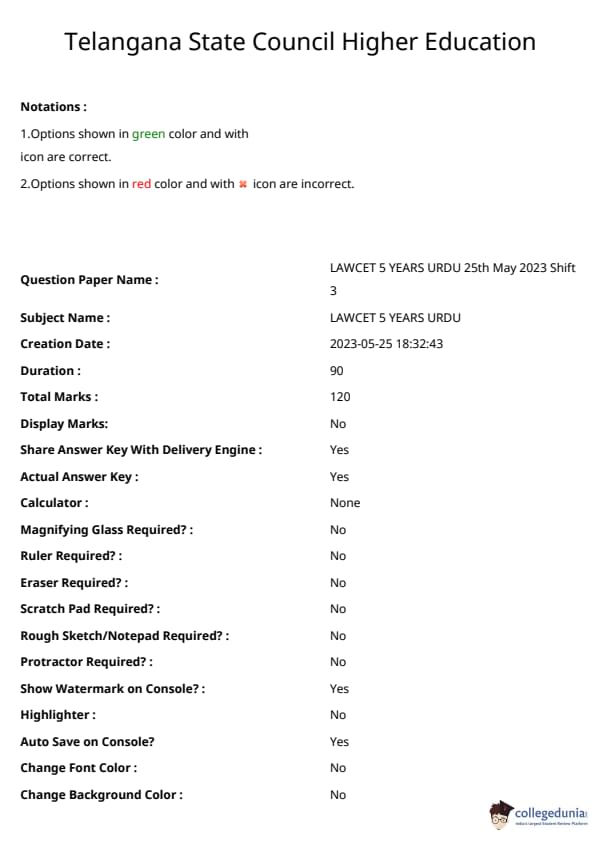
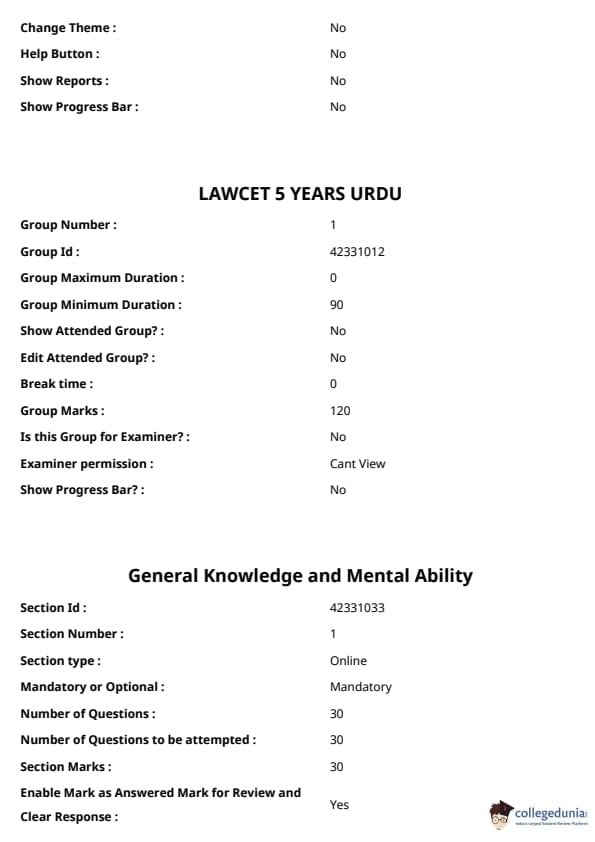
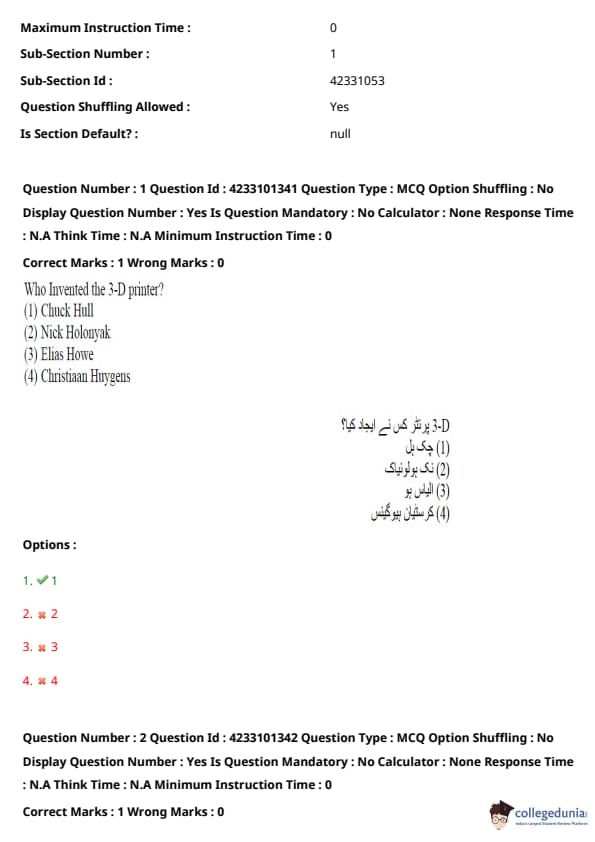
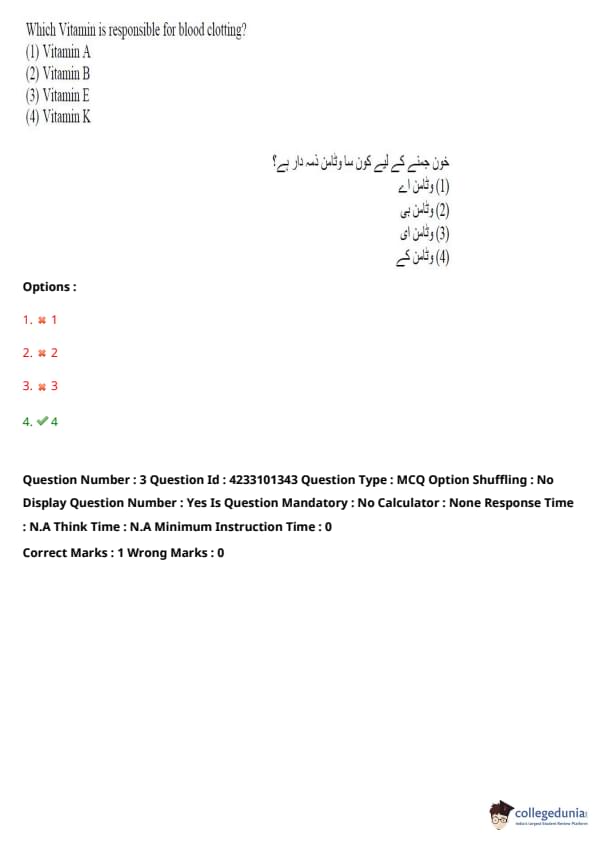
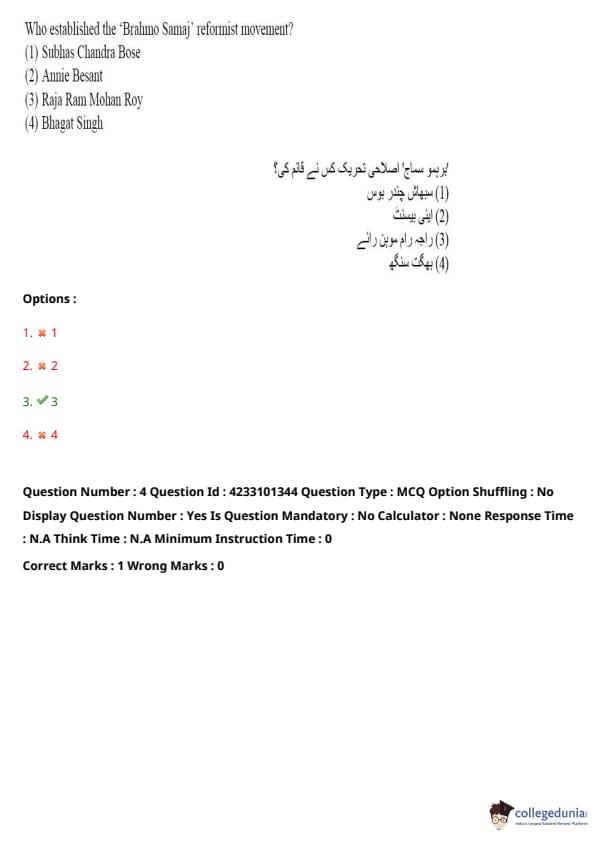
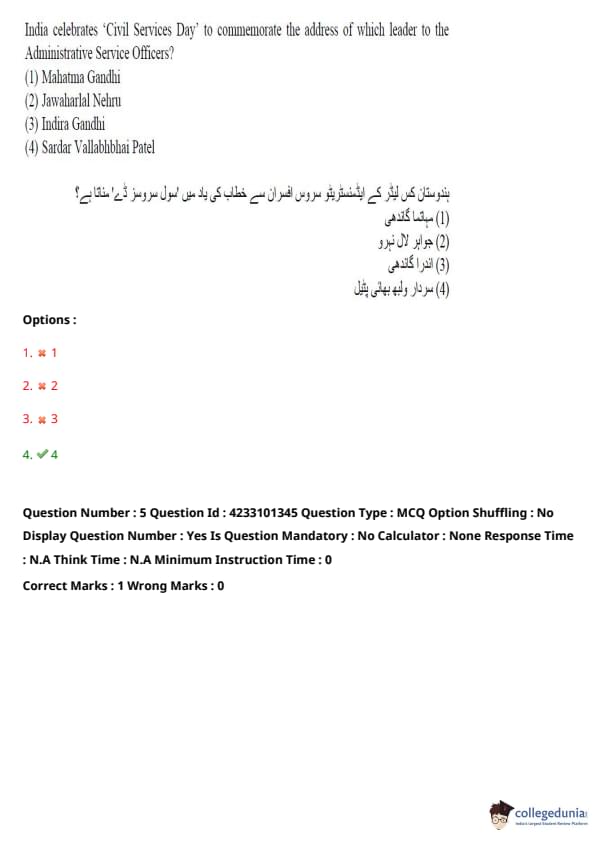
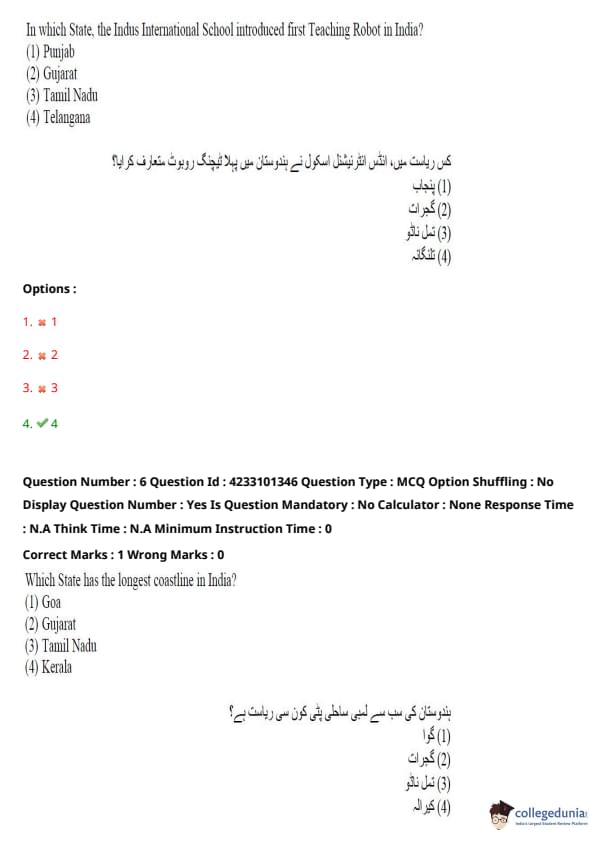
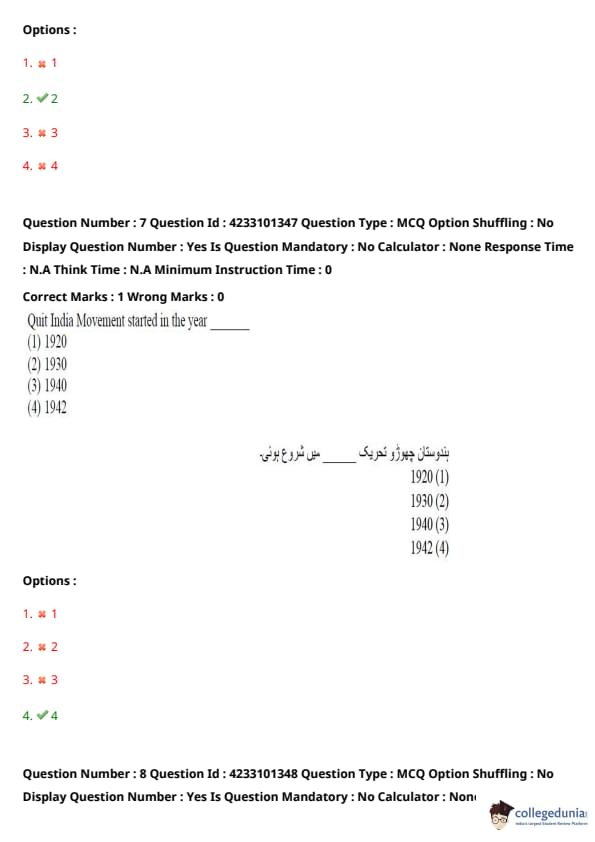
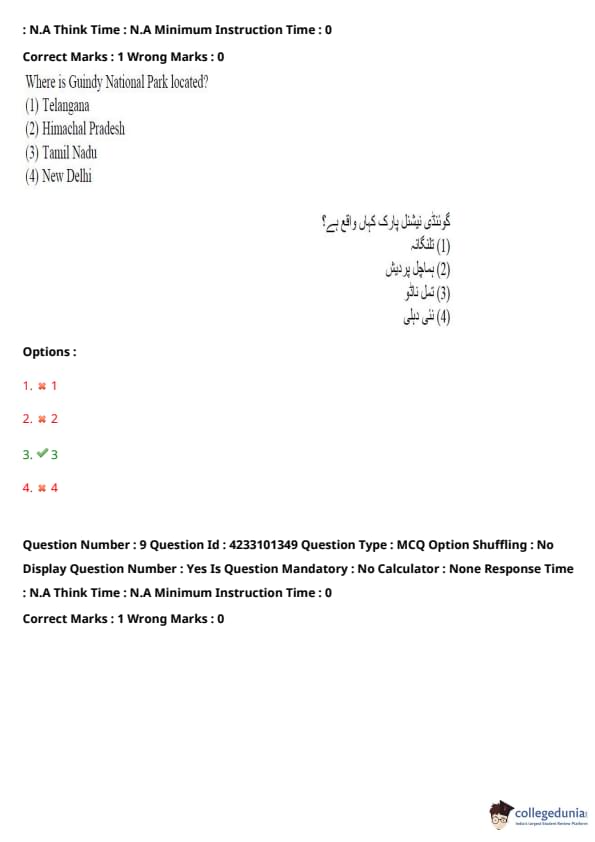
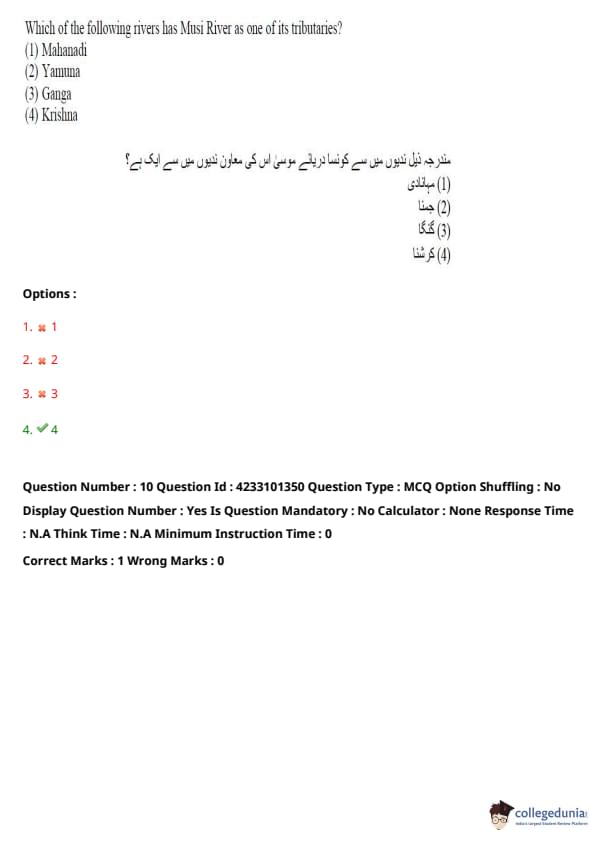
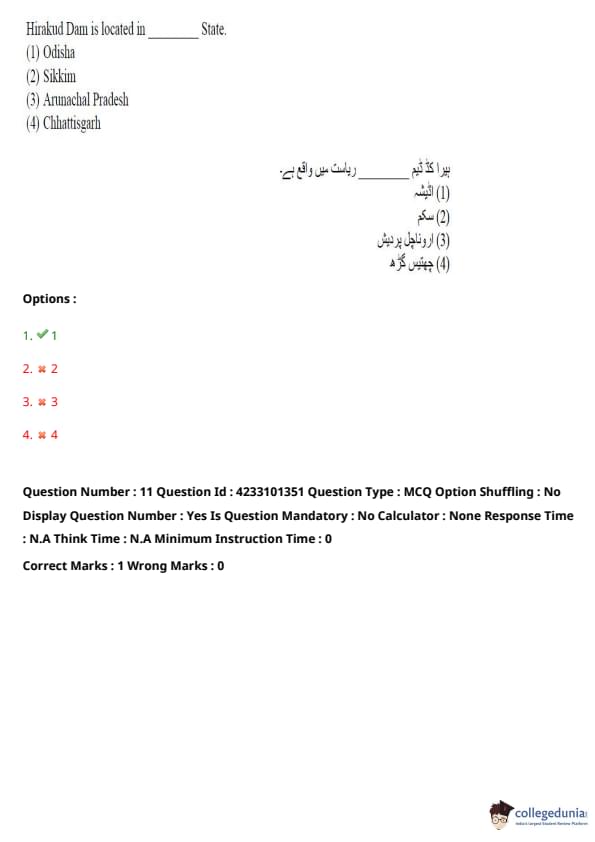
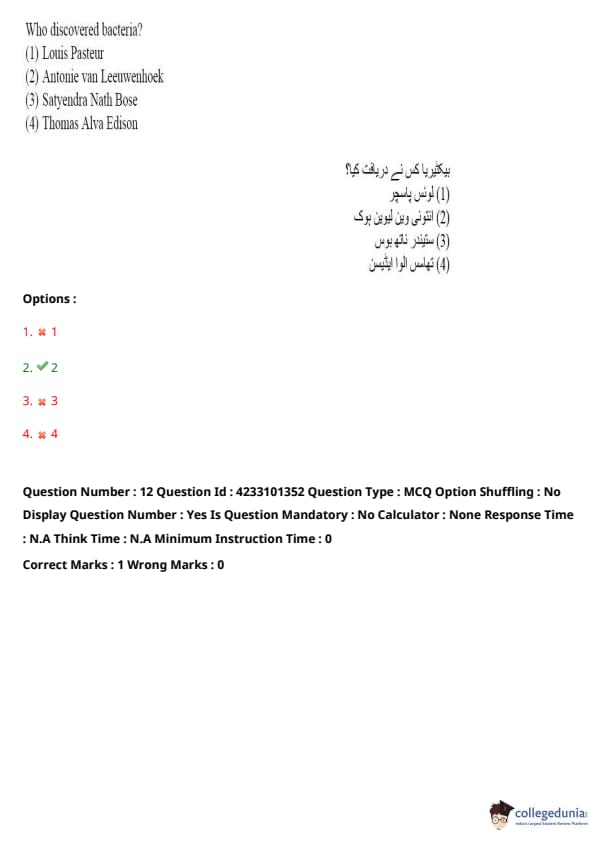
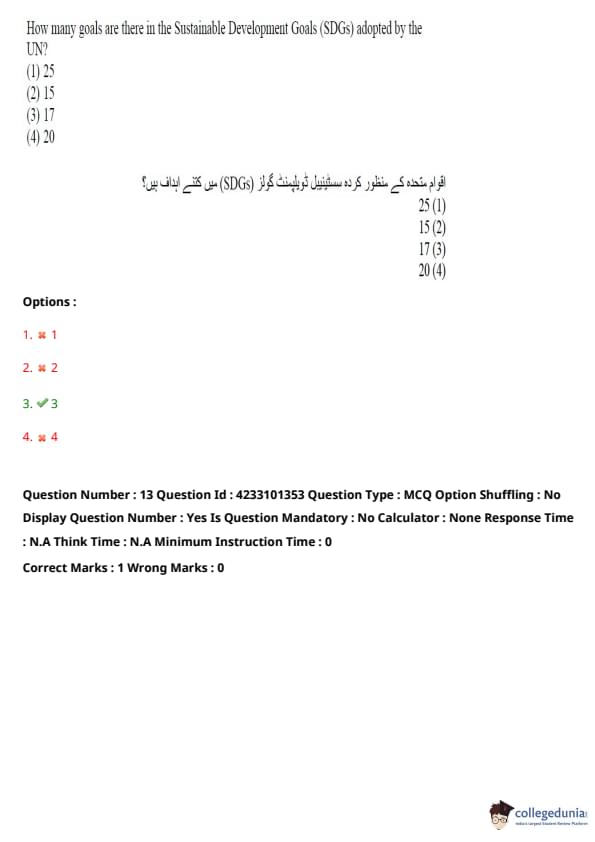
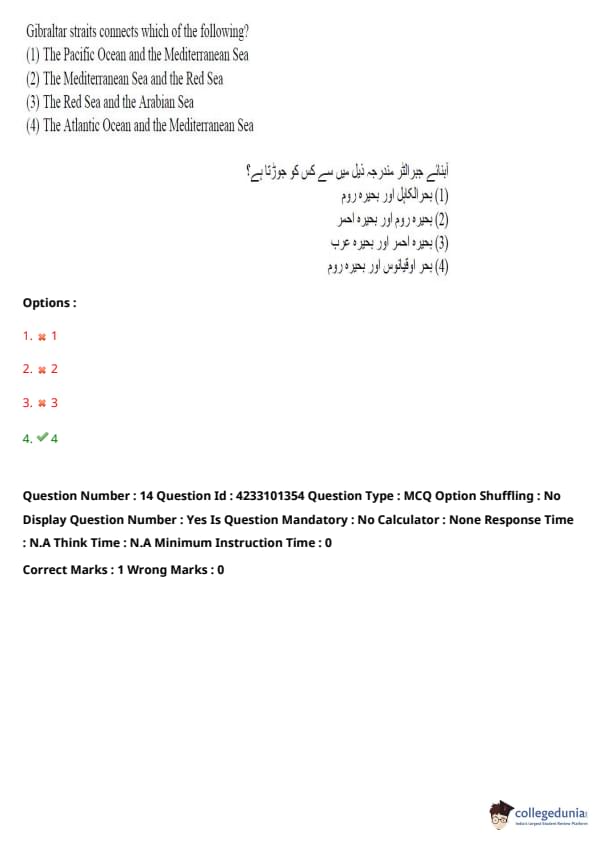
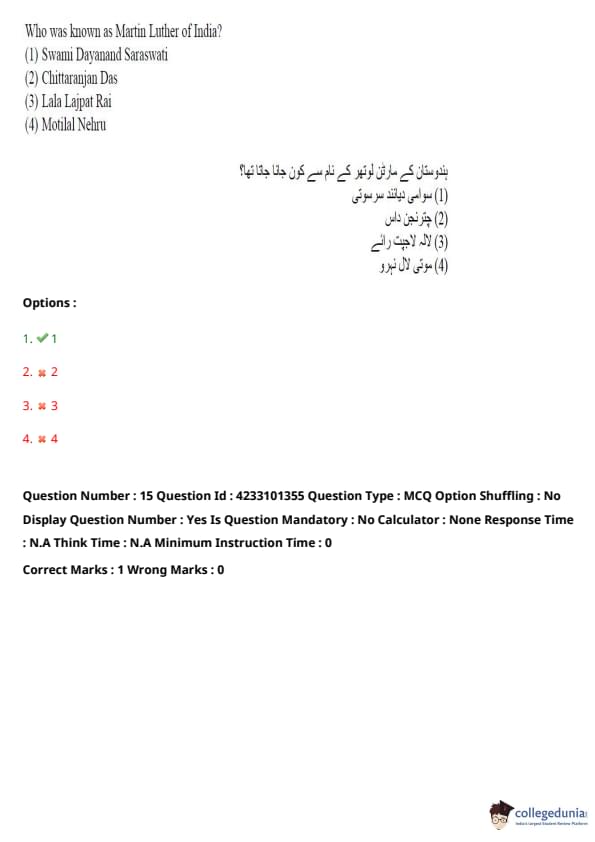
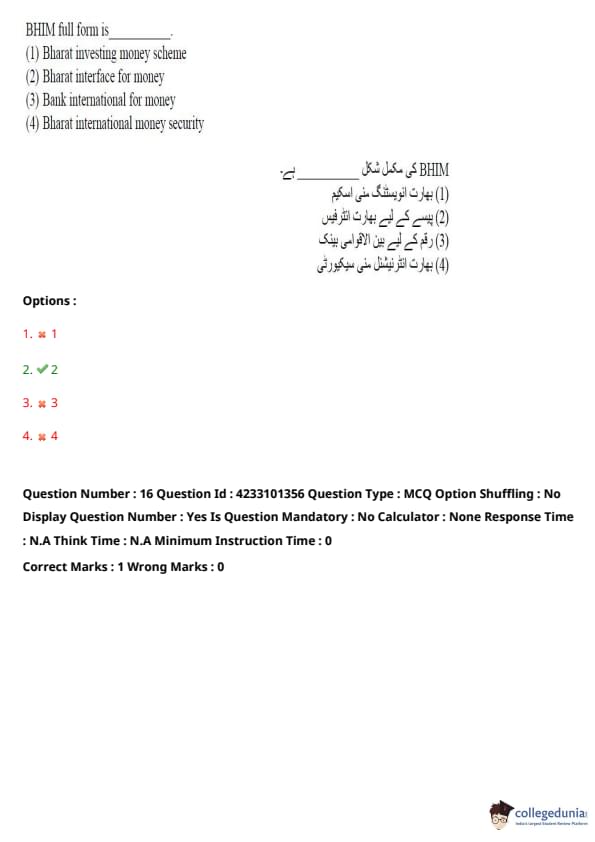
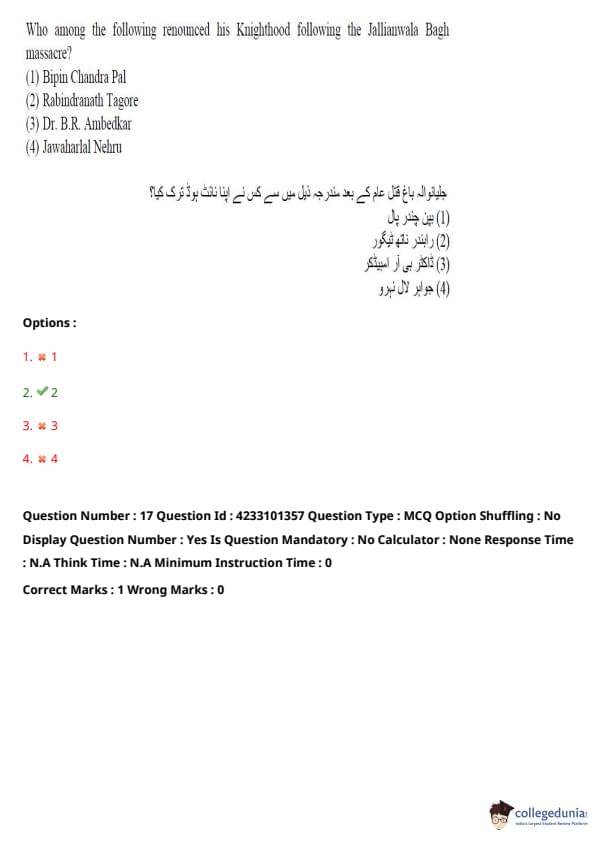
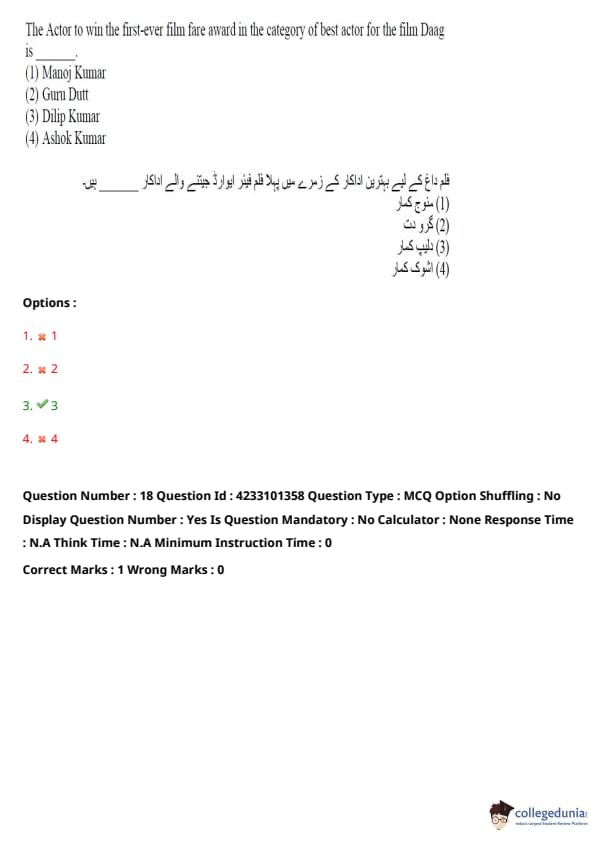
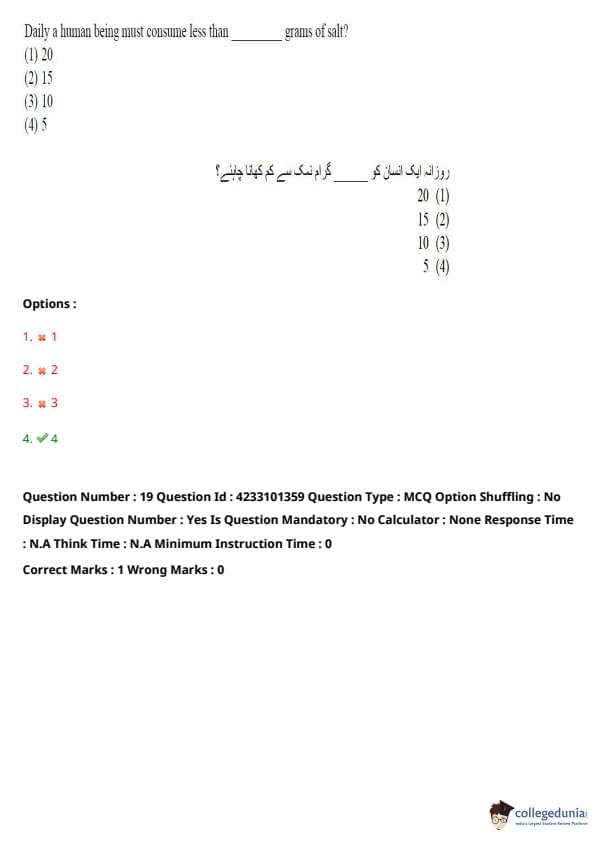
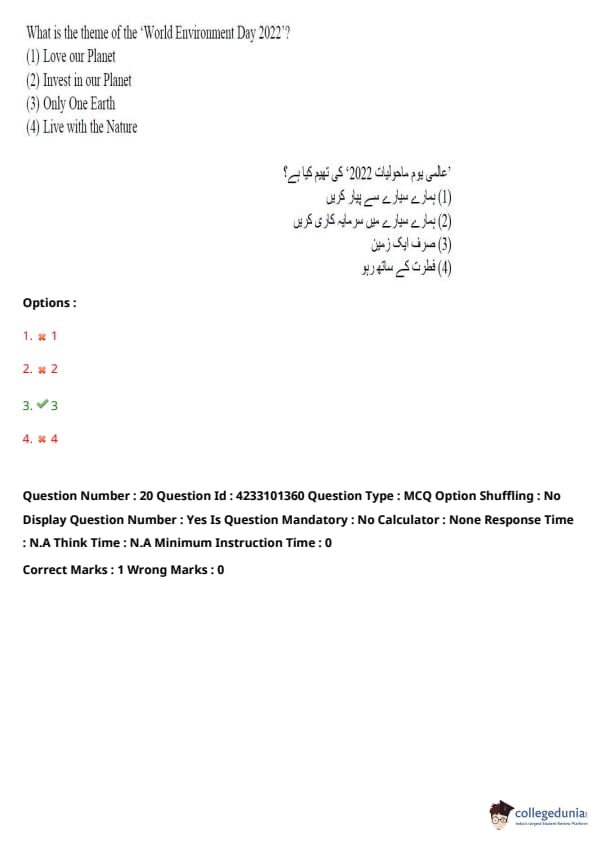
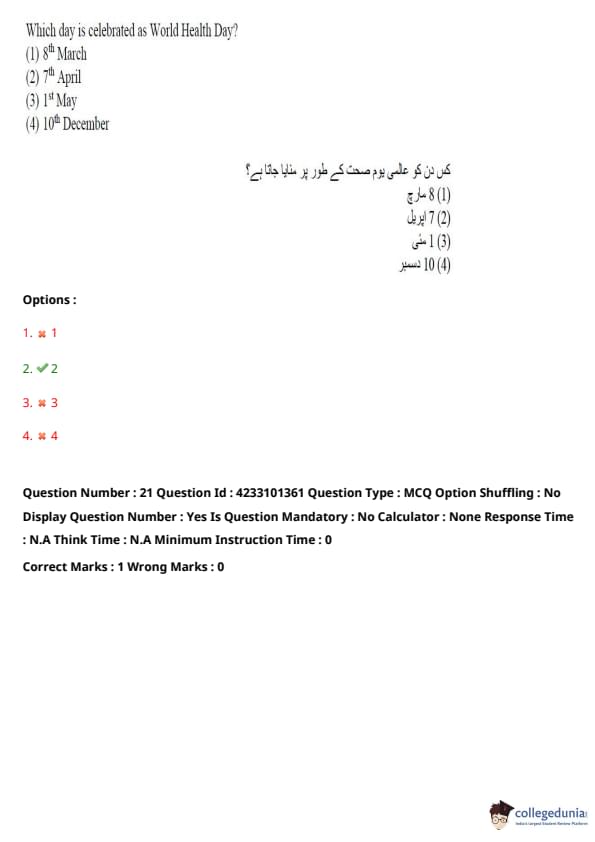
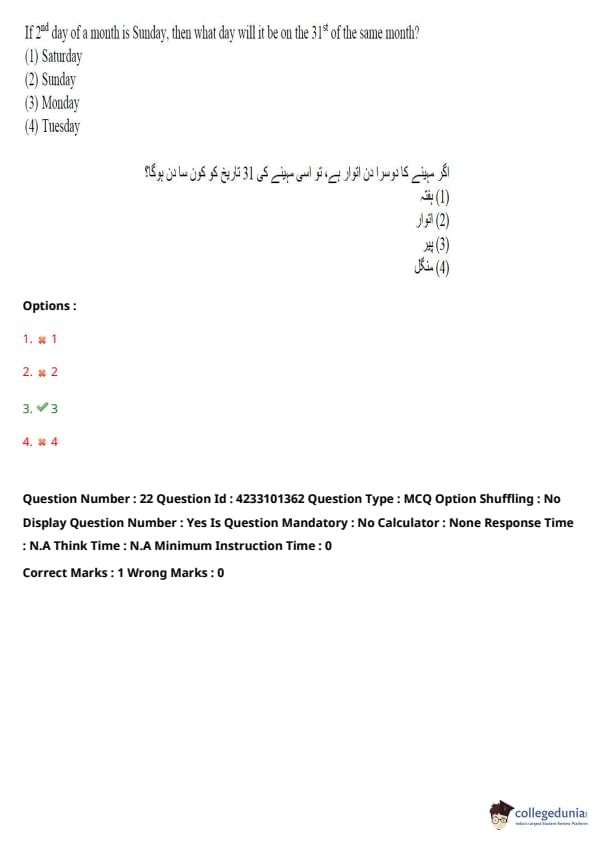
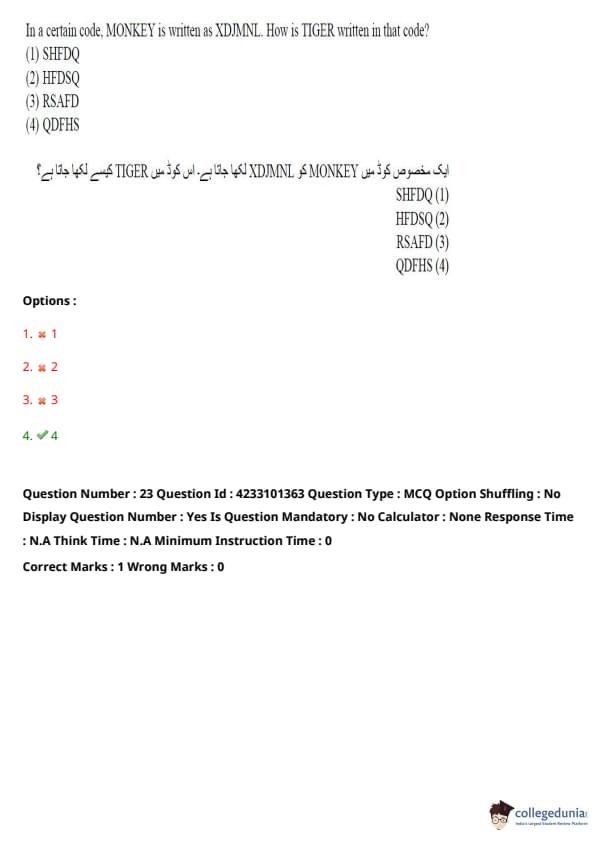
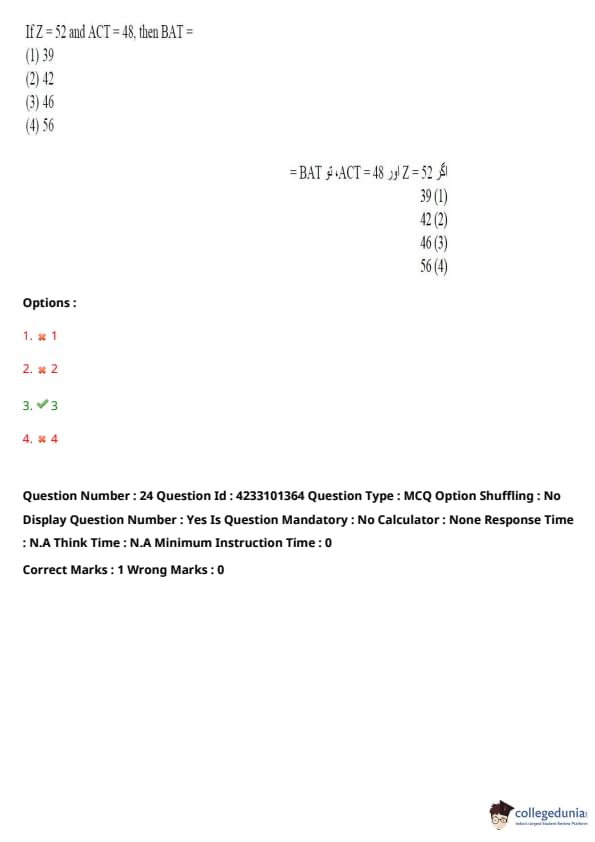
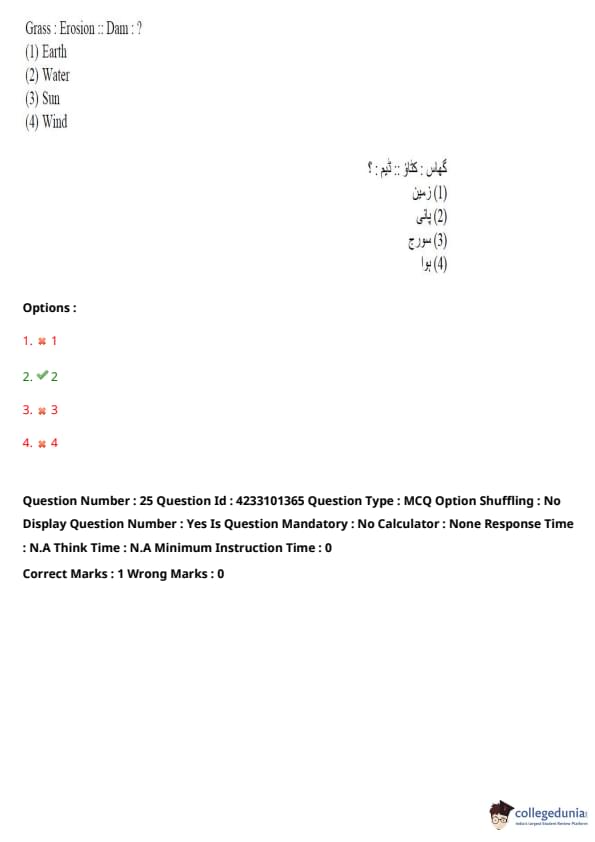
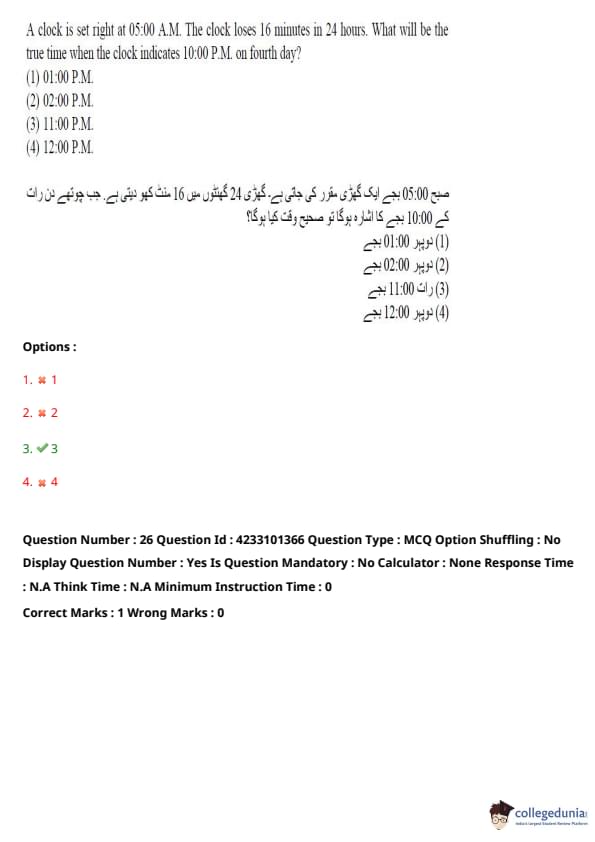
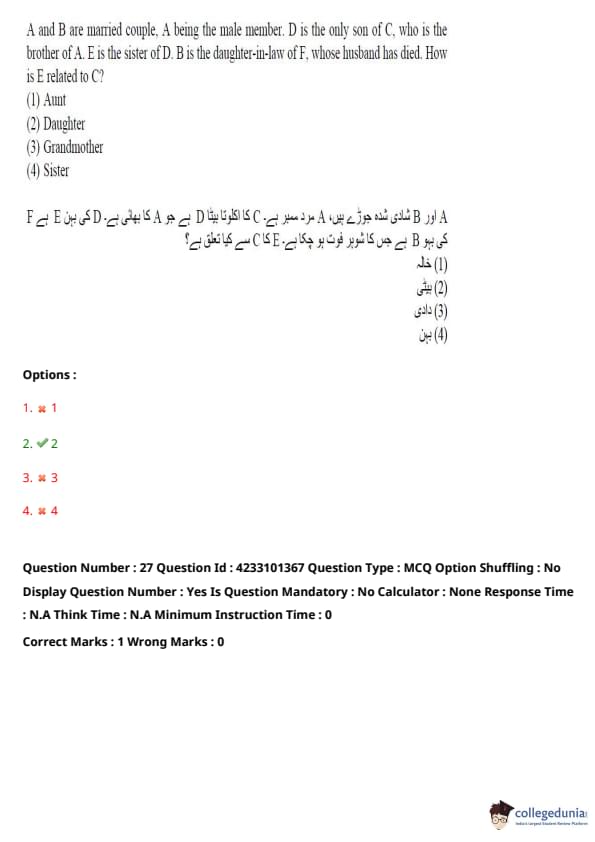
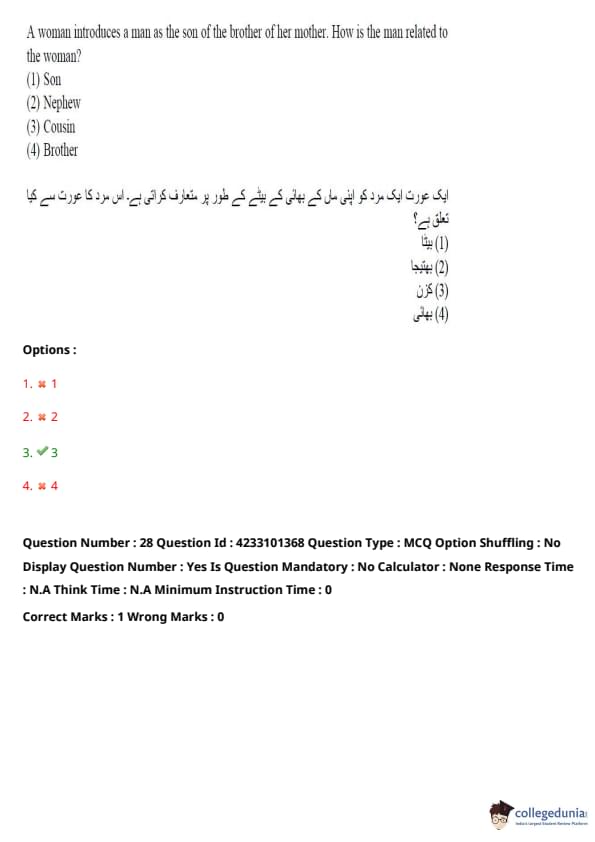
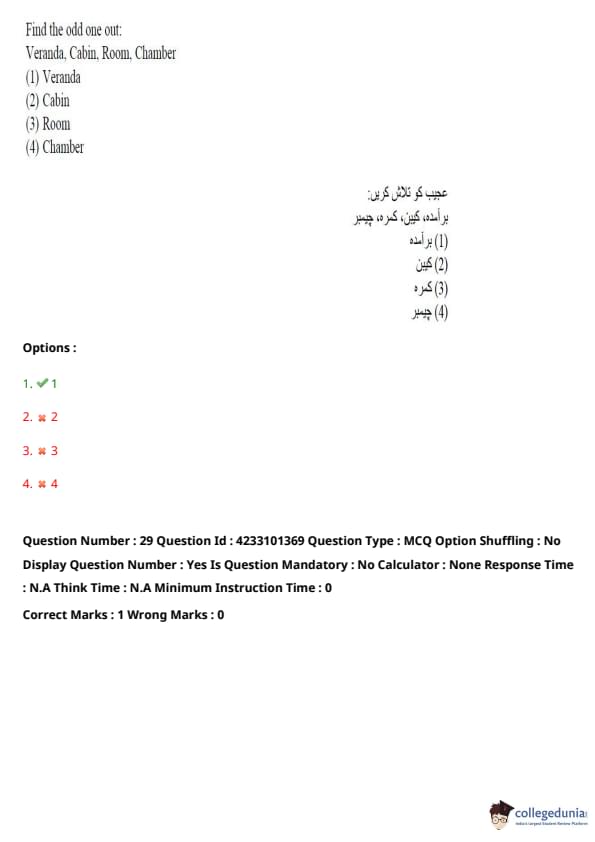
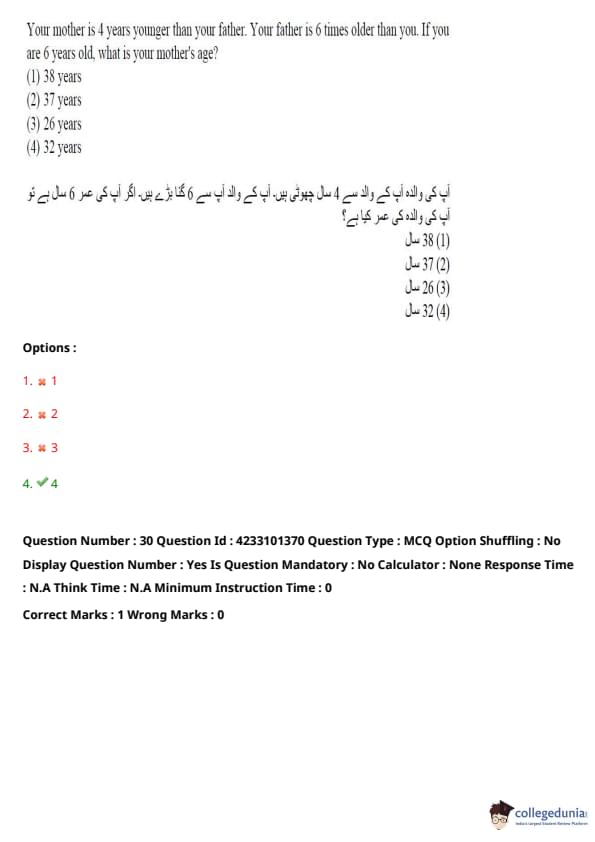
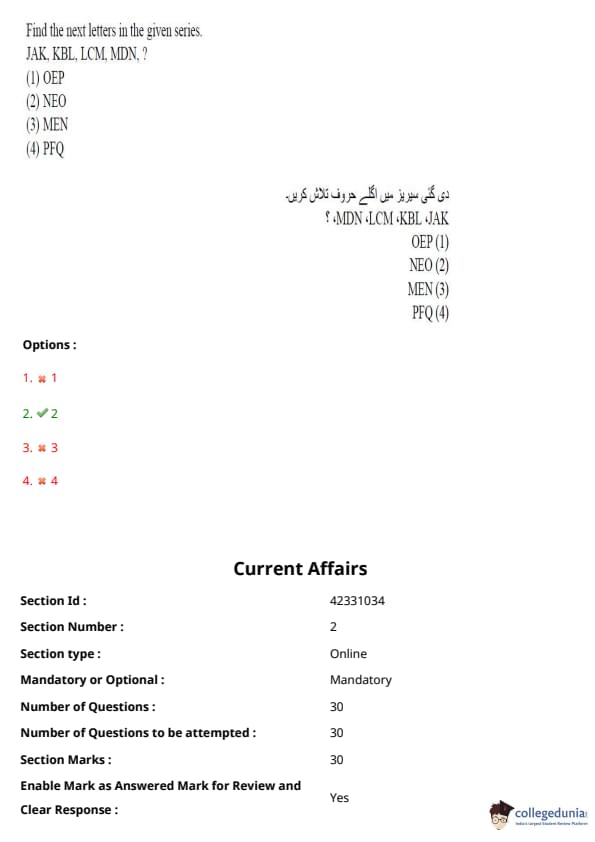
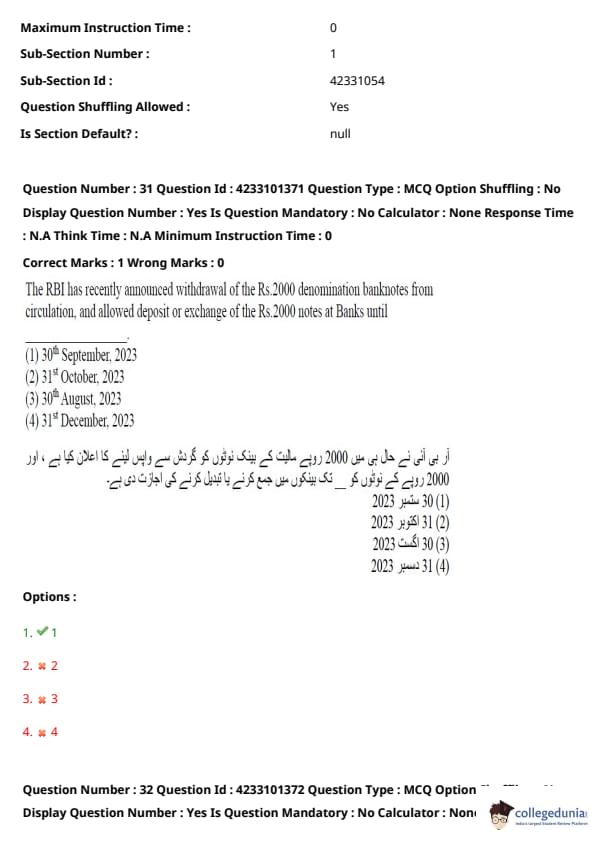
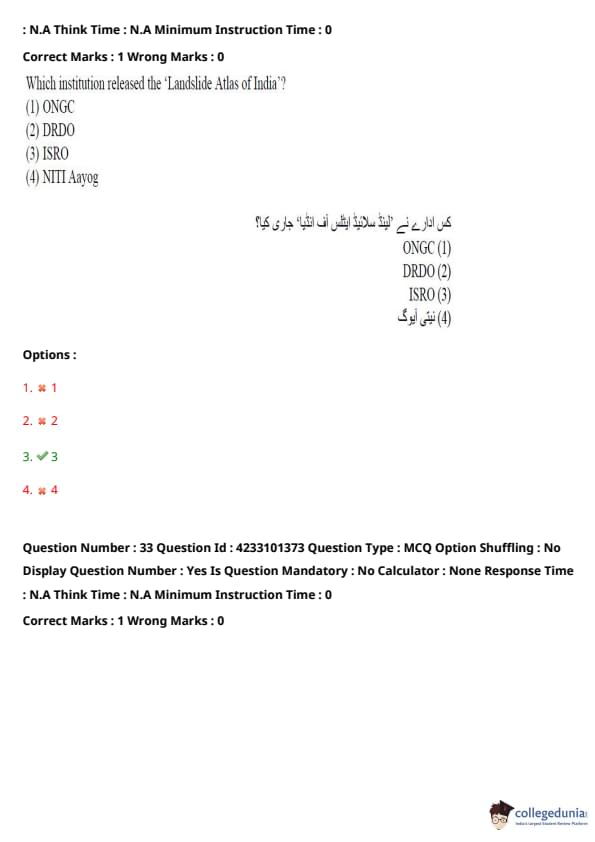
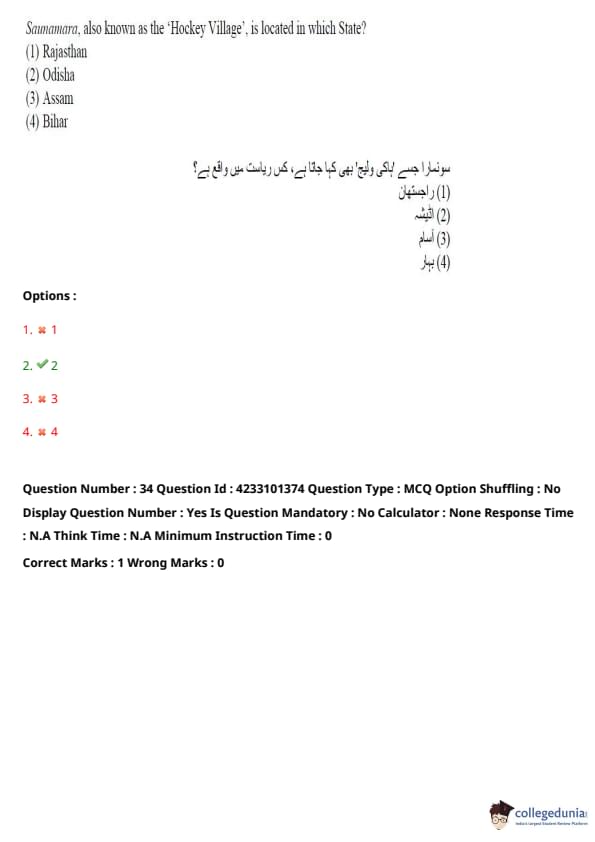
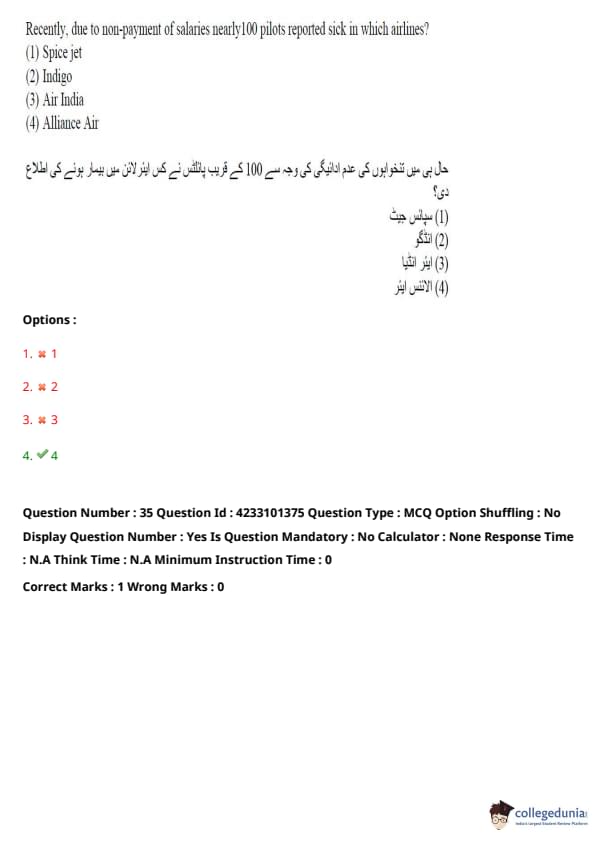
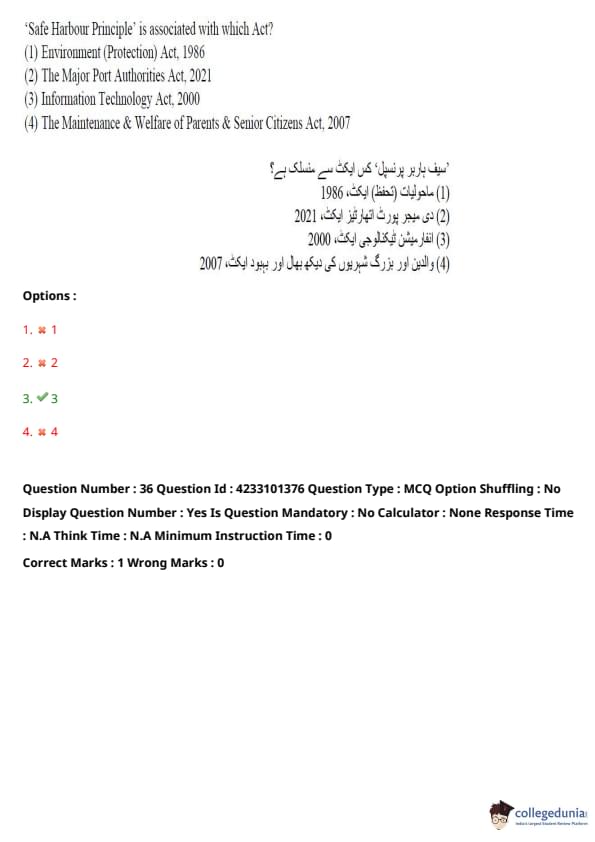
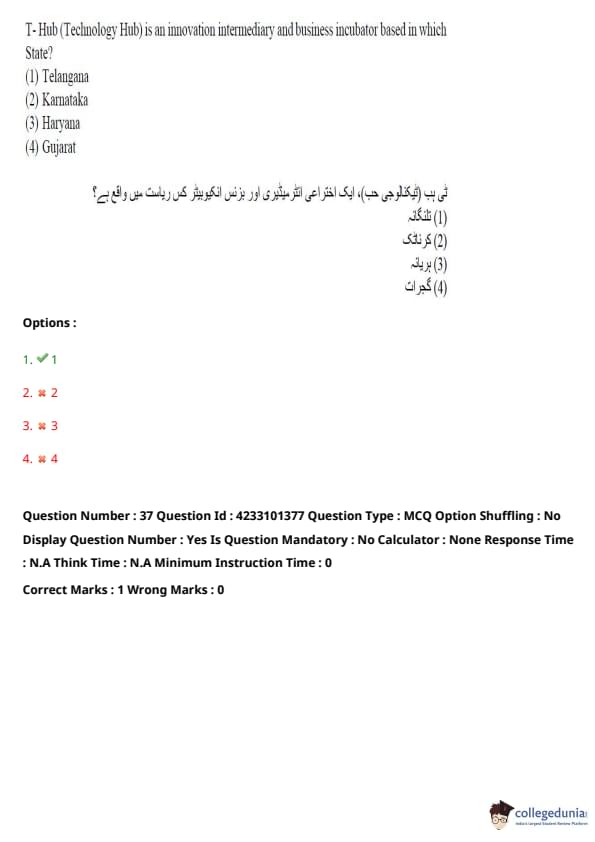
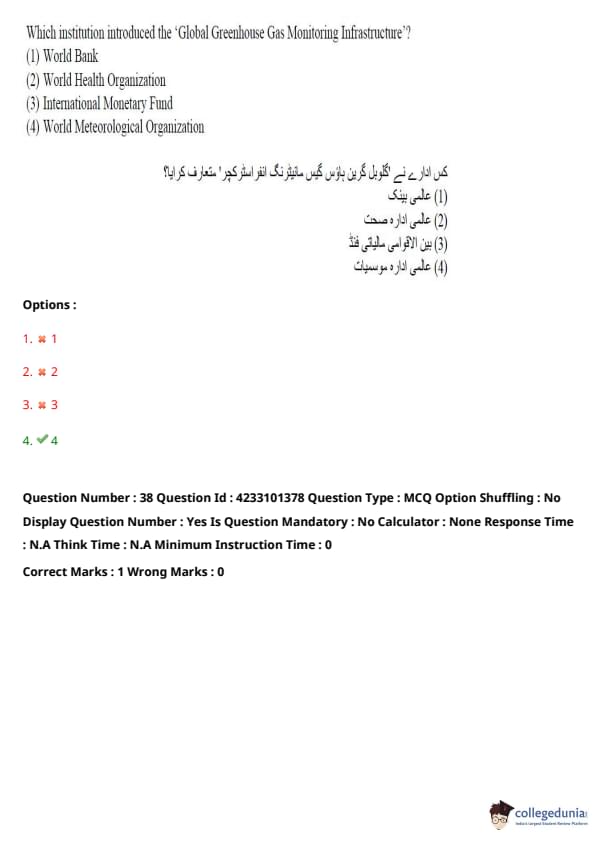
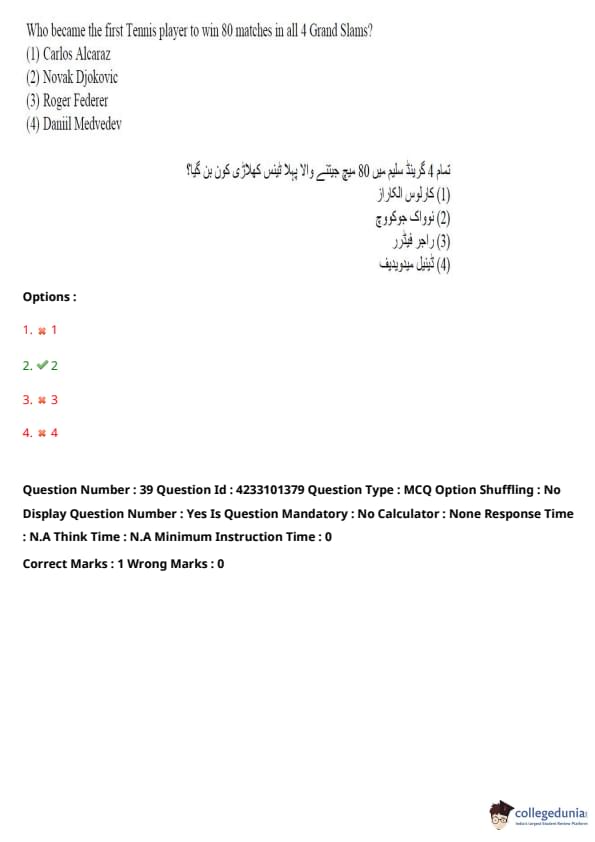
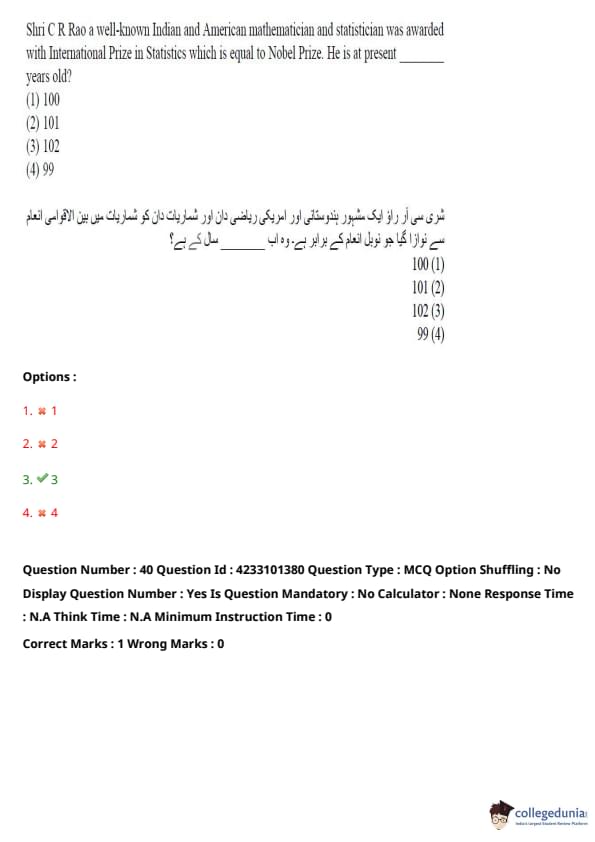
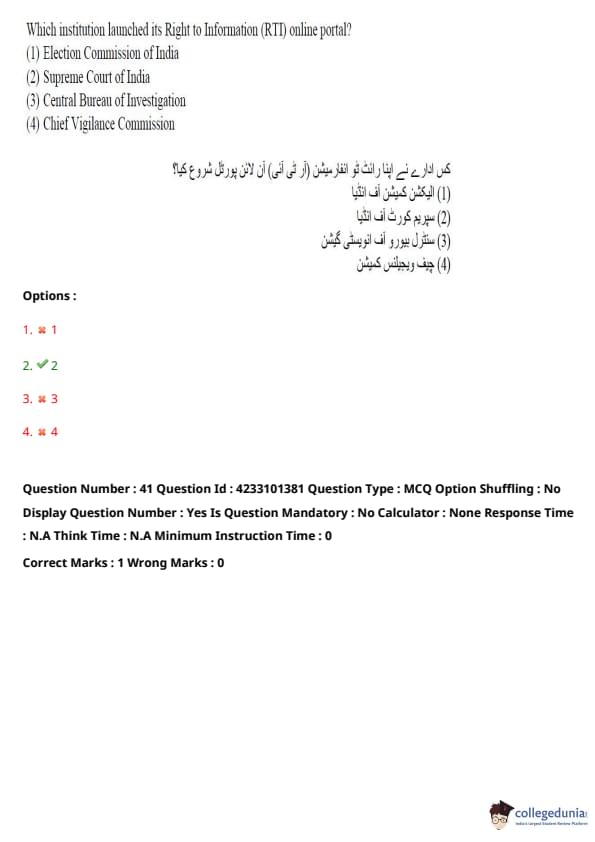
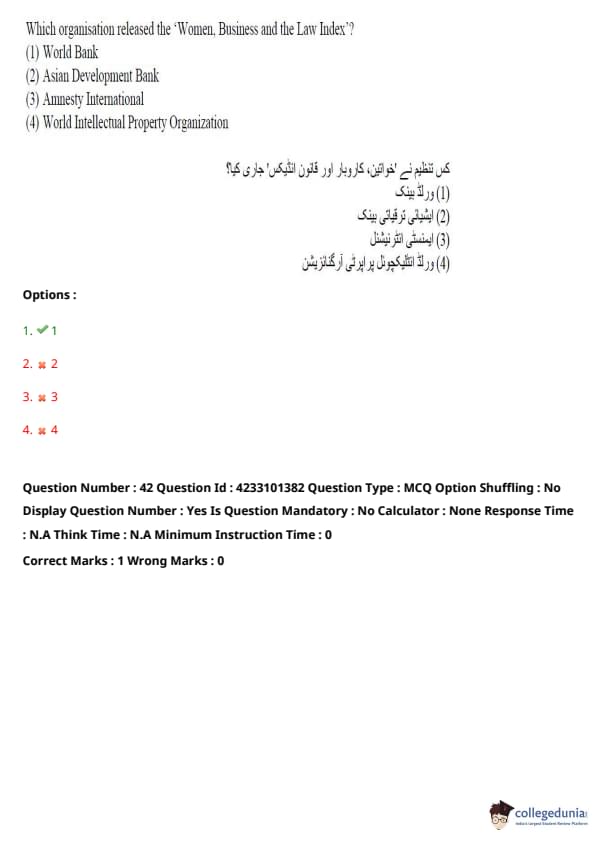
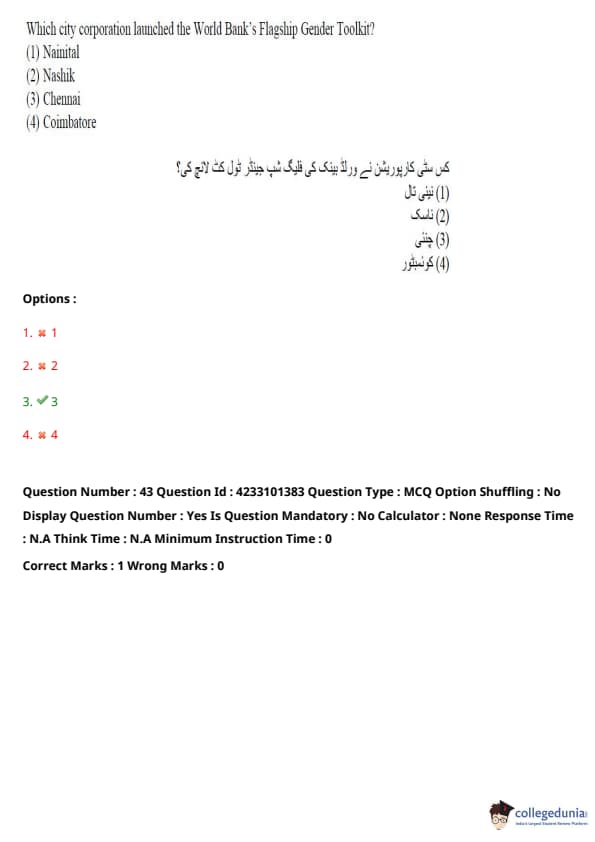
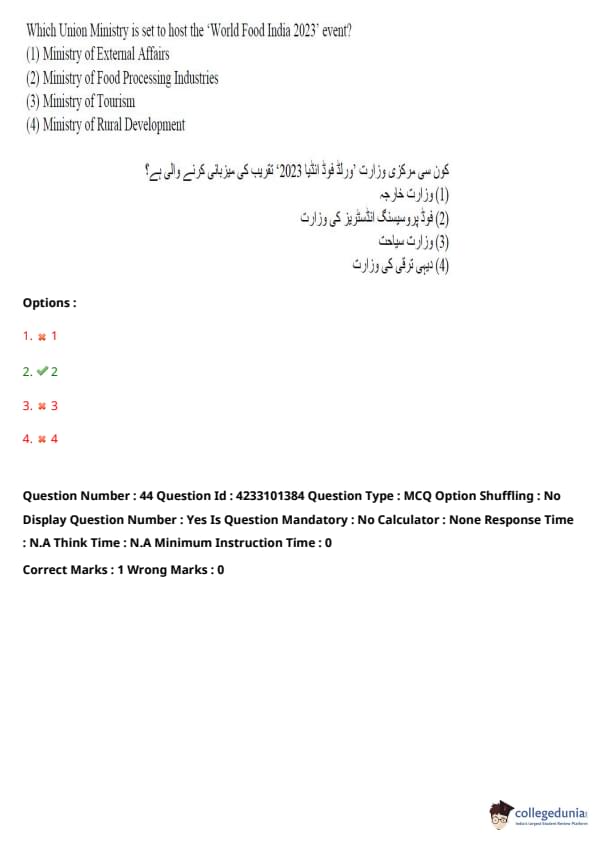
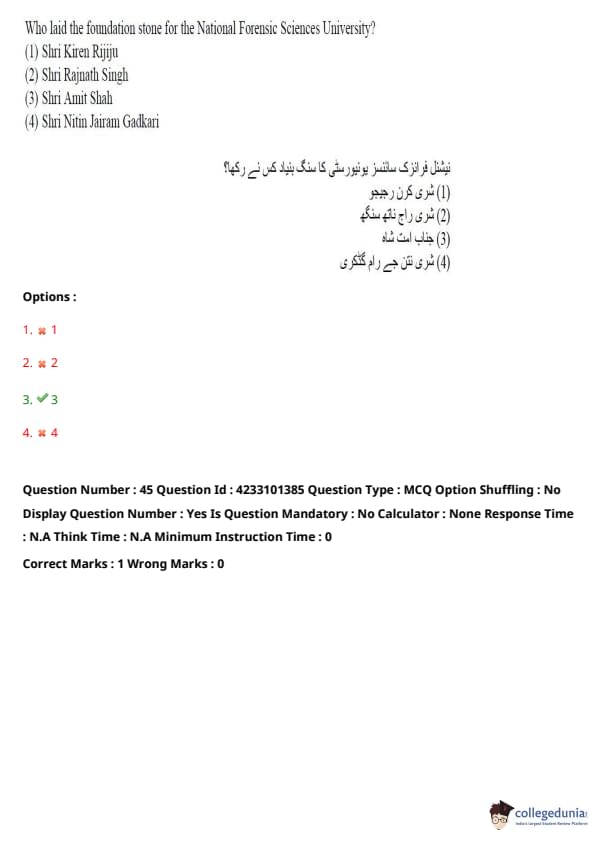
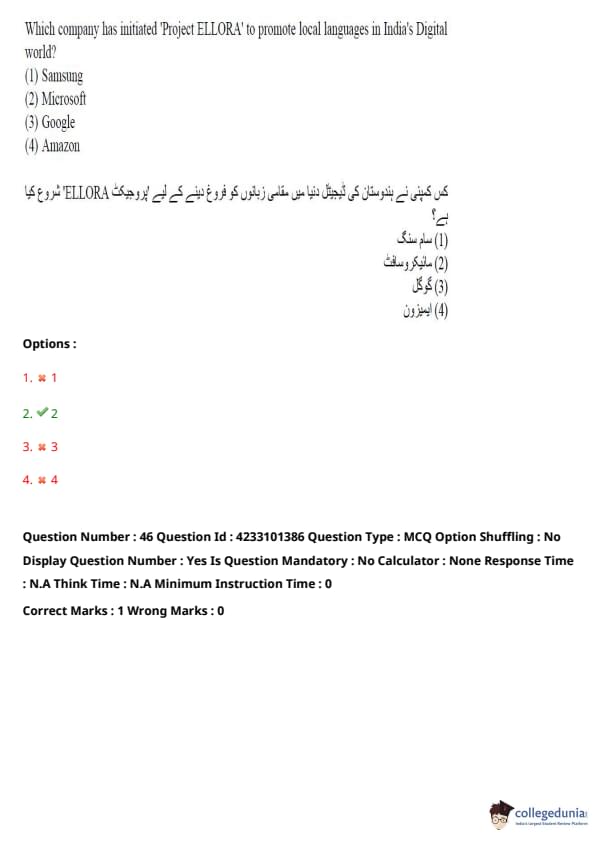
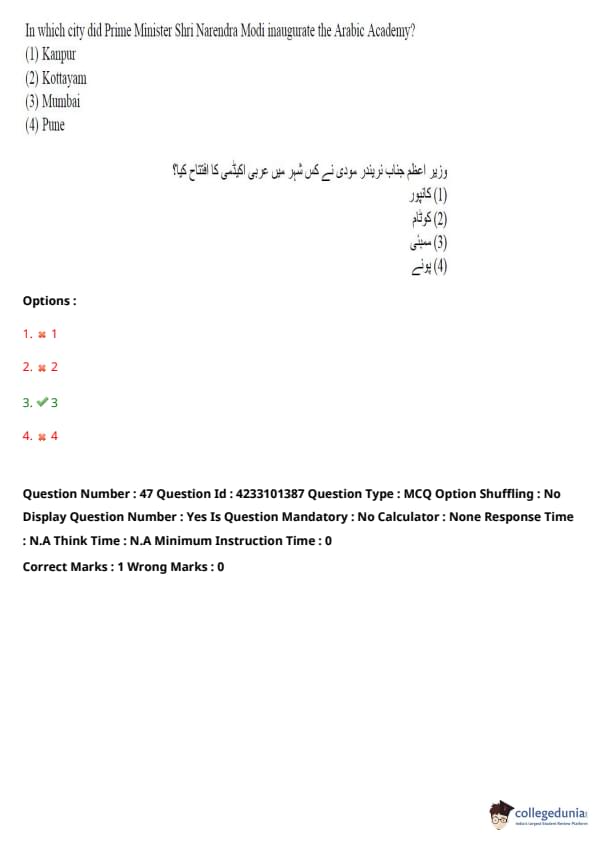
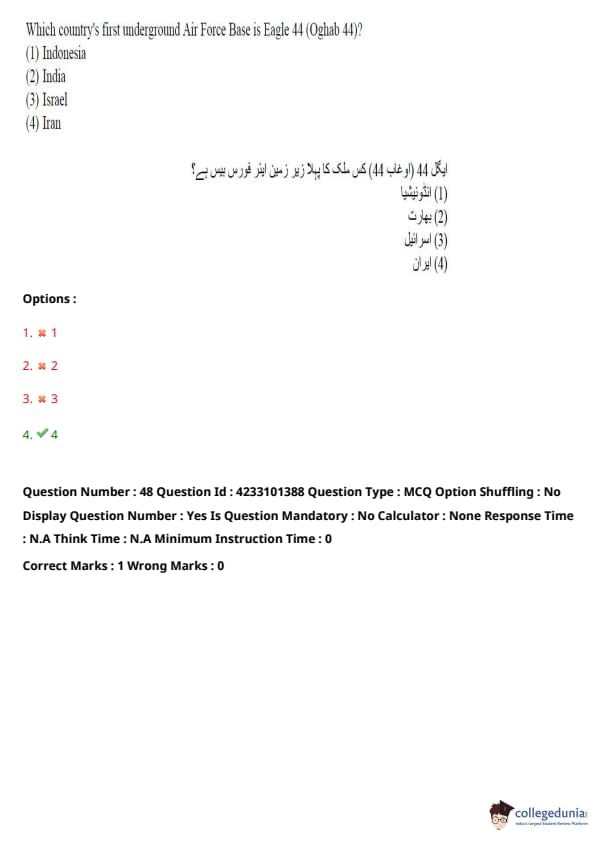
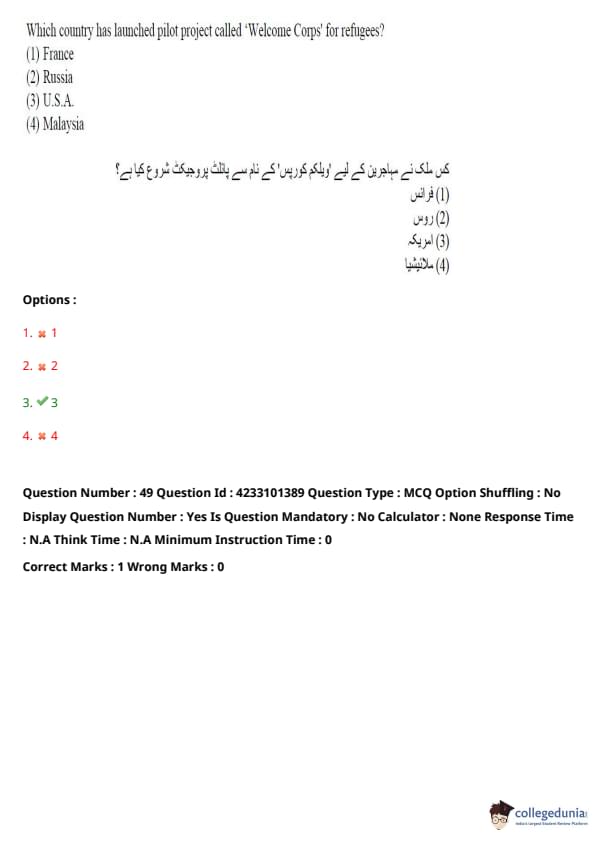
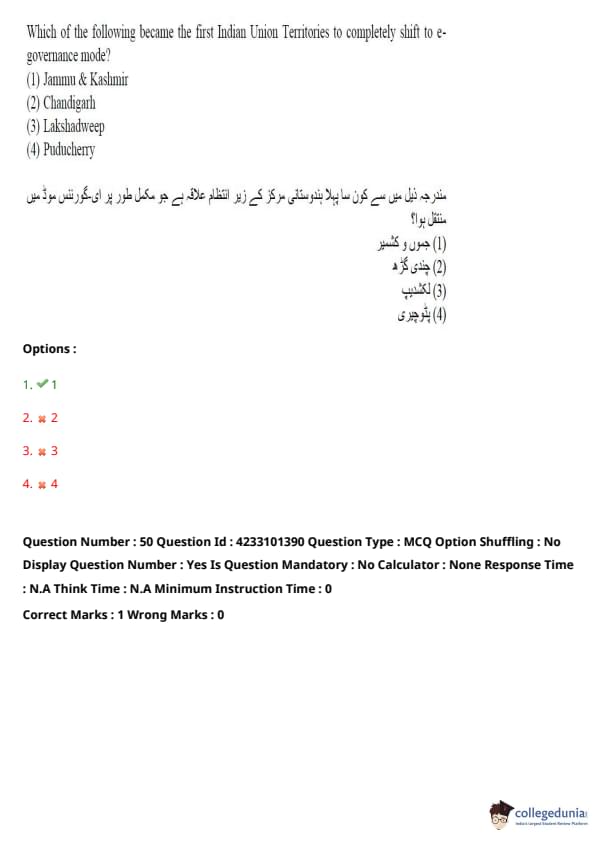
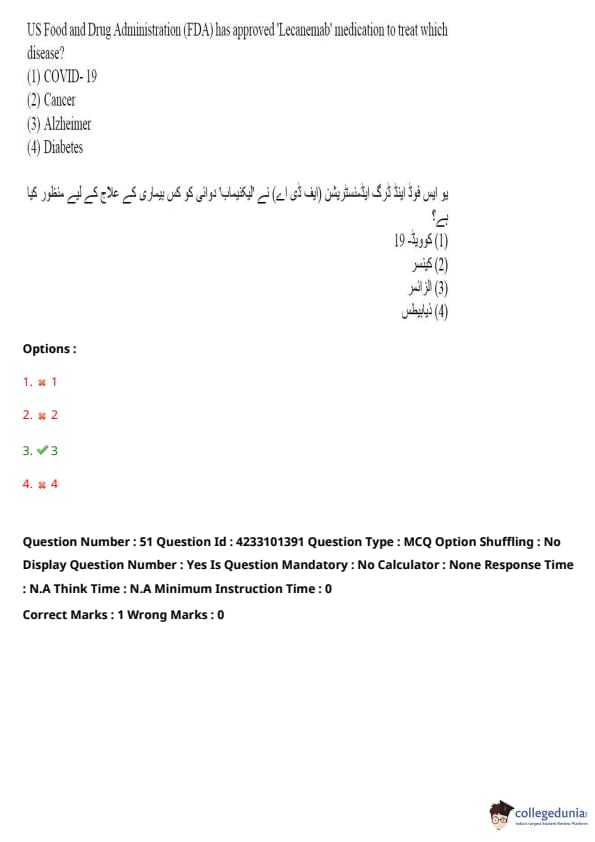
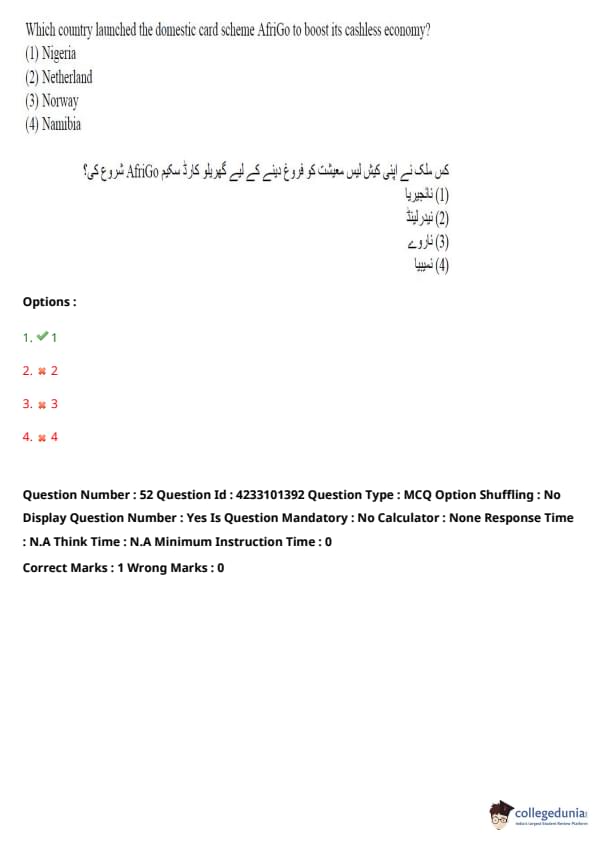
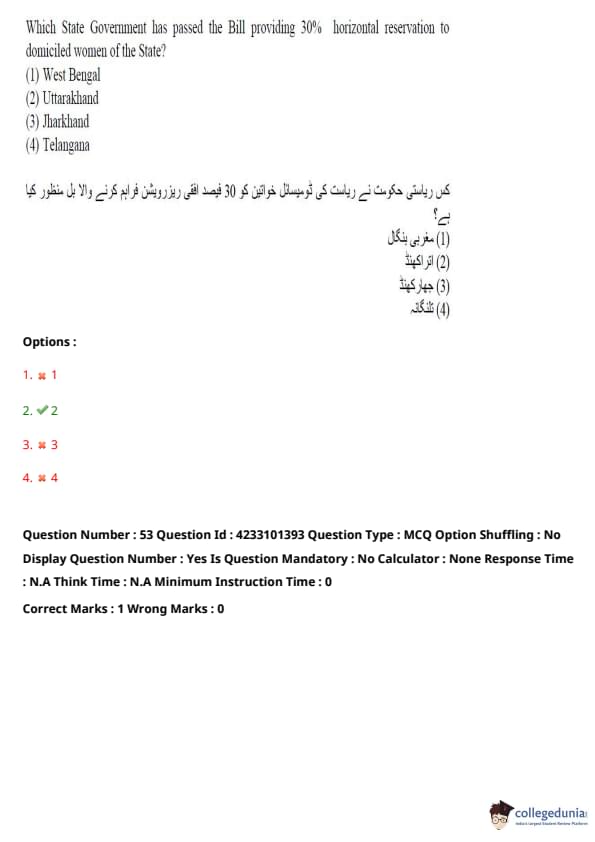
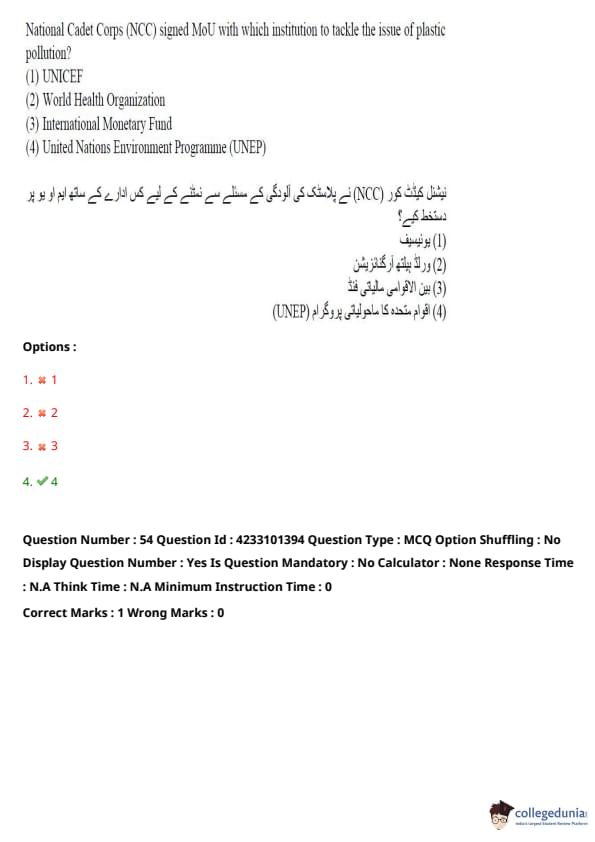
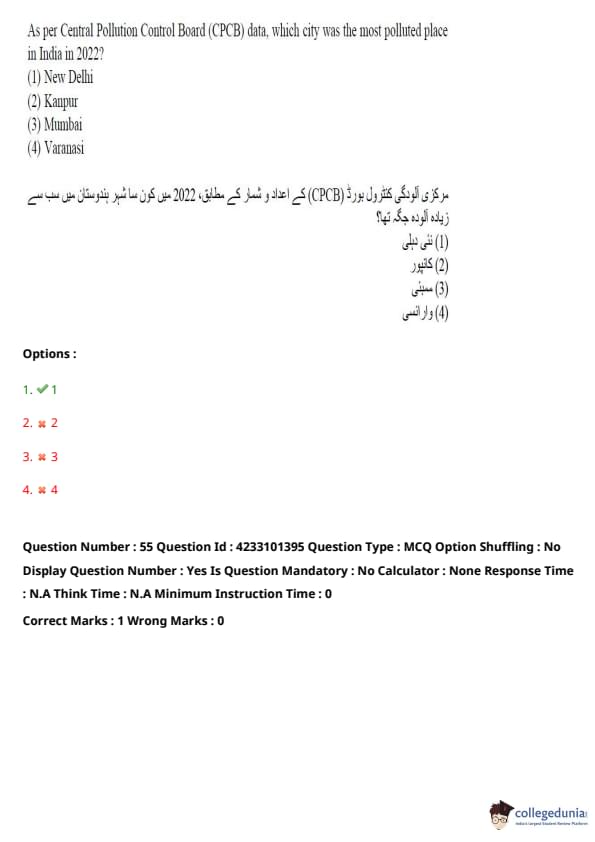
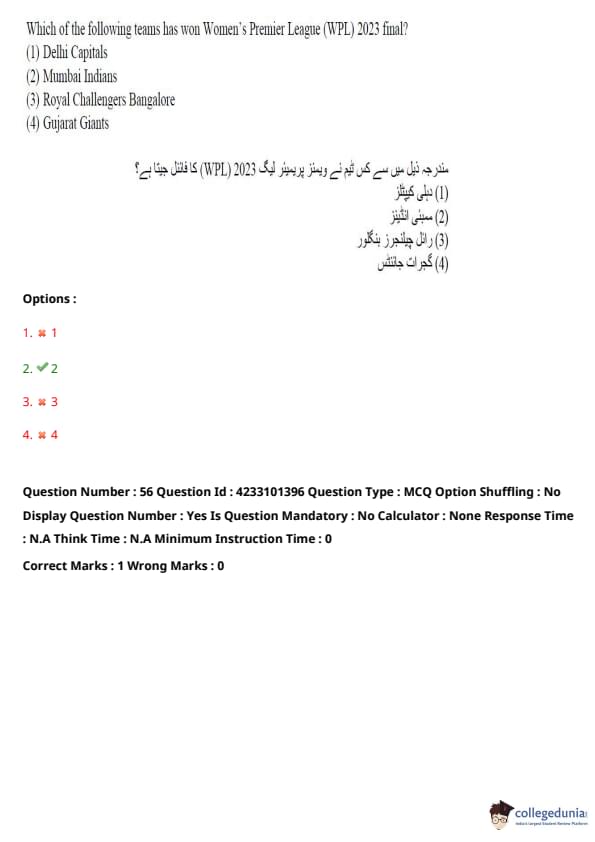
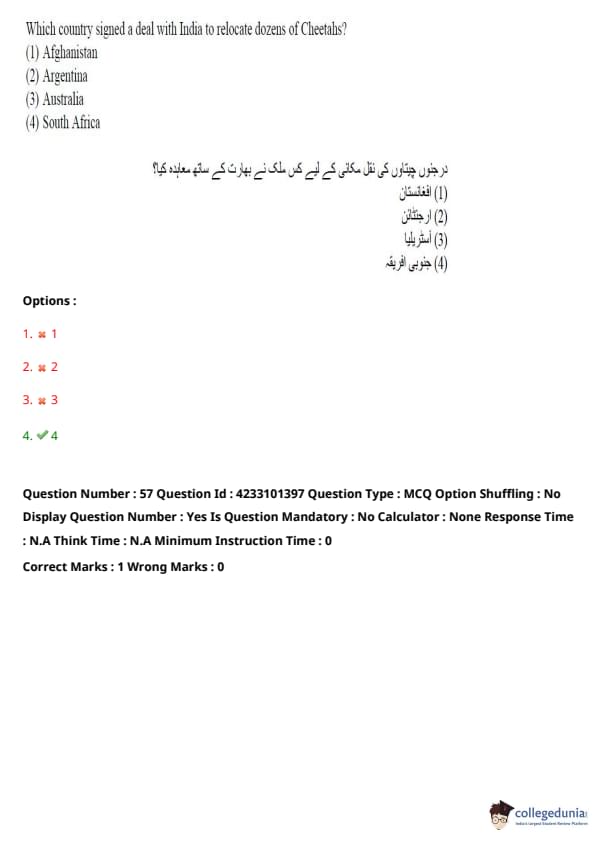
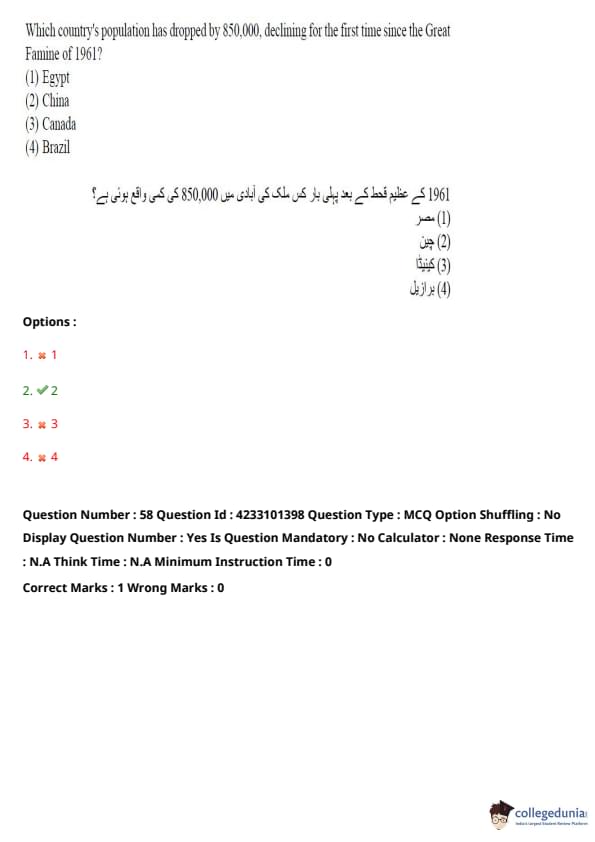
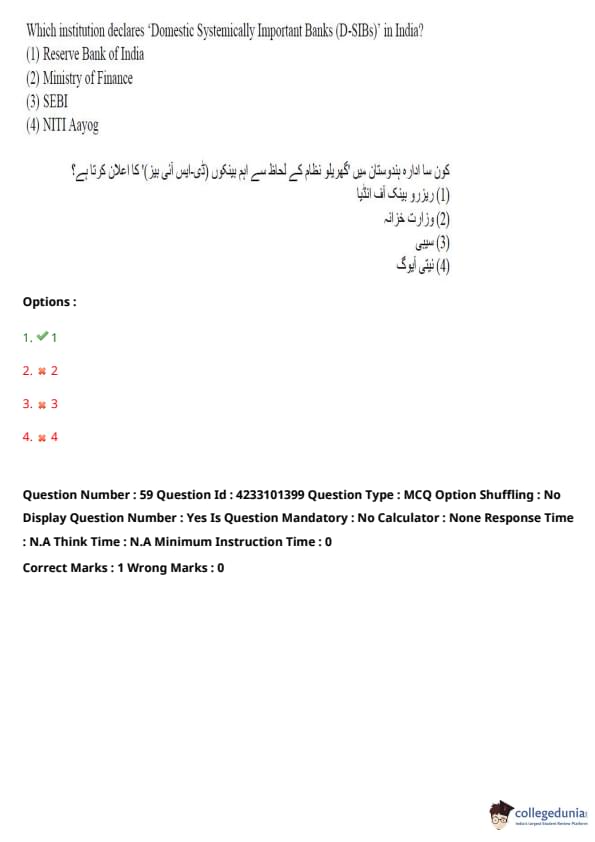
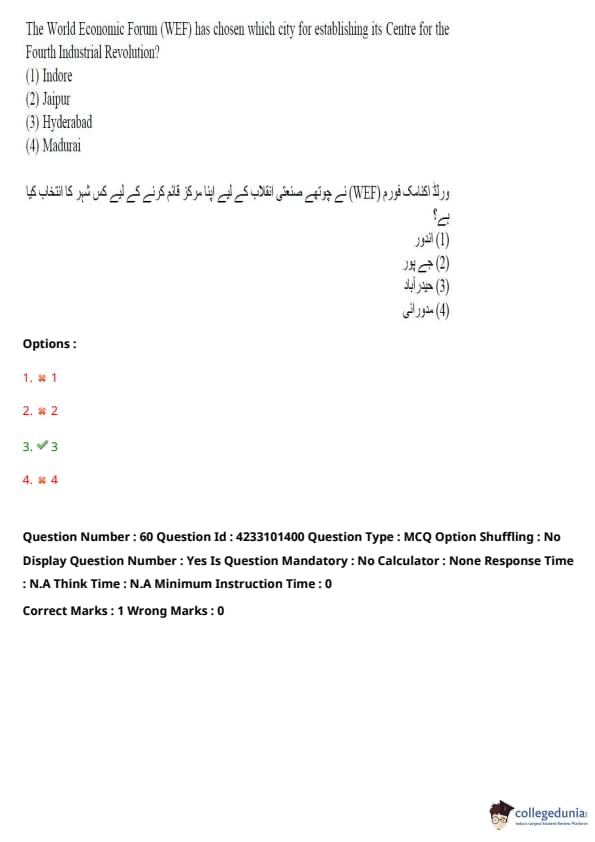
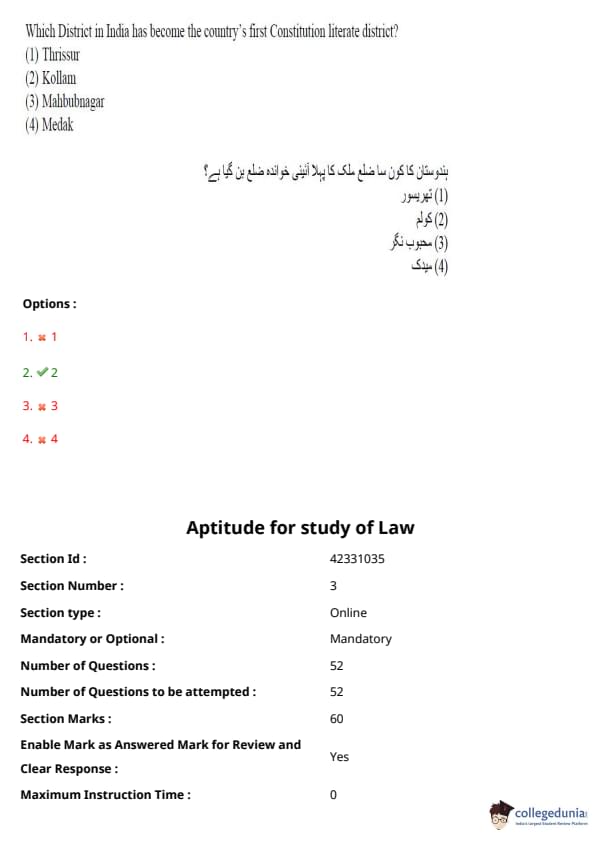
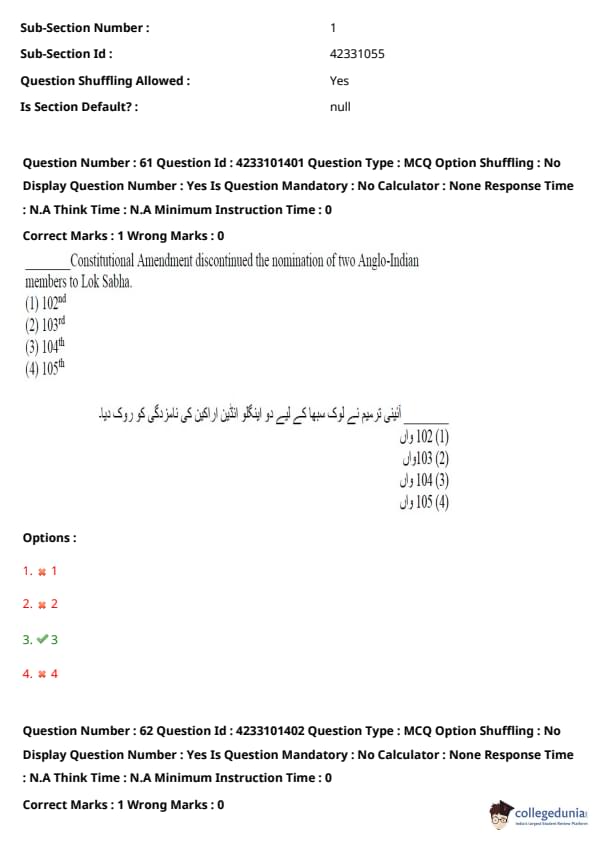
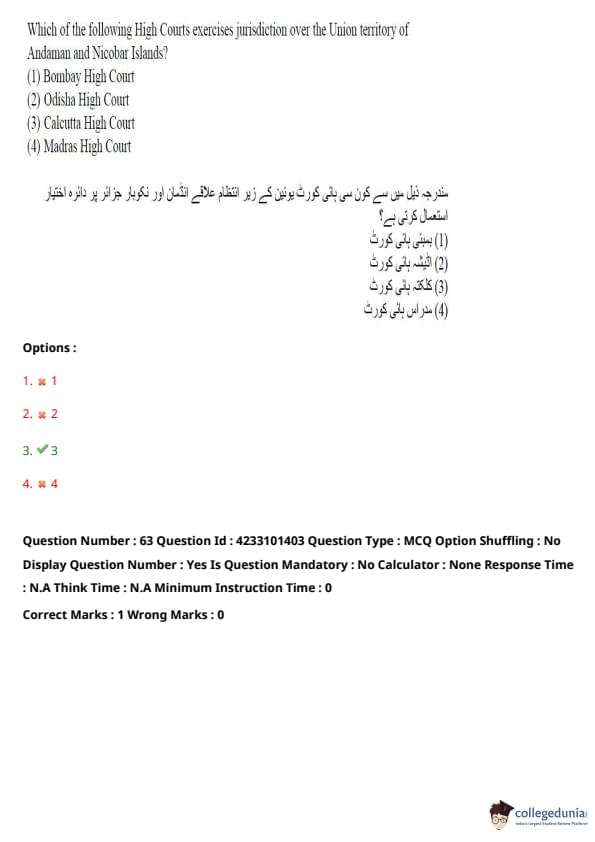
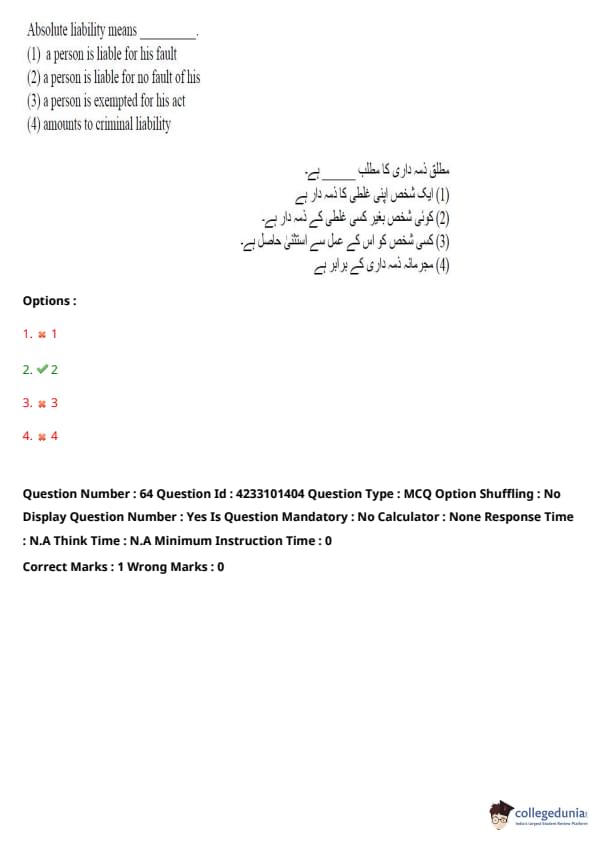
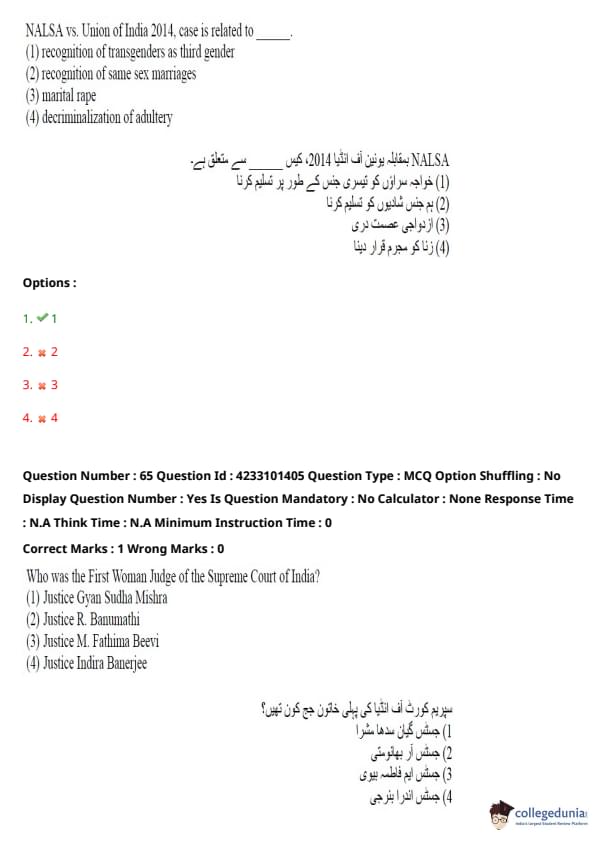
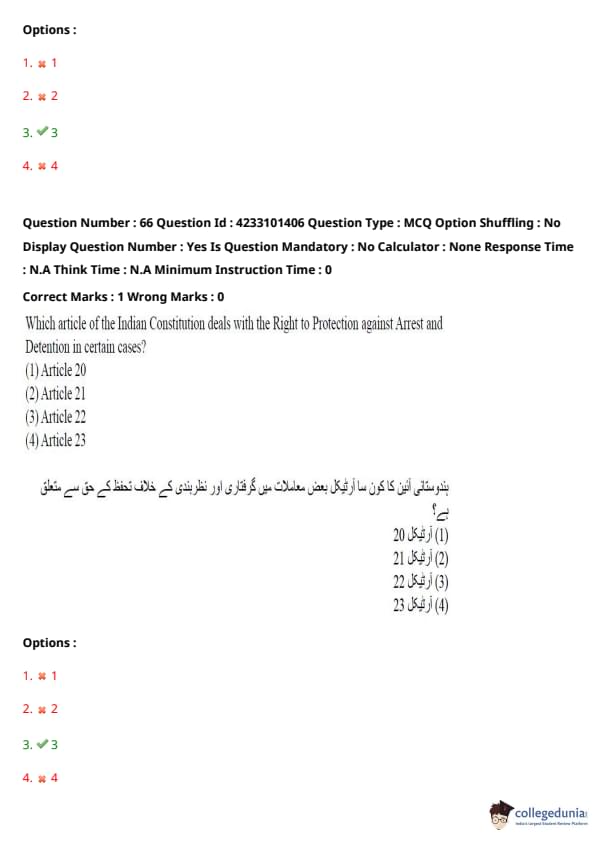
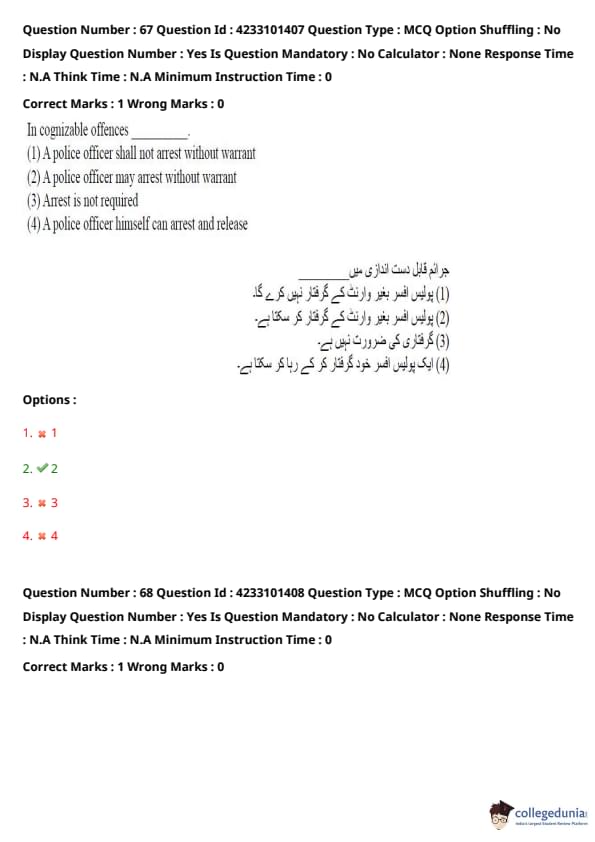
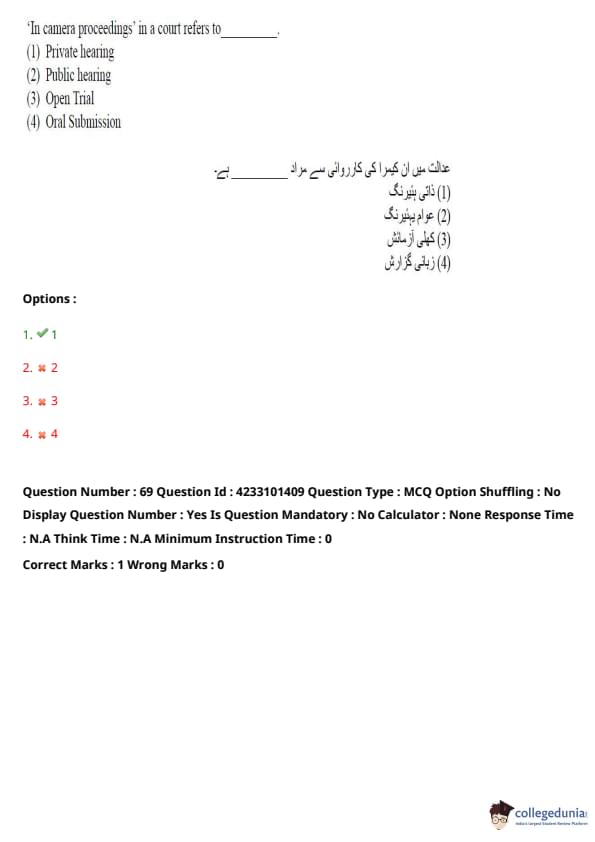
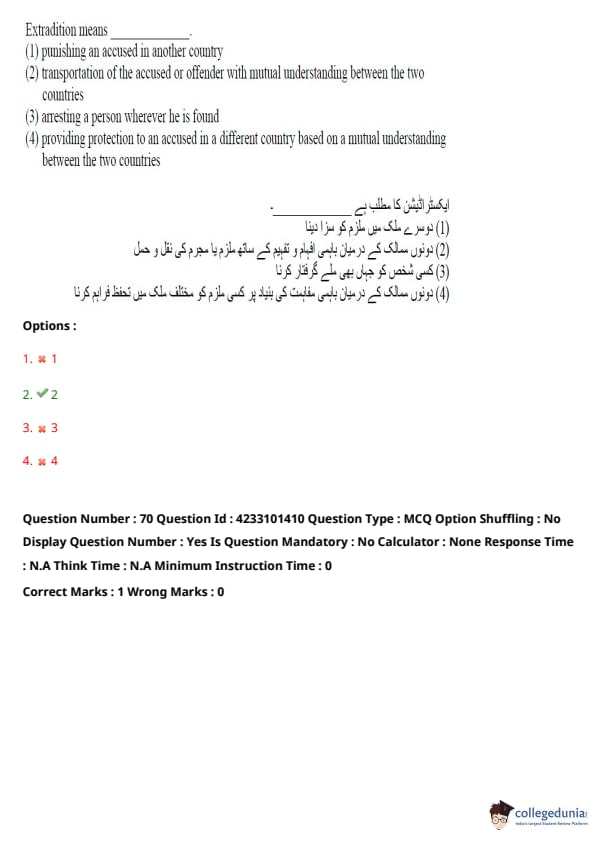
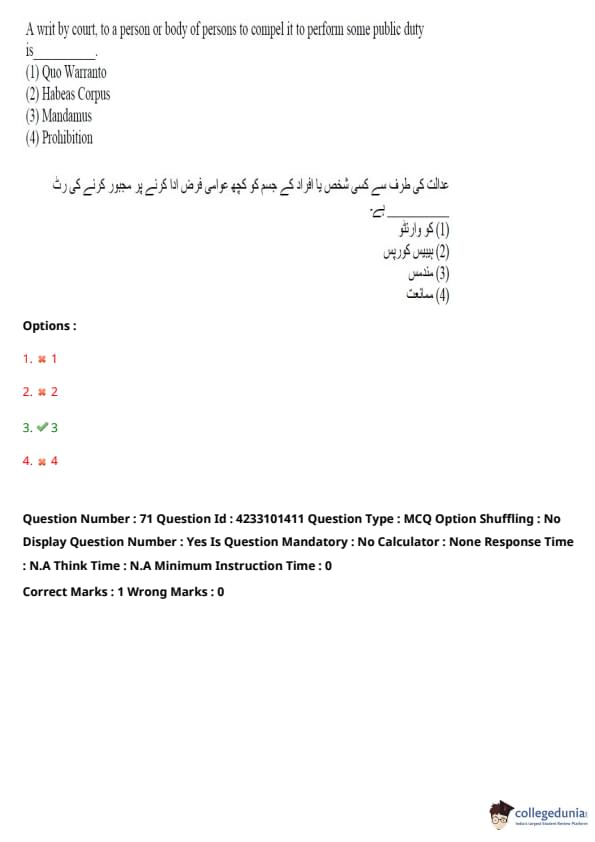
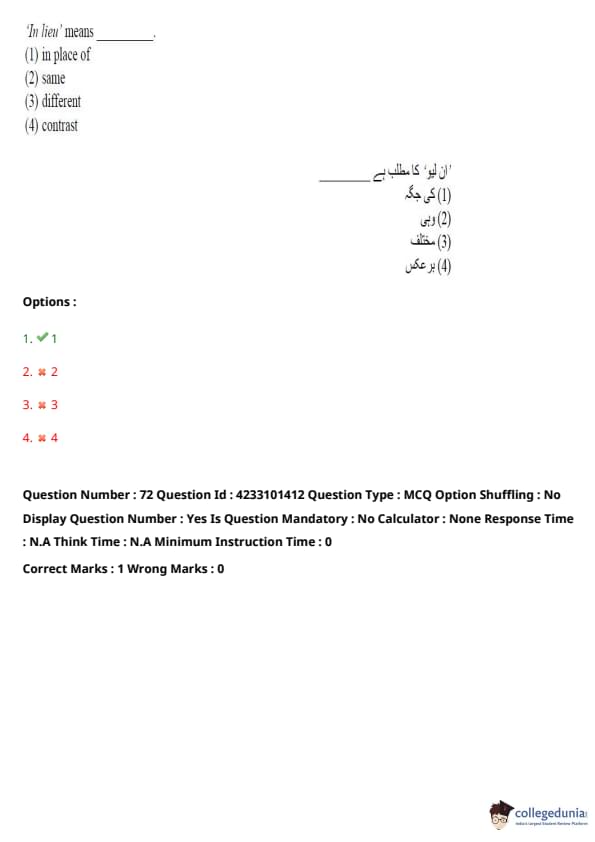
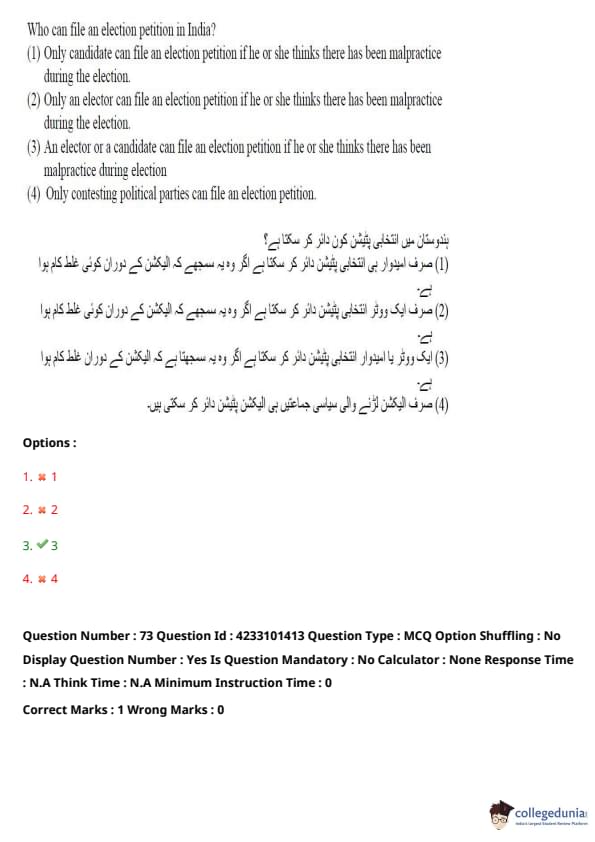
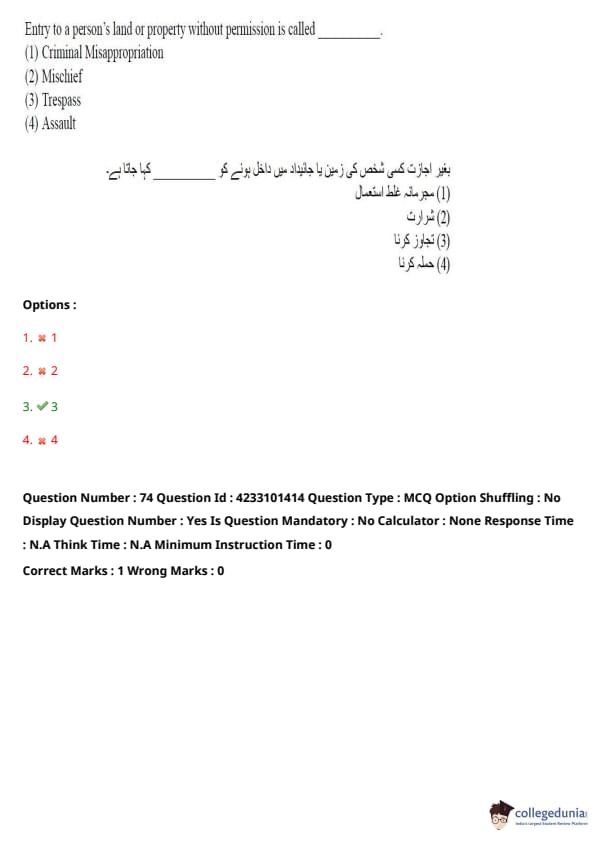
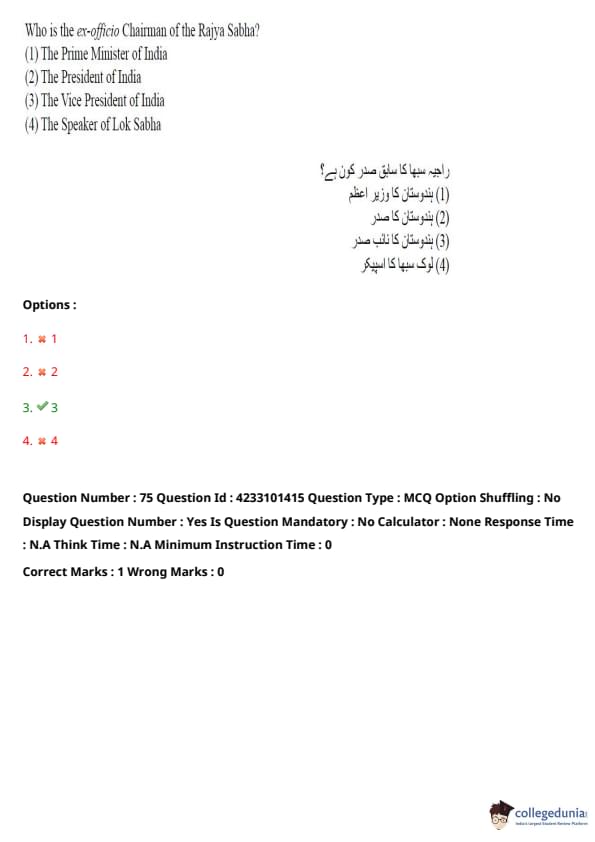
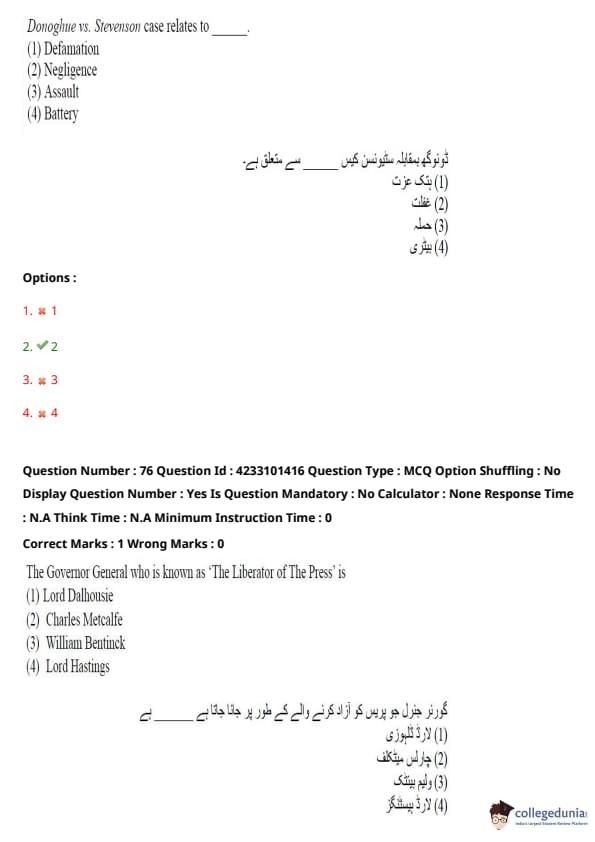
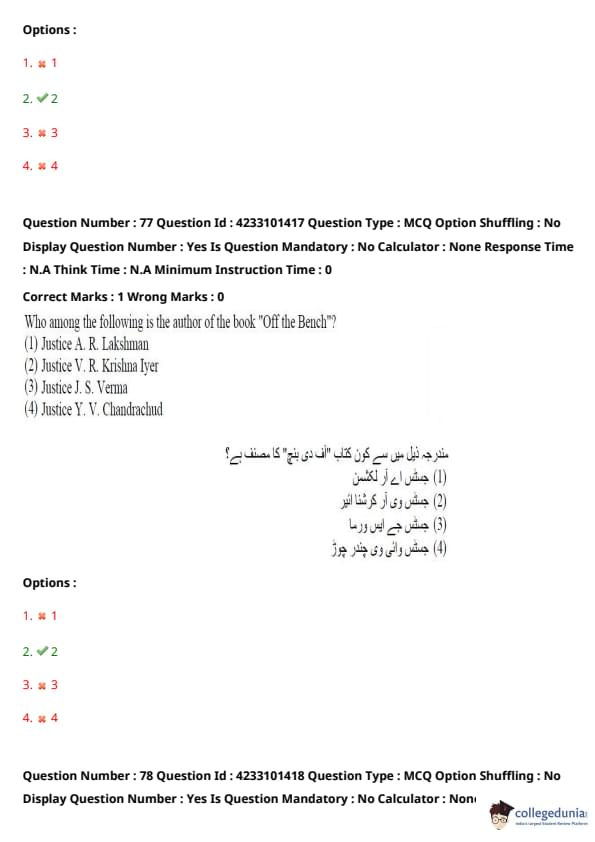
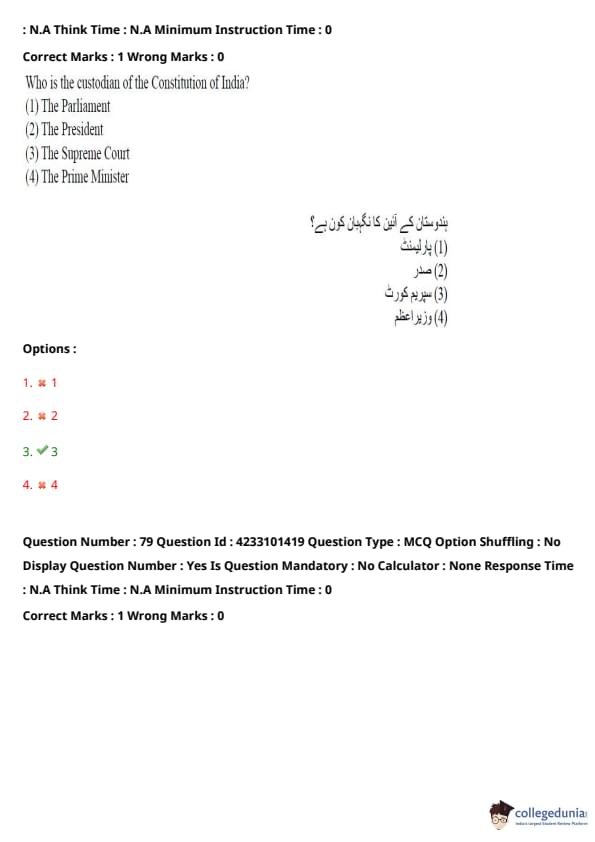
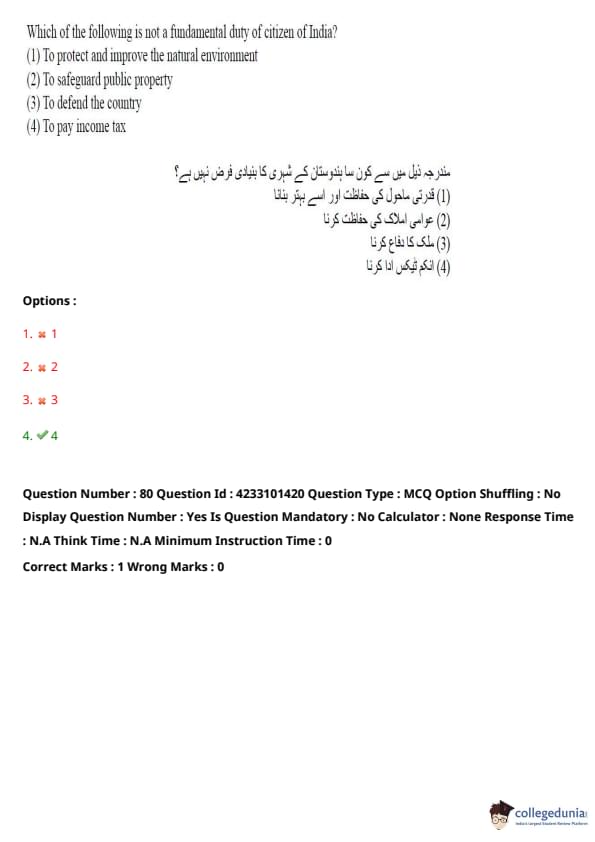
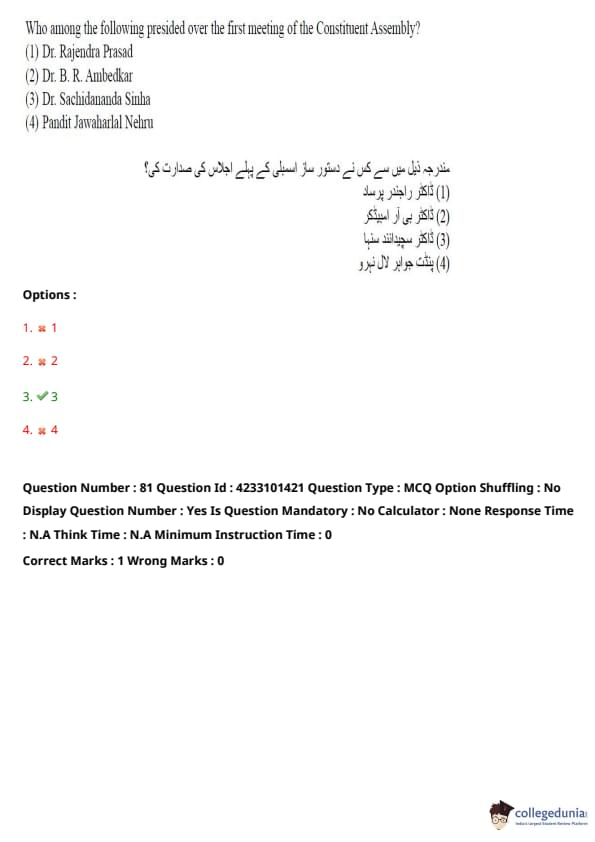
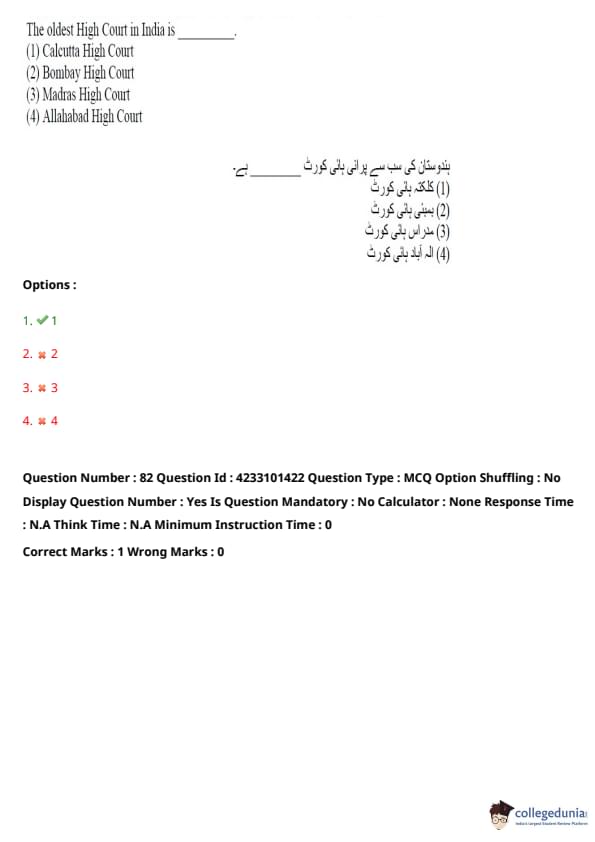
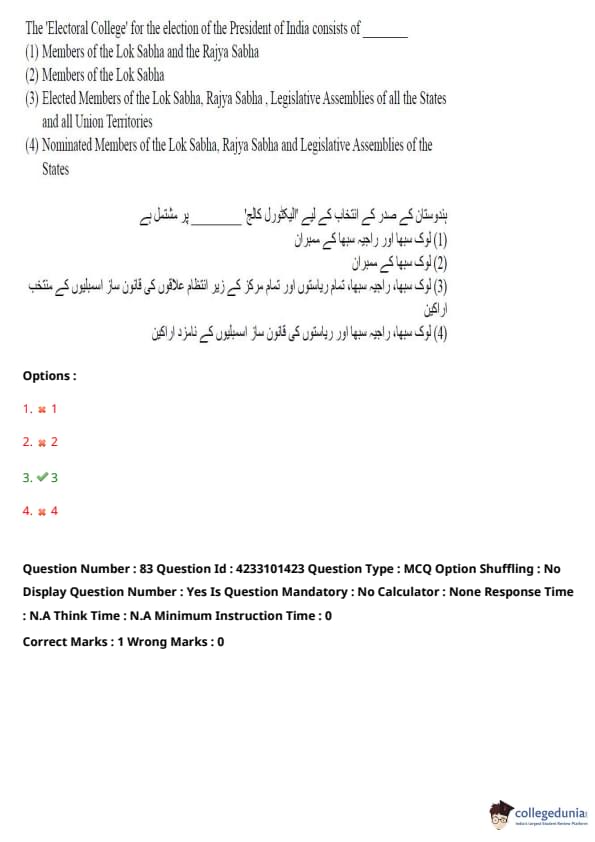
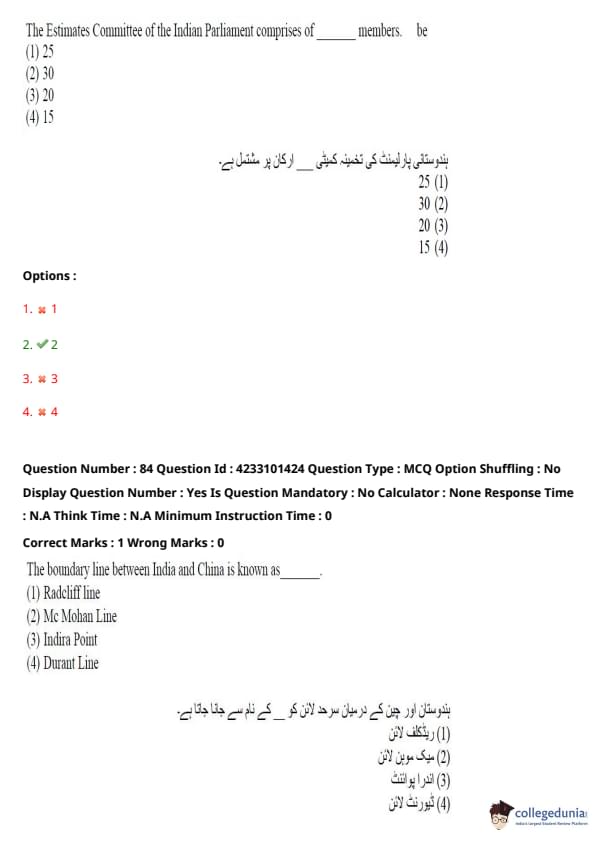
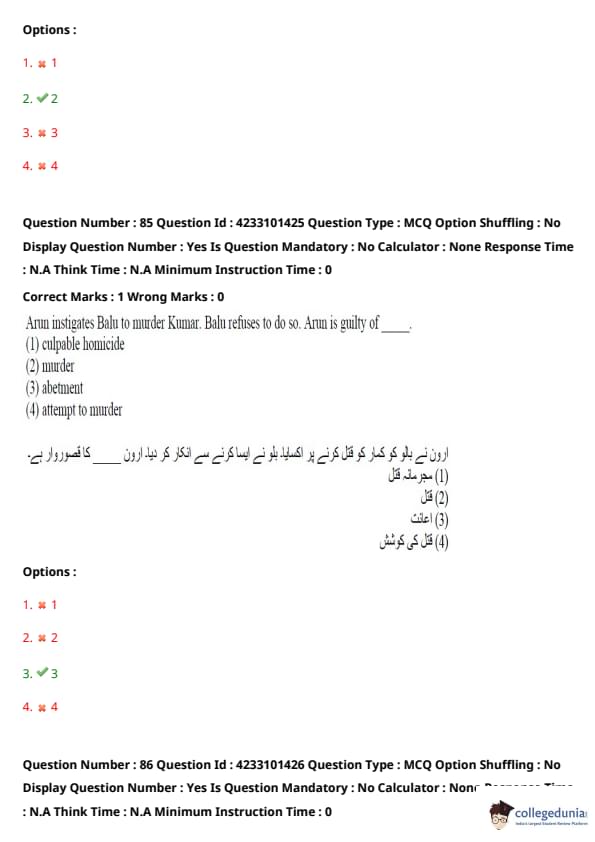
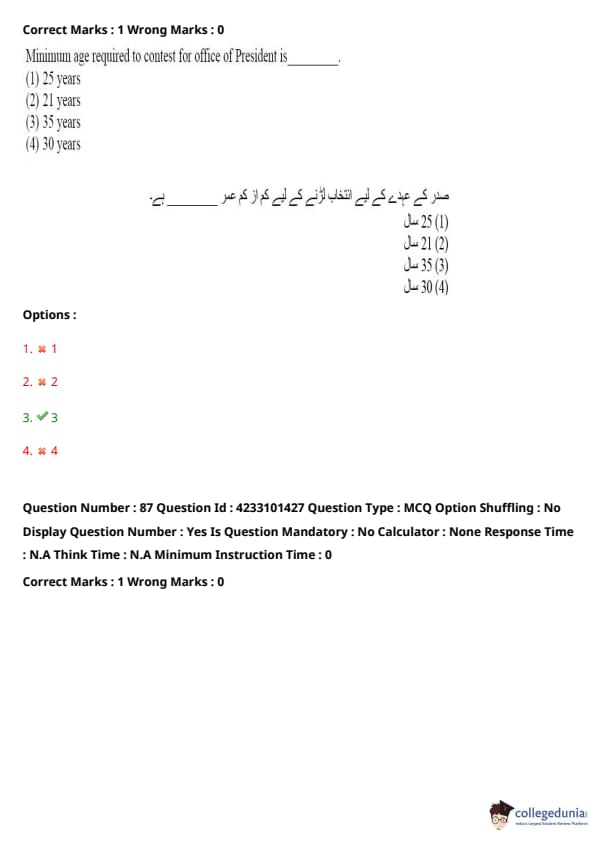
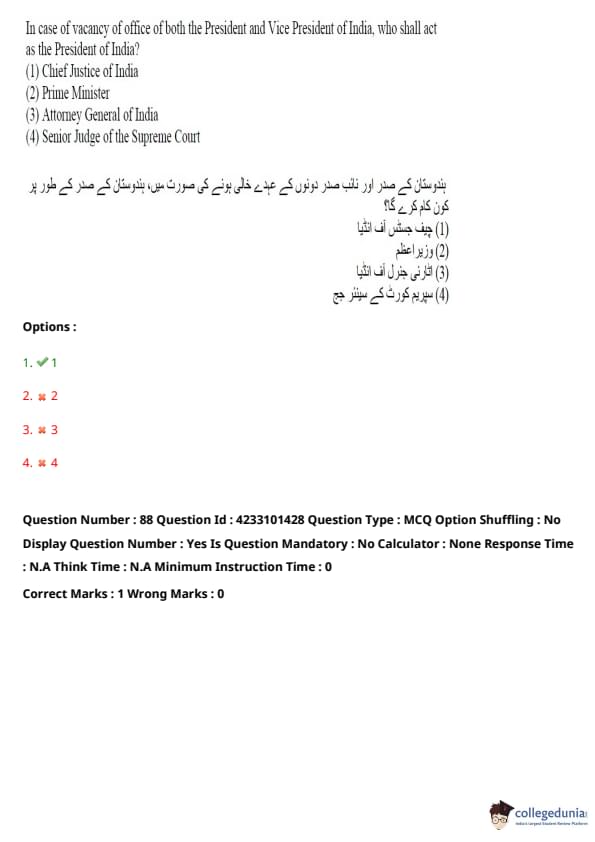
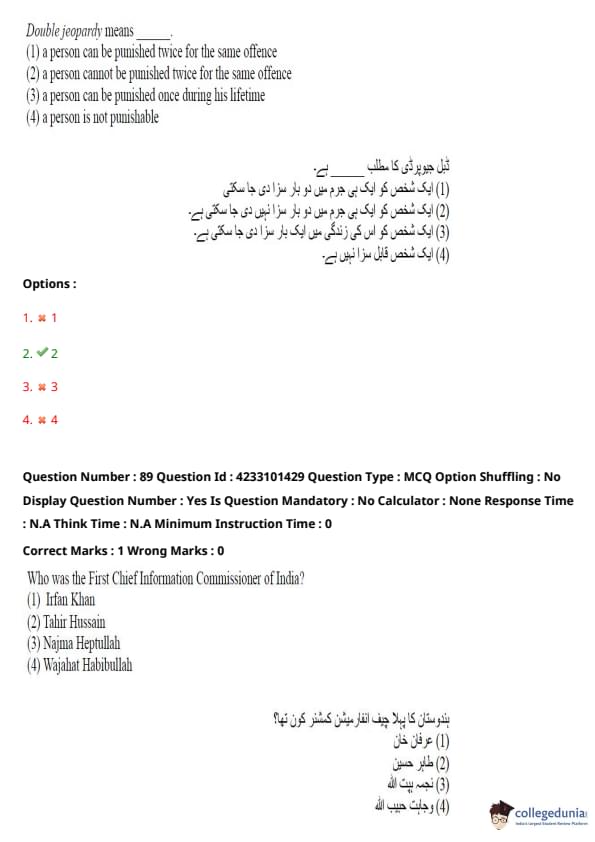
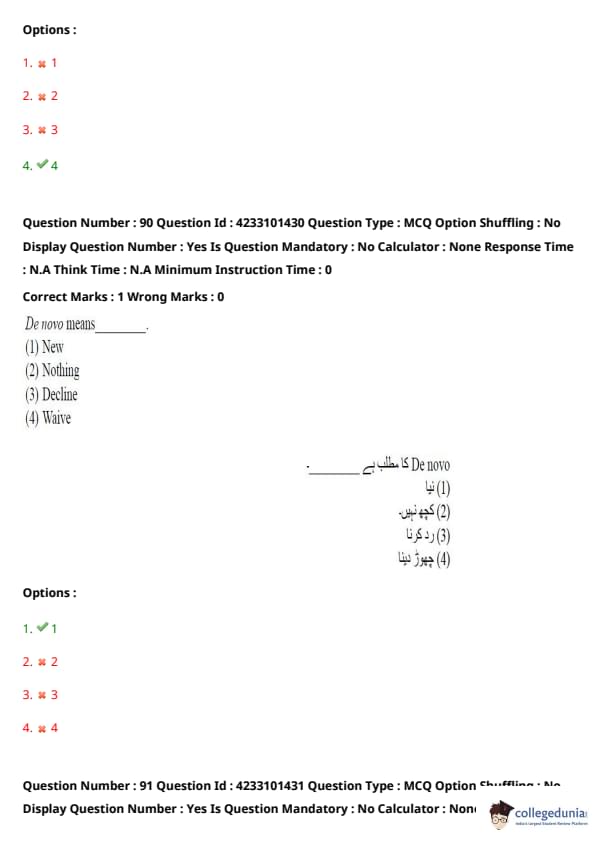
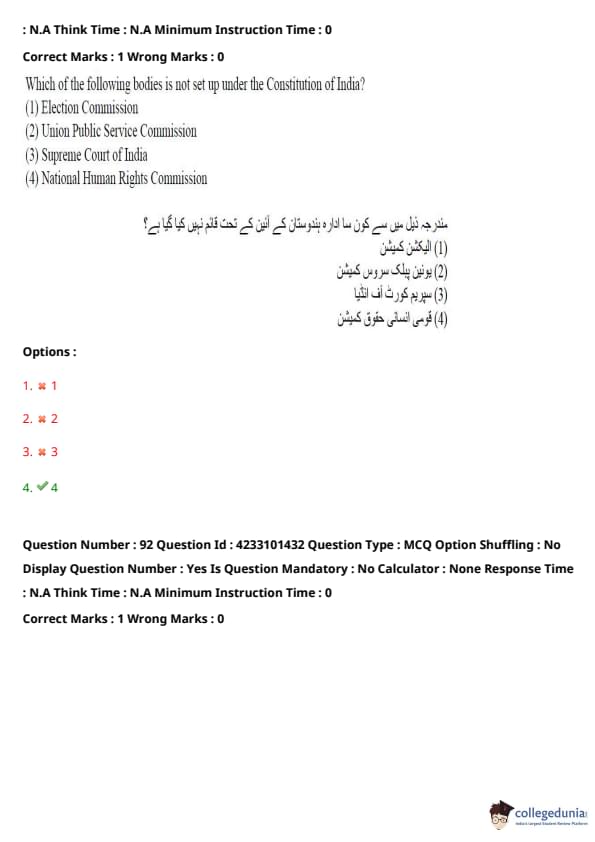
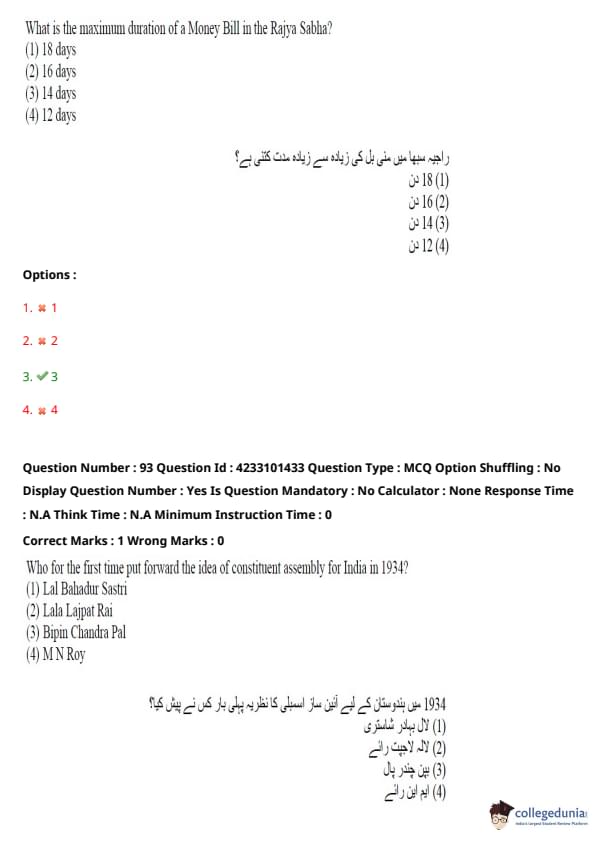
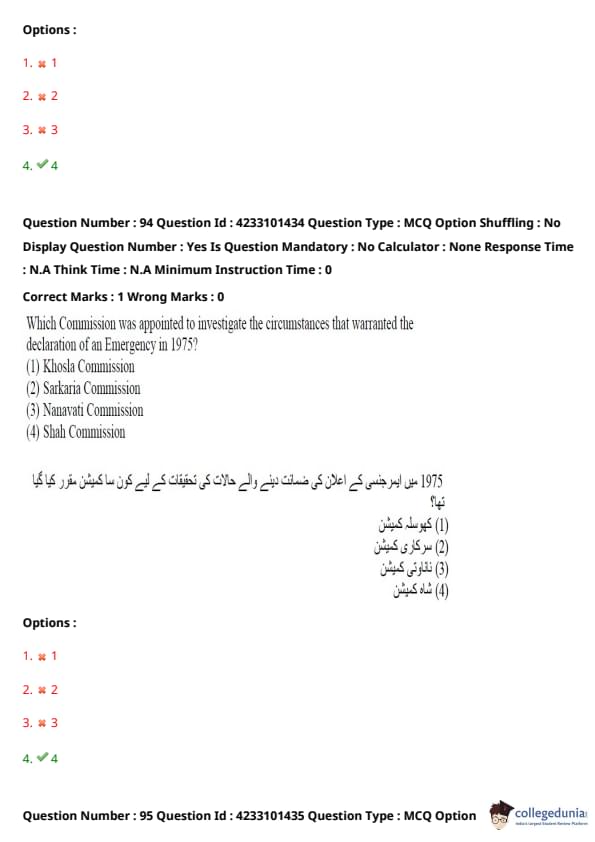
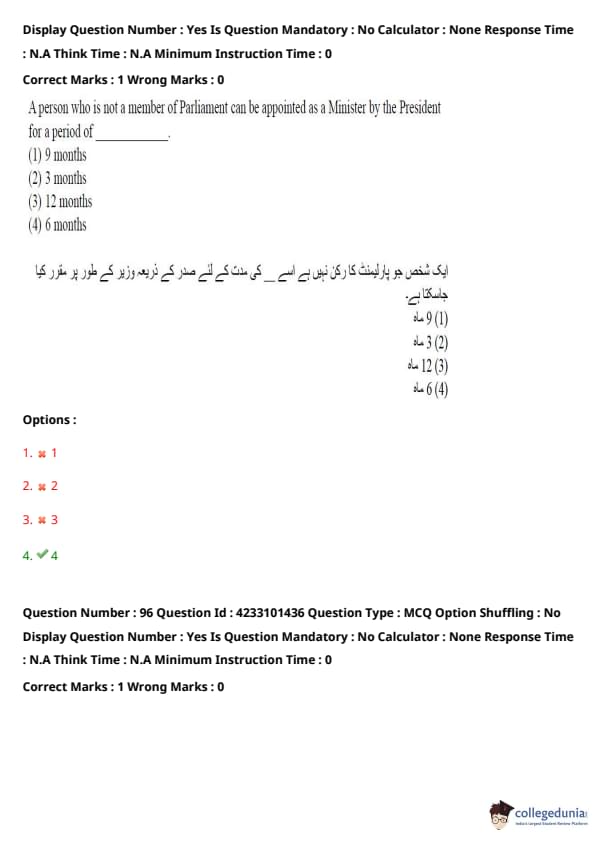
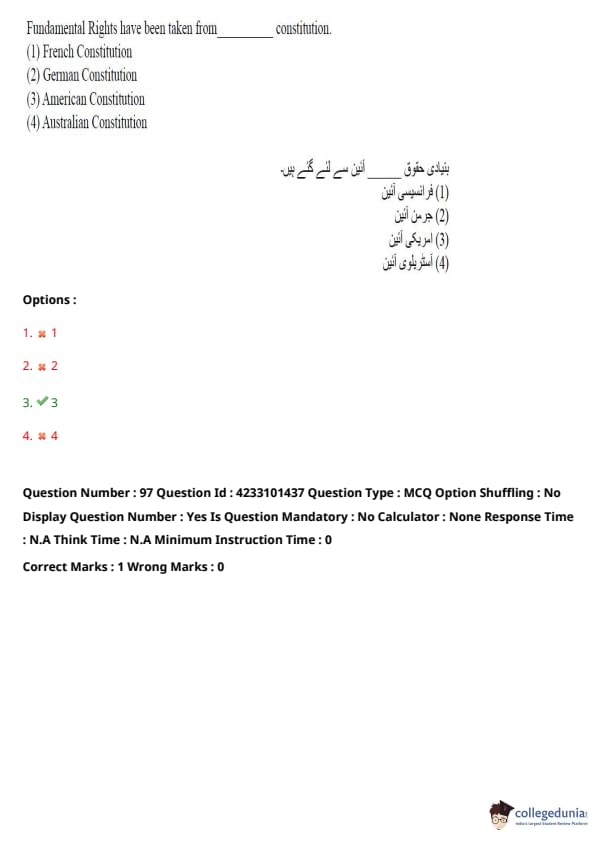
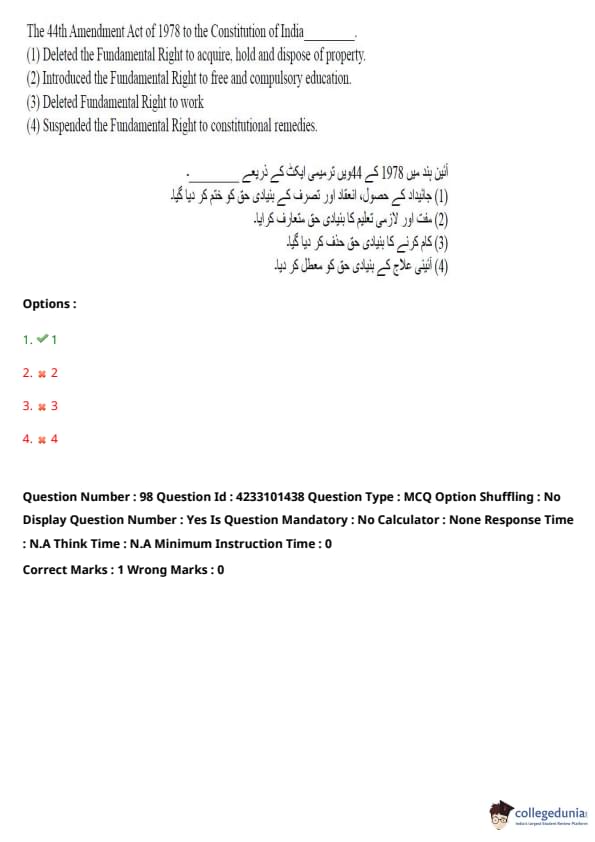
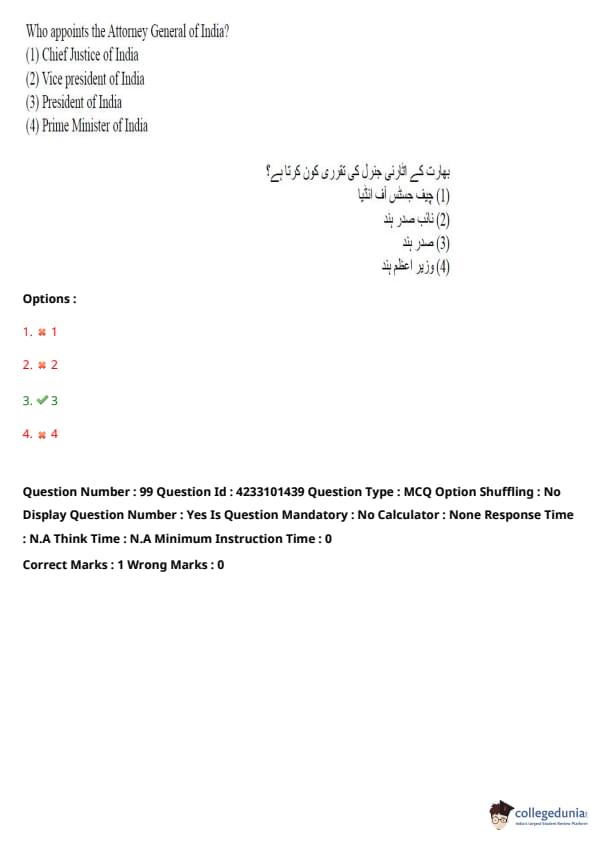

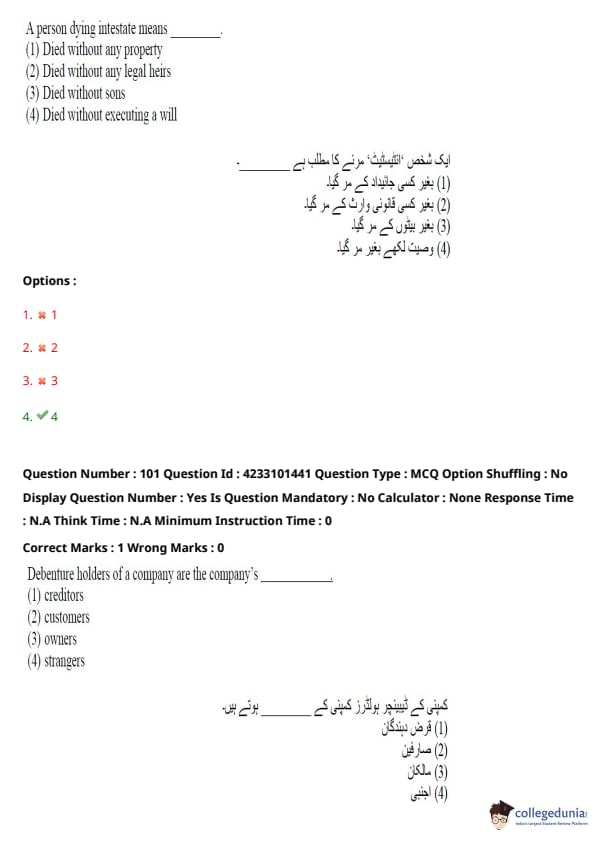
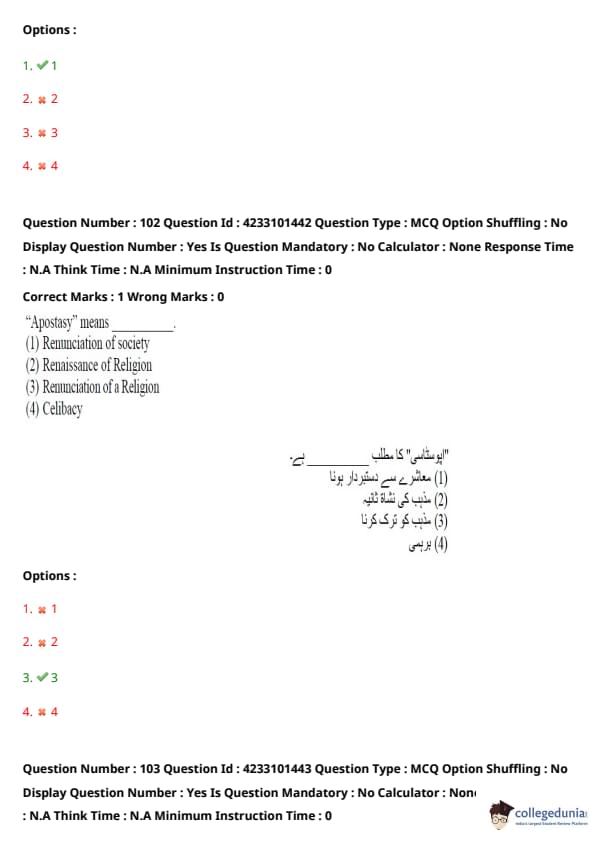
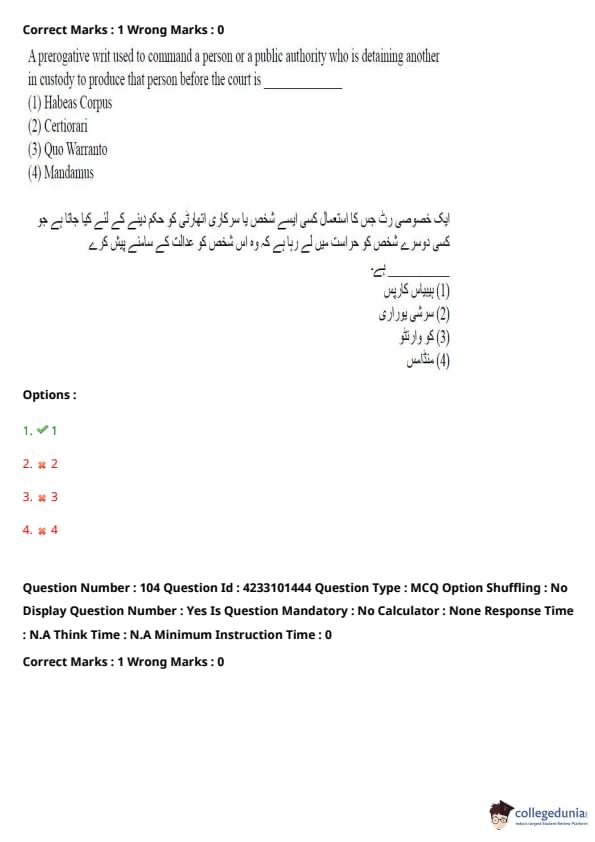
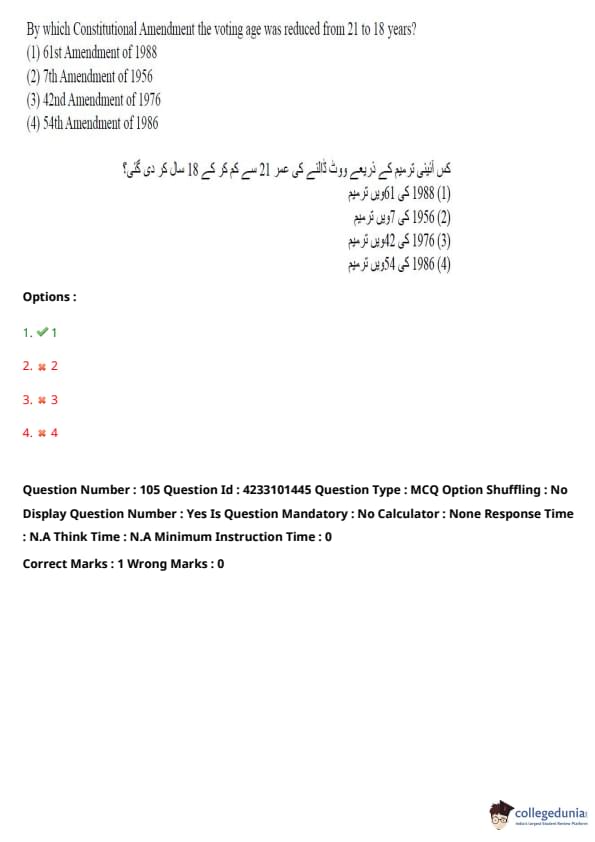
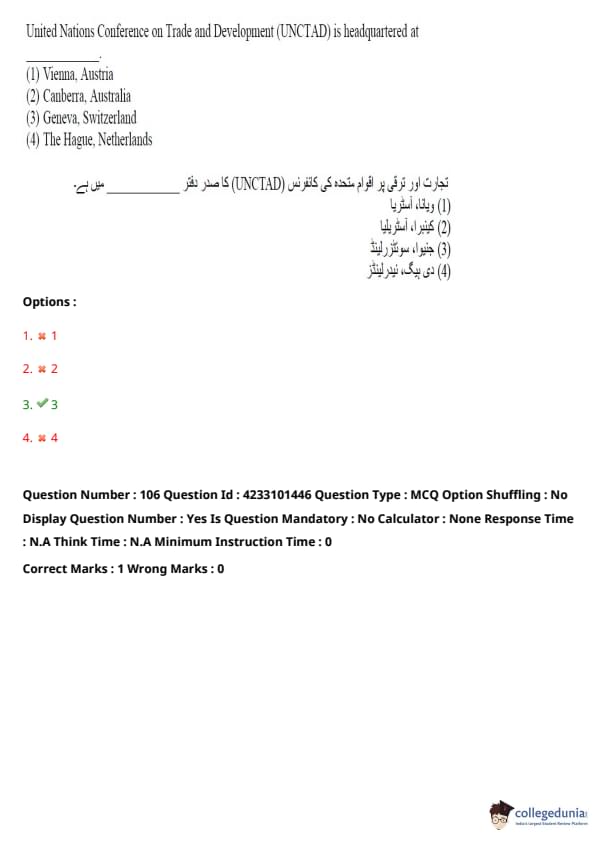
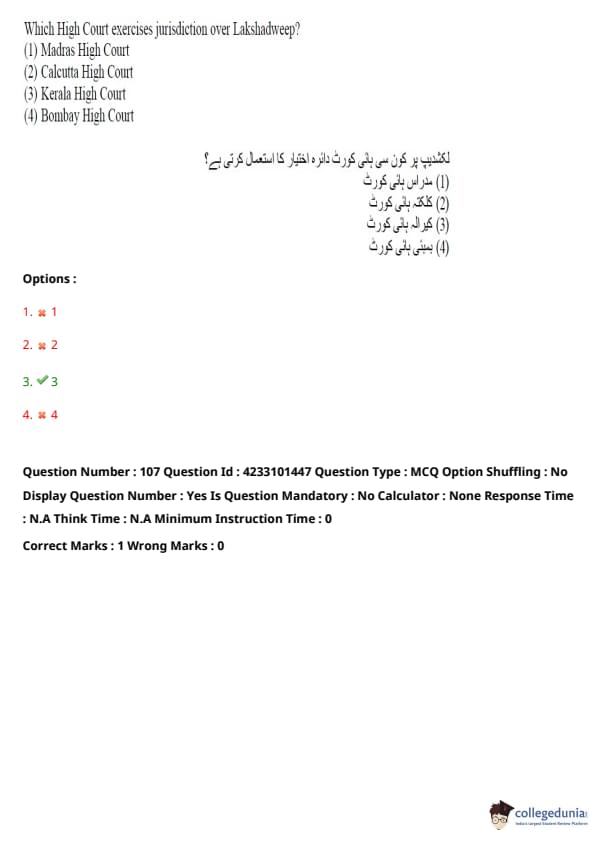
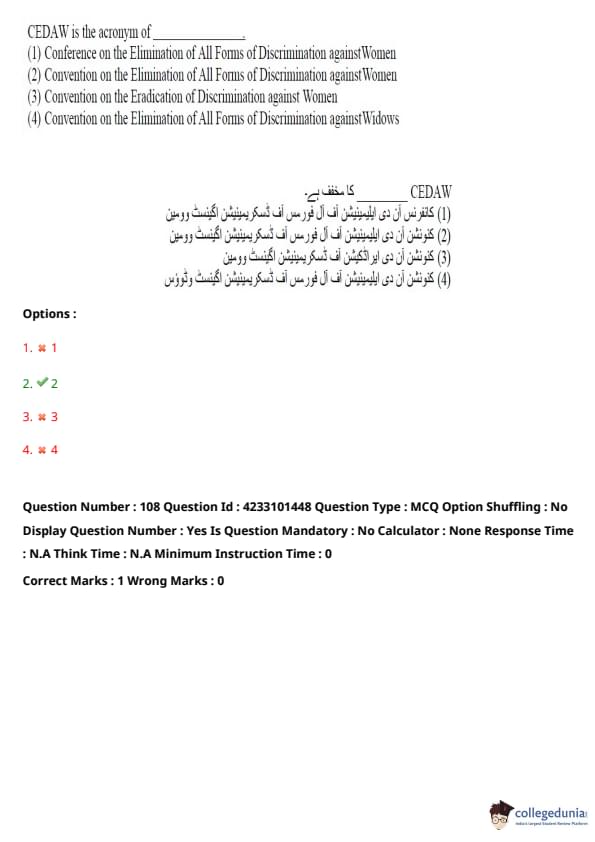
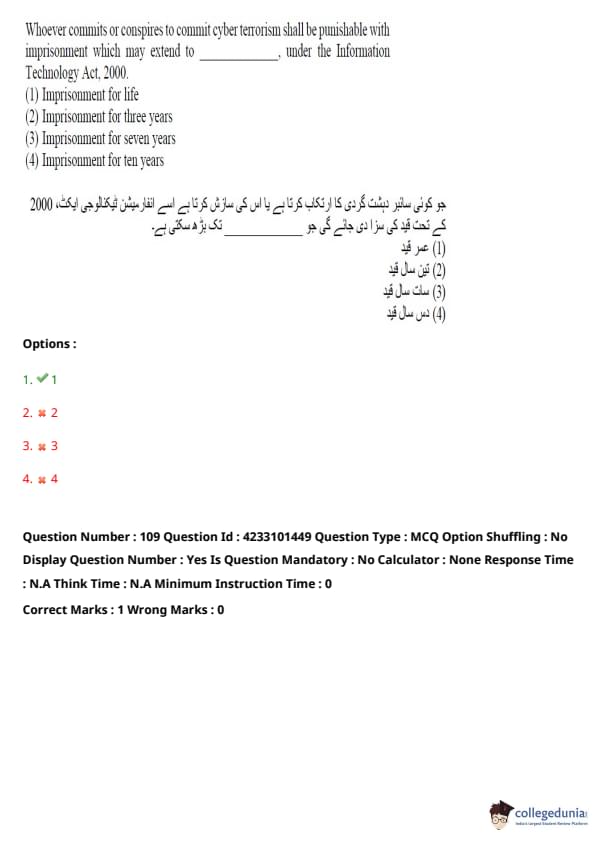
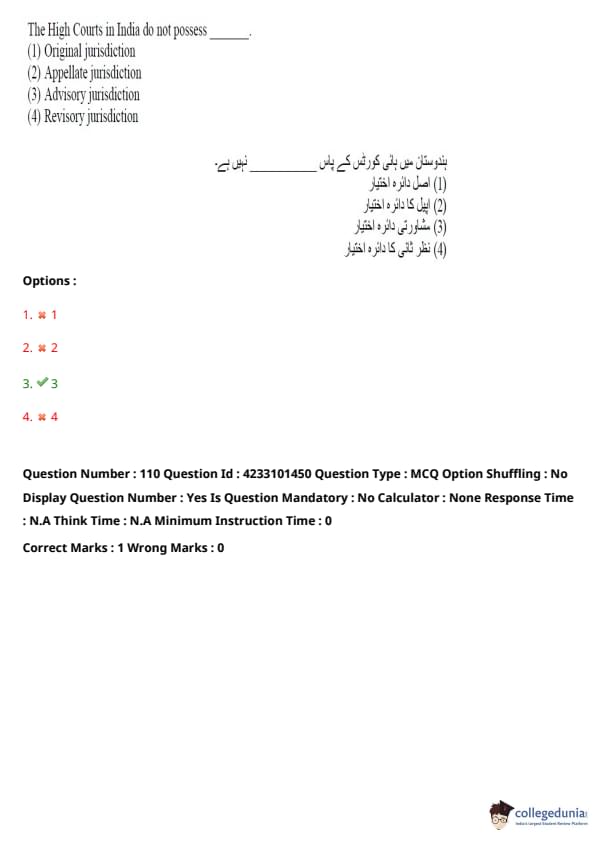
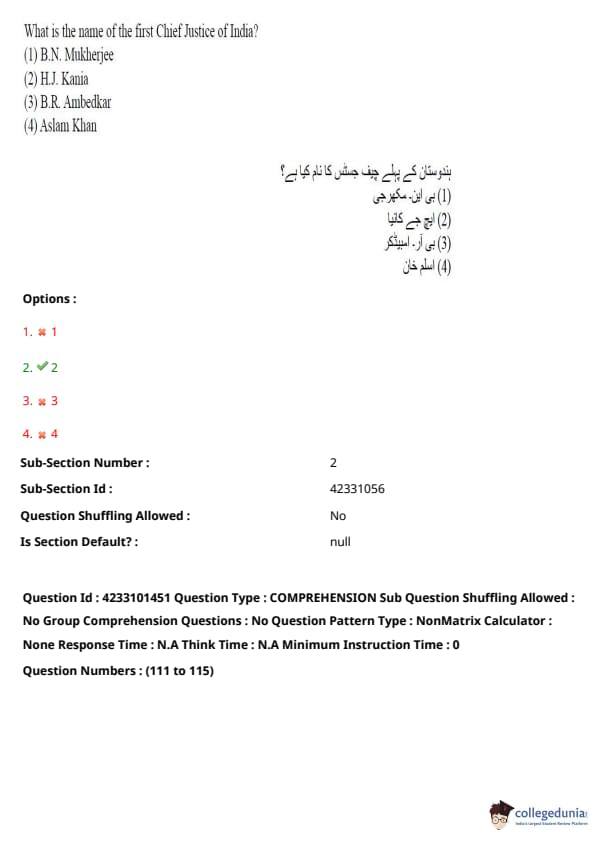
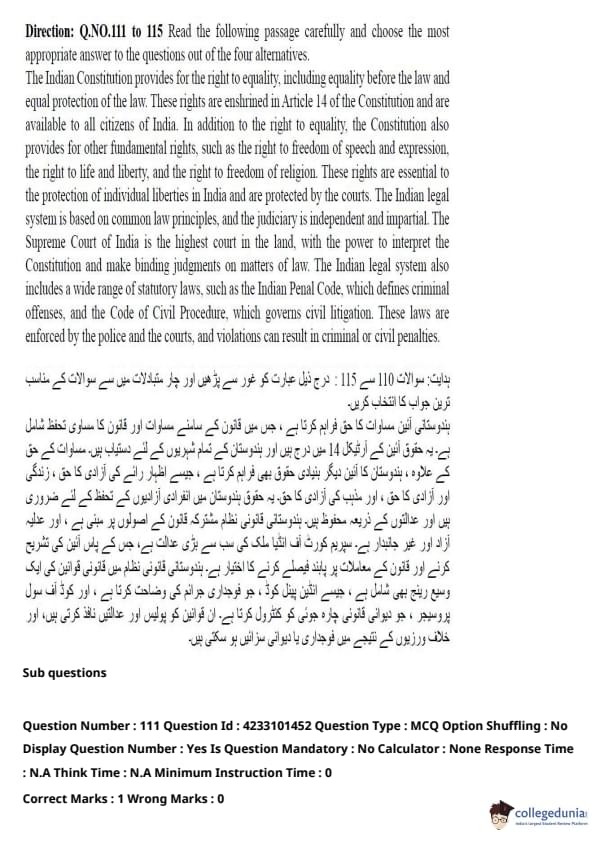
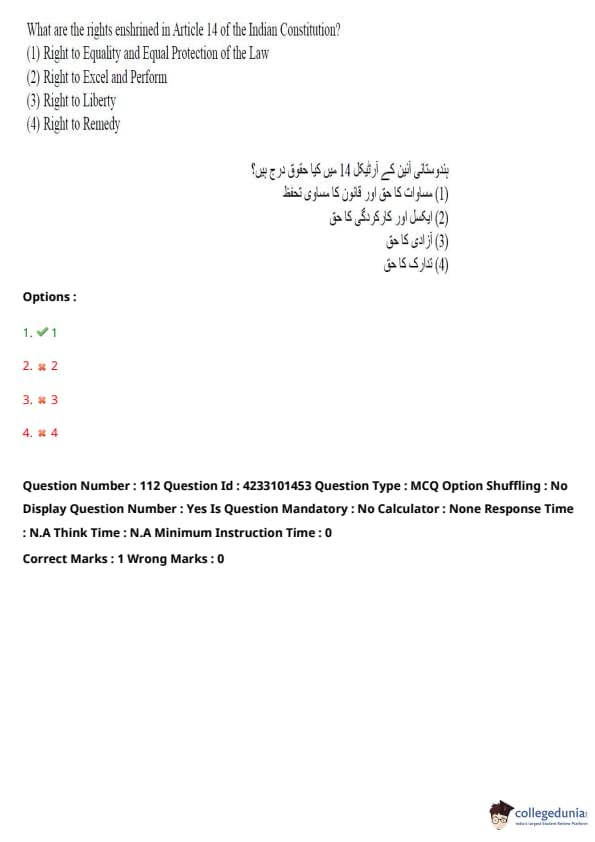
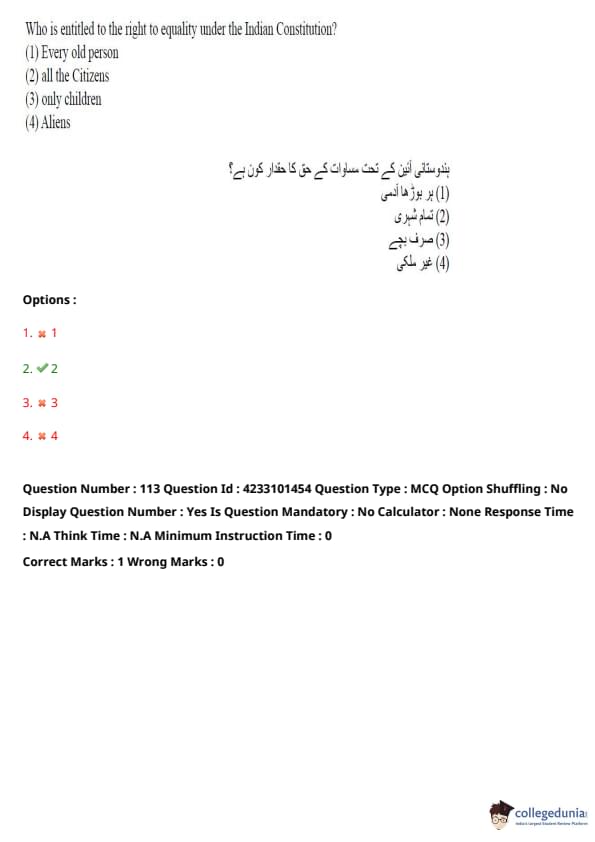

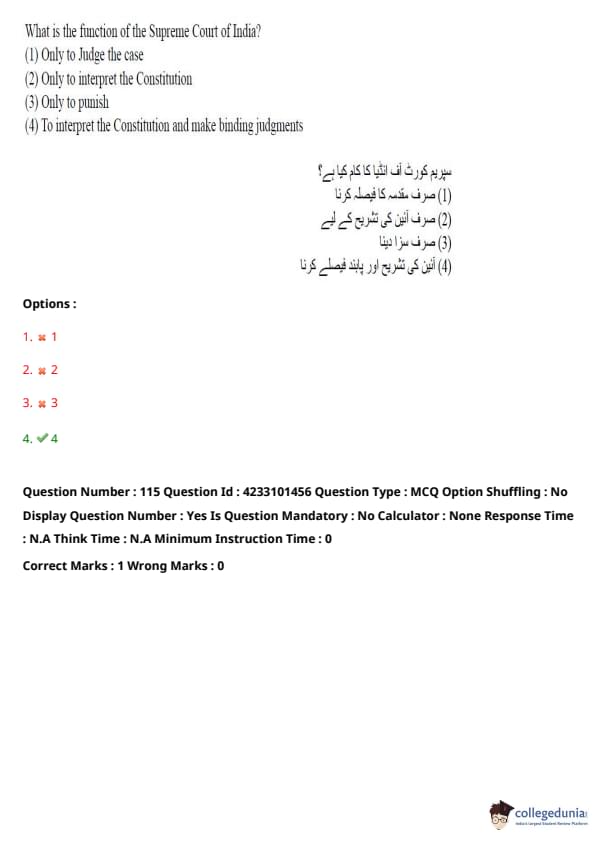
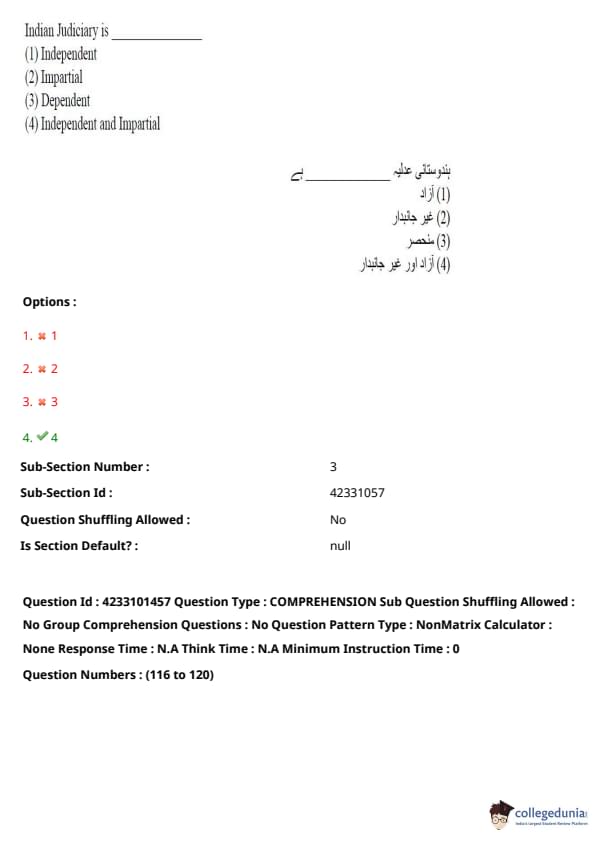
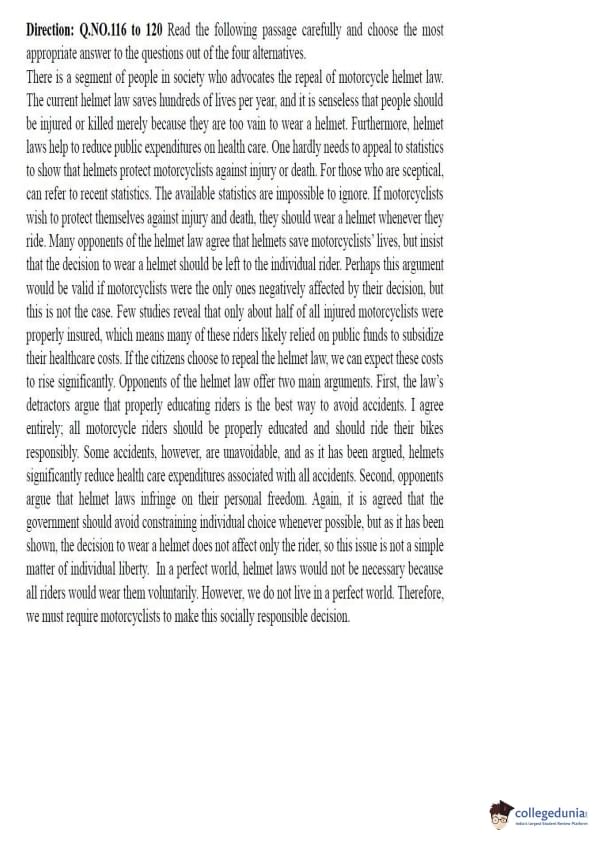
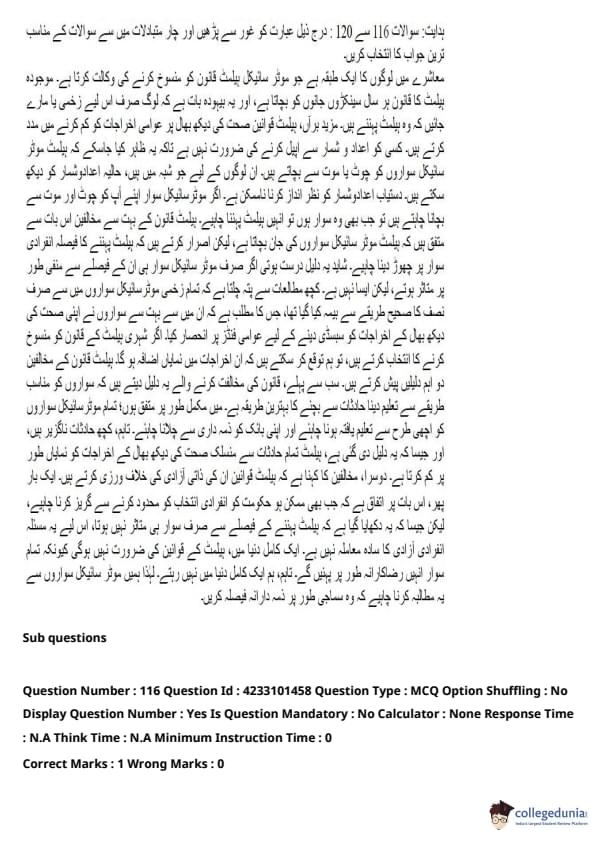
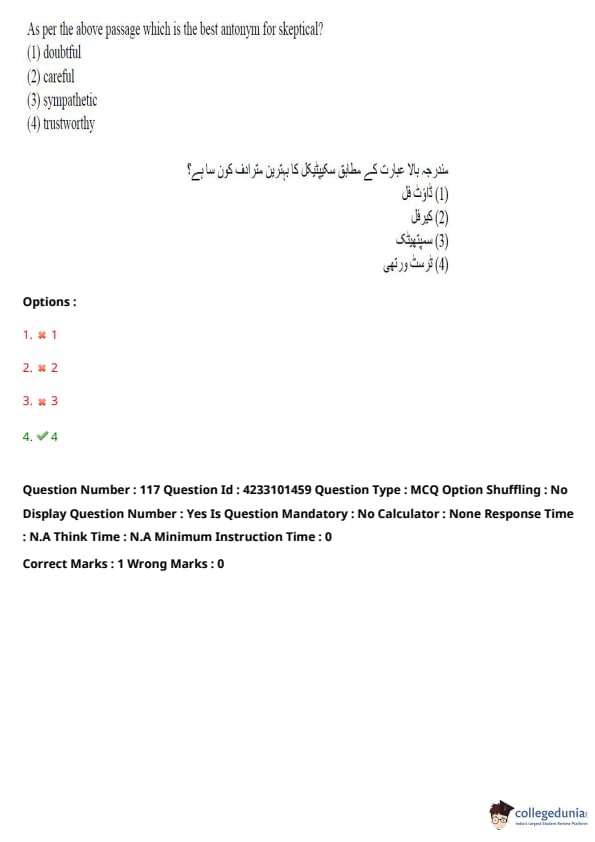
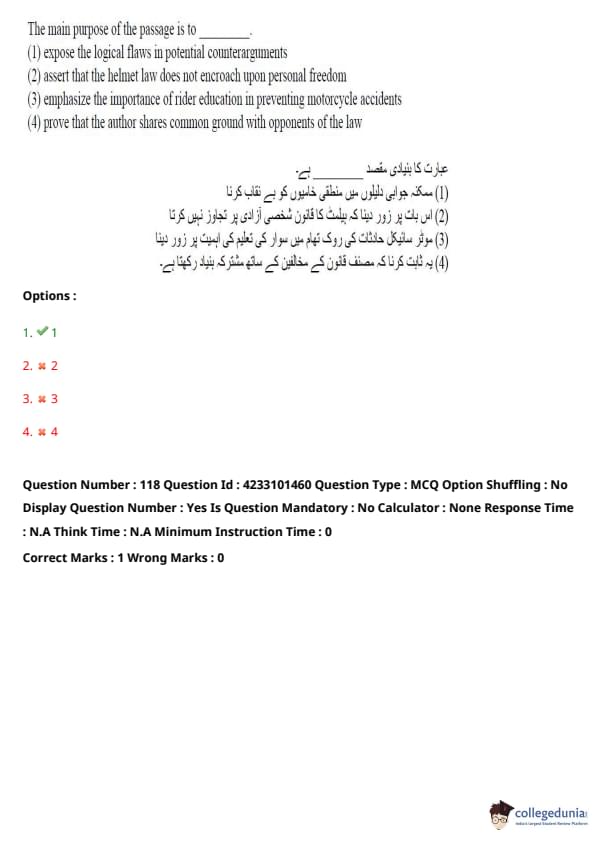
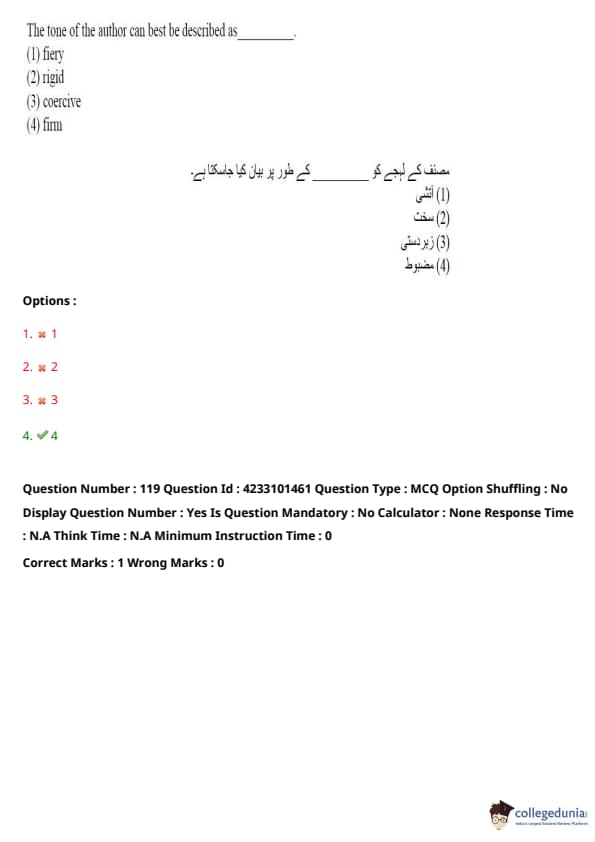
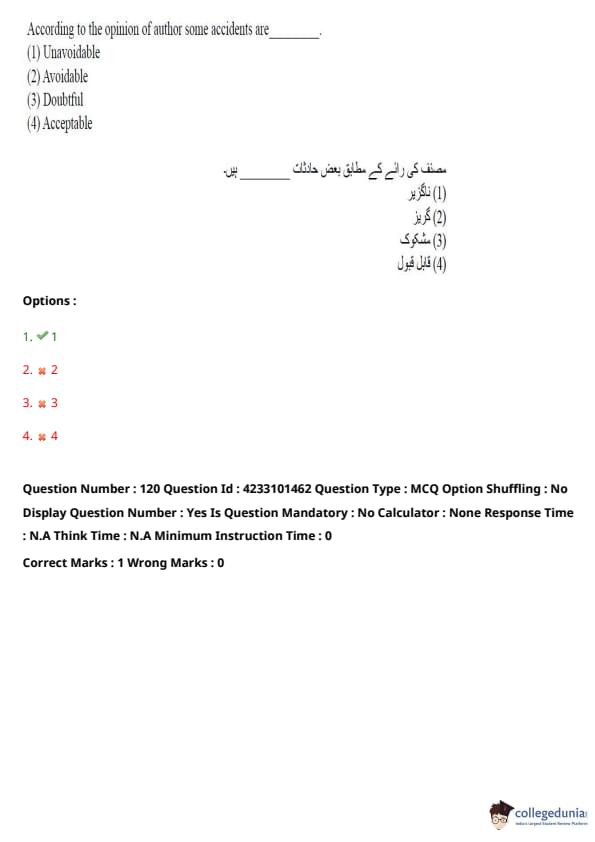
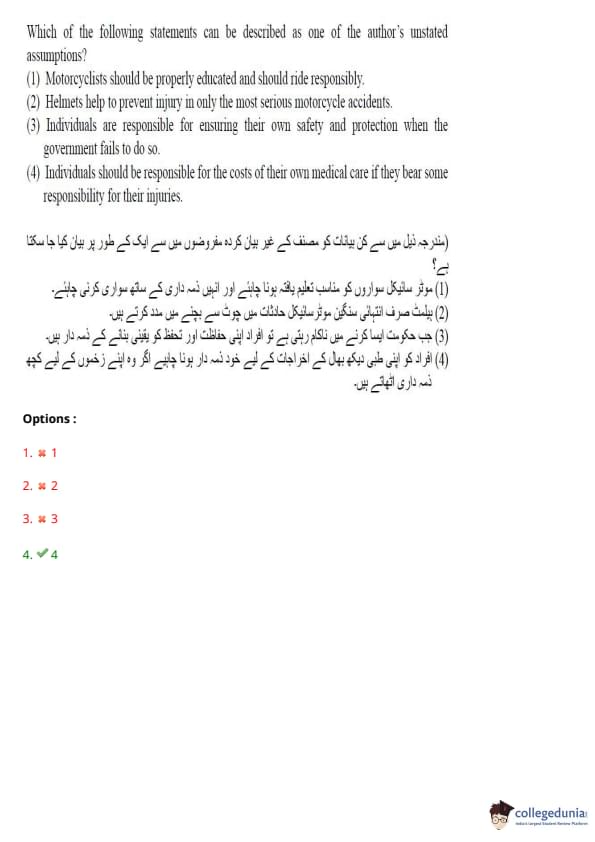




Comments